Prologue
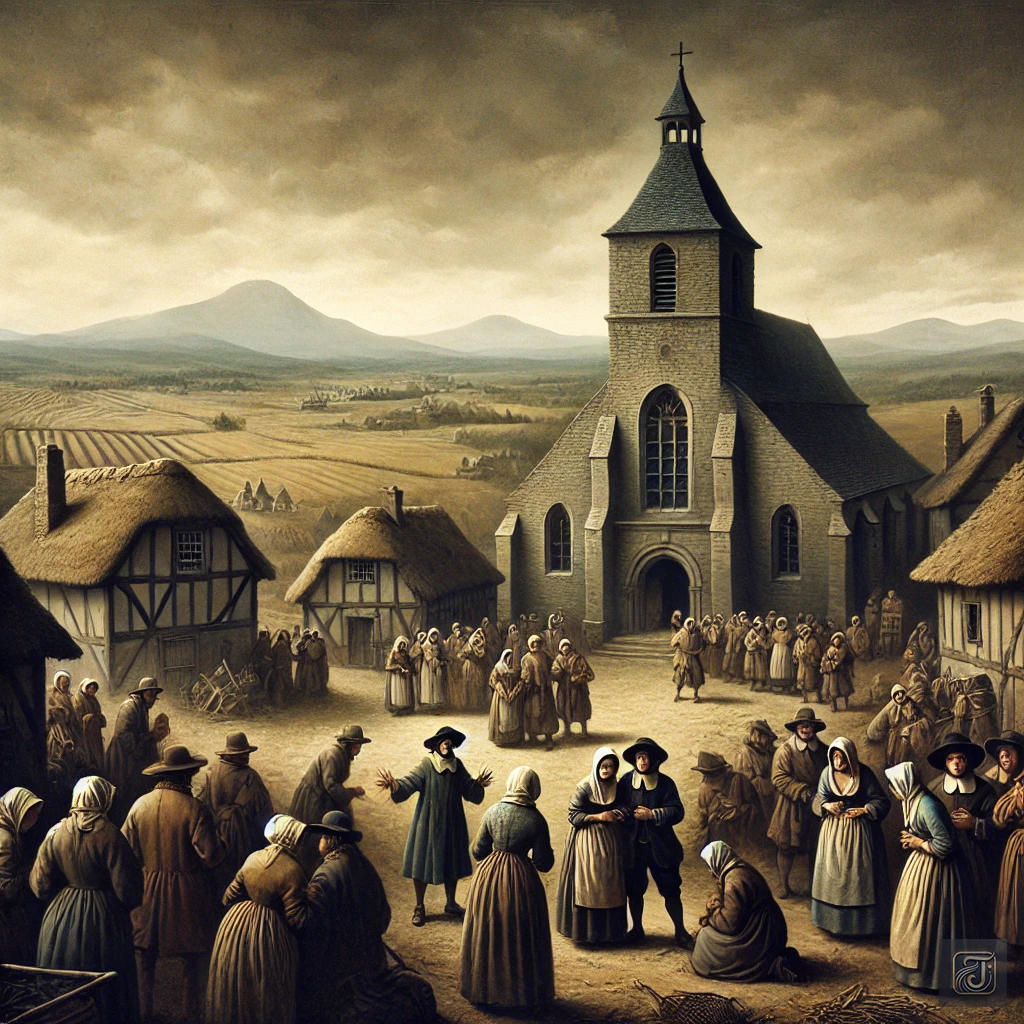
In the 17th century, in the Vivarais region of southern France.
War, plague, and famine pushed people to the brink, shrouding villages in anxiety and fear.
To alleviate their anxiety and fear, people’s anger turned toward “witches,” leading to witch trials being conducted across regions.
The purpose of the witch trials was:
To attribute the cause of disasters to witches and gain a sense of relief by eliminating them.
To demonstrate governance capabilities, strengthen authority, and gain the trust of the people.
In other words, witch hunts served as a “scapegoat” for blame-shifting.
and were exploited for that purpose.
Some opportunistic authorities and courts, emboldened by this, exploited witch hunts as a means to confiscate property for their own gain.
As a result, many innocent women became victims.
This is the story of such a tragic chapter in history.
Chapter 1: The Beginning of the Witch Hunts
The bells of a small village church rang out as the bishop stood at the pulpit.
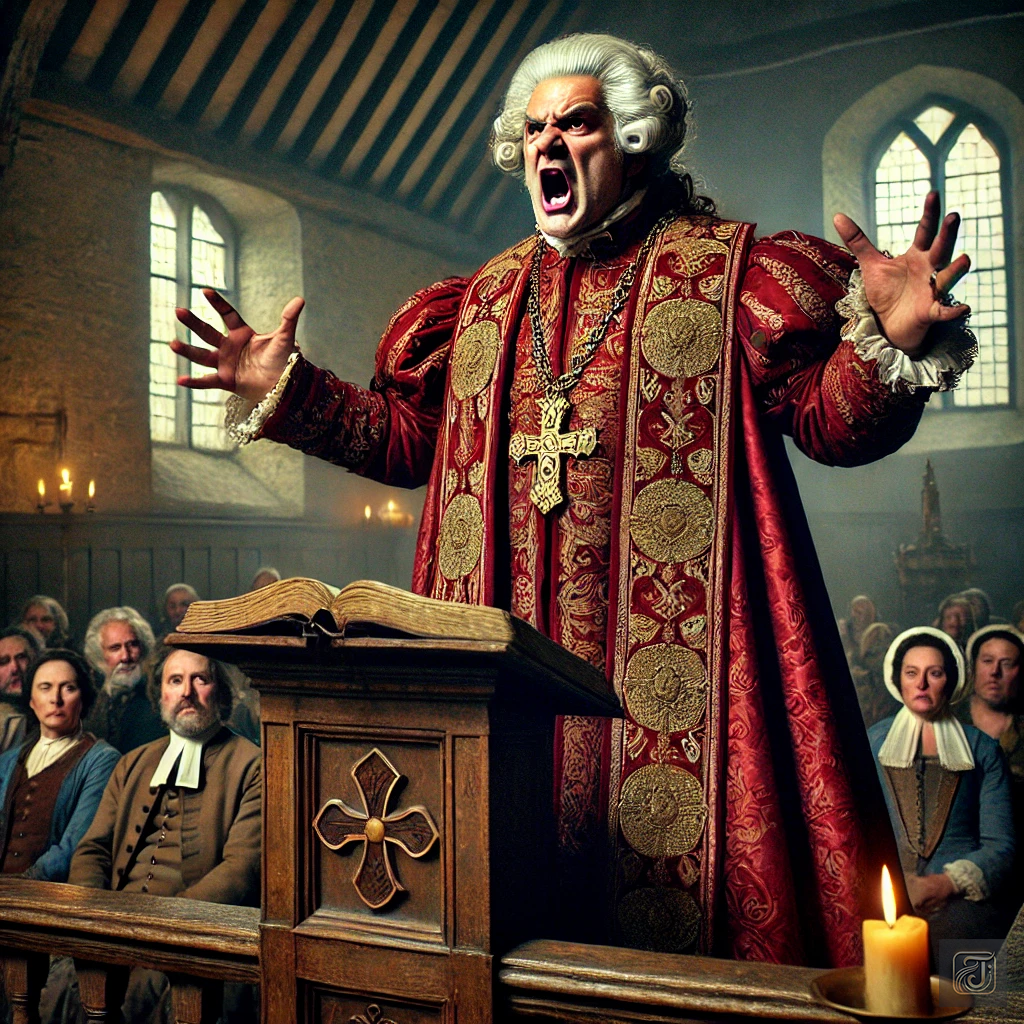
Bishop:
“The calamities that have befallen us are the result of witches’ blasphemy against God!”
“There is a witch hiding in this village.”
“Witches have made pacts with the devil and are bringing calamities upon us.”
“To end this calamity, we must find the witch, condemn her, and appease God’s wrath!”
The villagers exchanged uneasy glances and nodded anxiously.
And soon, suspicious eyes began to turn toward those around them.
Chapter 2: Isabeau Cheyné

A small herbalist’s cottage stood on the outskirts of the village.
Living here, Isabeau Cheyné.

She used the herbal knowledge passed down from her mother to make a living as a healer.
Her medicines and treatments were a source of reliance for the villagers, but her extensive knowledge often led to whispers of her being a “witch.”
Whispers of “witch” or “heretic” were not uncommon somewhere in the village.
Her extensive knowledge, particularly her use of foreign plants and treatments unfamiliar to the villagers, instilled fear and distrust in some.
Isabeau herself was aware of such wary gazes.
Even so, her mother’s teachings were deeply etched in Isabeau’s heart.

Mother:
“Even if you are feared, save others.”
“That is the mission of a healer.”
Though she felt a distance from the villagers, she relied on her knowledge and conviction to continue dedicating herself to their well-being.
Chapter 3: Seeds of Suspicion
One day, Pierre, a farmer suffering from a foot ailment, came to visit Isabeau.

Pierre:
“Isabeau, please help me.”
“This pain in my foot is so severe that I can’t work in the fields.”
Isabeau Cheyné:
“Don’t worry.”
“This can be healed with herbs.”
“It might take some time, though.”
Isabeau carefully treated him, and within a few days, Pierre’s foot had healed remarkably.
However, his “miraculous recovery” sparked strange rumors among the villagers.
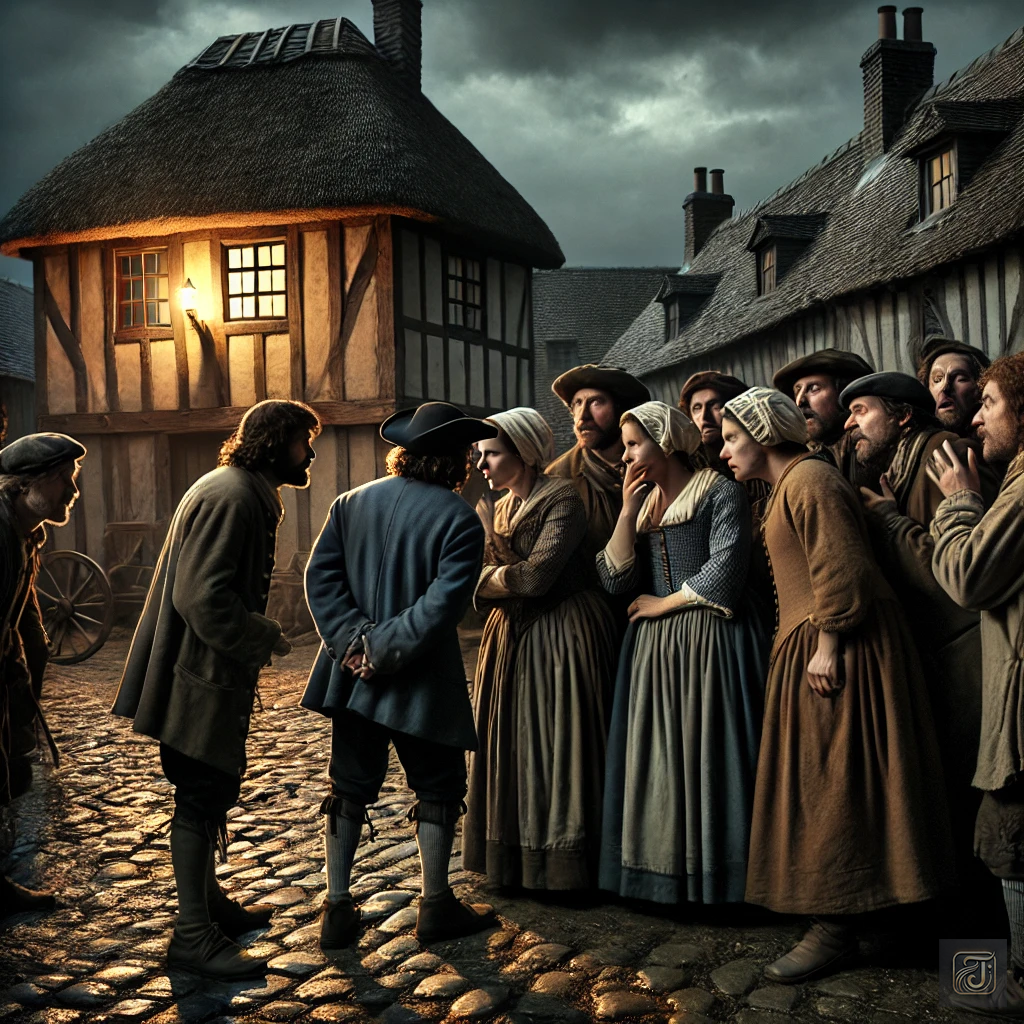
Villager 1:
“Healing that quickly isn’t normal.”
“Could it be… the power of the devil?”
Villager 2:
“I heard that Isabeau’s house often has lights on late into the night.”
“Could she be up to something suspicious?”
The villagers gradually began to harbor distrust toward Isabeau.
Chapter 4: Adèle, the First Victim Condemned by Jealousy

A hardworking widow
A vast field stretched across the edge of the village.
There, Adèle could be seen working tirelessly.
She wore a gentle smile, yet her hands never ceased their work.
To protect the land her late husband had left her, she never allowed herself a day of rest, earning the respect of the villagers.
One day, her neighbor Jacques called out to Adèle.

Jacques:
“Adèle, working alone again?”
“Why not ask someone to help you?”
Adèle:
“It’s all right, Jacques.”
“This land was left to me by my husband, so I want to take care of it myself.”
Those words carried deep love and unwavering resolve.
However, deep in Jacques’ heart, jealousy swirled over the land and the success she had attained.
The Seed of Suspicion
Not long after, one of Jacques’ livestock suddenly died.
The unexplained incident filled the villagers with unease.

Villager 1:
“Could Jacques’ livestock have died because of a curse?”
“There have been too many strange things happening lately.”
Villager 2:
“Now that you mention it, I saw Adèle near that cow doing something.”
“What was she up to?”
Fear began to take root in the villagers’ hearts, and suspicion spread rapidly.
In the shadows, Jacques plotted to use these rumors to seize her land.
The Accusation and Trial
The trial at the village church was shrouded in a heavy atmosphere.
Amidst the flickering candlelight, Adèle stood in the center, surrounded by murmuring villagers whose voices were filled with suspicion directed at her.
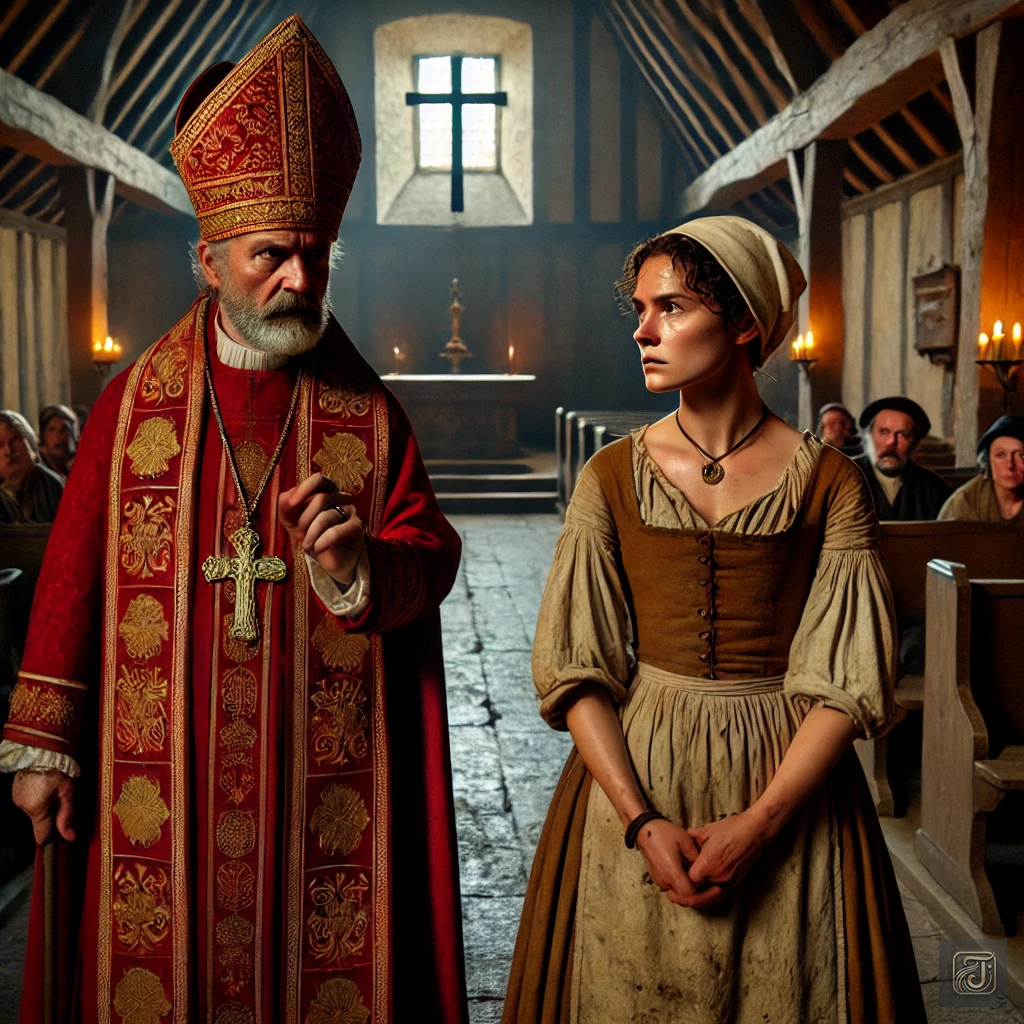
Bishop:
“Adèle, there are rumors that you are responsible for the death of Jacques’ livestock.”
“Answer for yourself.”
Adèle:
“Bishop, I am innocent!”
“I have done nothing wrong.”
“I was simply working in my field!”
Bishop:
“Adèle, the villagers are doubting you.”
“How do you explain that?”
Adèle:
“All I can do is speak the truth.”
“I have done nothing wrong.”
“I have worked tirelessly to protect the field my husband left me.”
“That is everything to me!”
The candlelight flickered as Adèle’s voice echoed softly through the church.
However, few believed her words.
Unable to prove her innocence, Adèle was taken to the church’s basement to endure torture.
Naturally, she pleaded her innocence repeatedly.
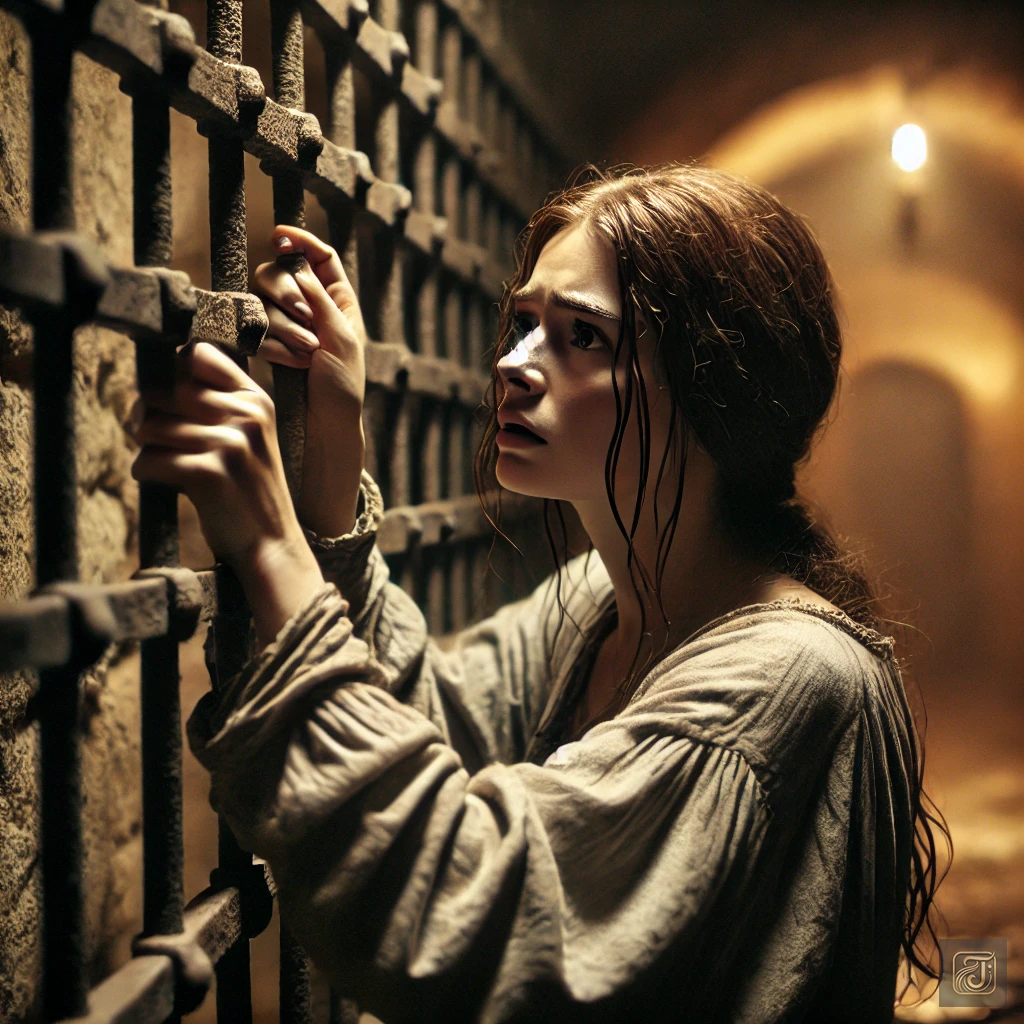
Adèle:
“I have done nothing wrong!”
“Why won’t you believe me?”
However, as the torture continued, Adèle could no longer endure it and was coerced into giving a false confession.
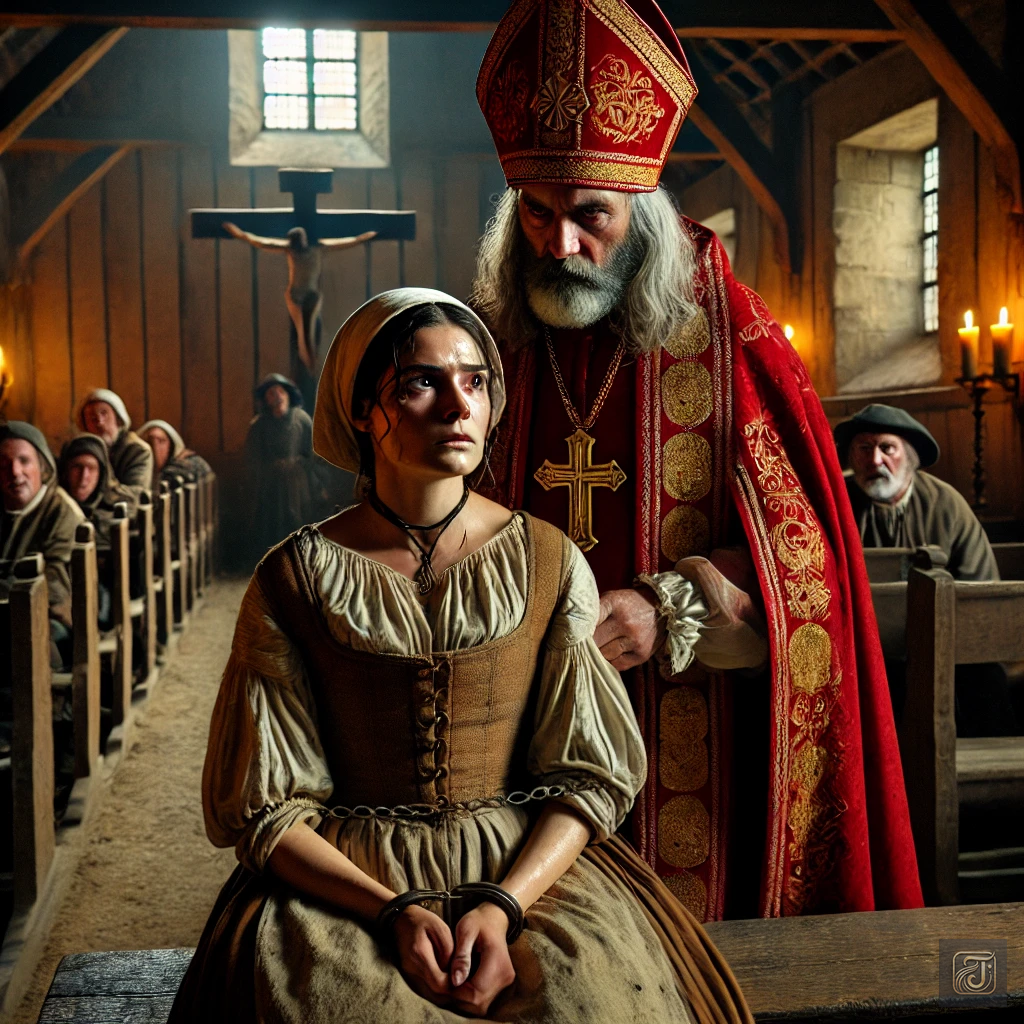
Adèle:
“The devil commanded me…”
“I could not defy him…”
This confession was not the truth but a false admission made to escape the torture.
However, those words did not protect her and instead brought forth even greater tragedy.
Her Final Words
In the overcast square, a stake had been erected, and Adèle stood bound but with unyielding dignity.
The crowd gazed at her with a mix of fear and regret etched on their faces.
Adèle raised her voice, addressing them directly.

Adèle:
“I only wanted to protect the land my husband left me!”
“That’s all!”
“But if that is considered a crime, then God is wrong!”
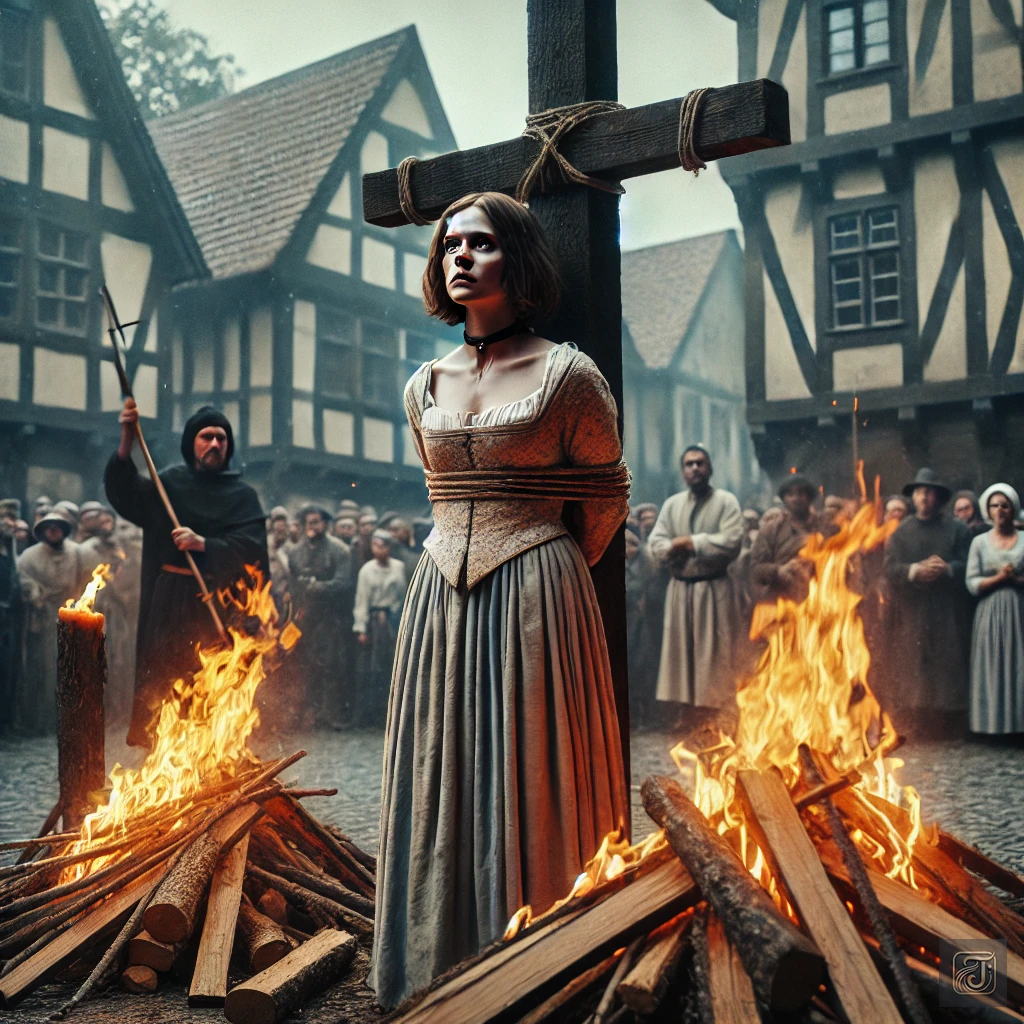
The flames roared to life, and Adèle’s voice was lost in the smoke.
Though some villagers shed tears, paralyzed by fear, no one stepped forward to save her.
Thus, Adèle became the first victim of the witch hunts.
From that day on, the atmosphere in the village shifted, and Adèle’s presence became indelibly etched into the village’s memory.
Chapter 5: The Unrelenting Calamity
Debate in the Church
Inside the church, a heavy and oppressive atmosphere reigned.
A large cross hung on the wall, while the flickering candlelight illuminated the sacred space.
The church had successfully identified and executed the “witch” Adèle, believed to be lurking in the village.
But Adèle was no witch—she was an innocent village girl falsely accused.
Naturally, her execution did nothing to halt the calamities plaguing the village.
The villagers and bishops who had executed Adèle gathered to continue their discussions.
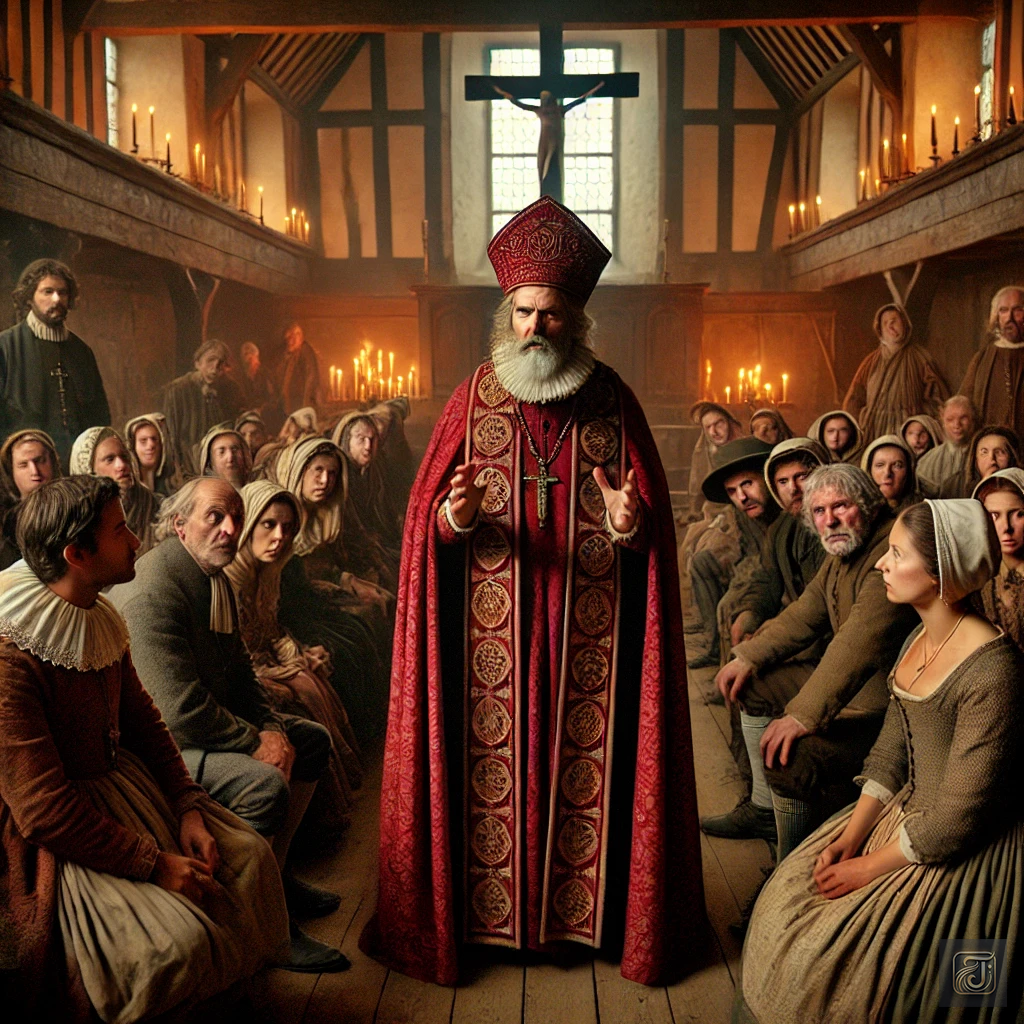
Villager:
“We executed Adèle, yet the calamities have not ceased!”
“Could it be that Adèle was not a witch after all…?”
Bishop:
“No! Adèle was not the only one!”
“There are still witches hiding in this village!”
“Find them!”
“Gather testimonies from the villagers and uncover the witches that remain among us!”
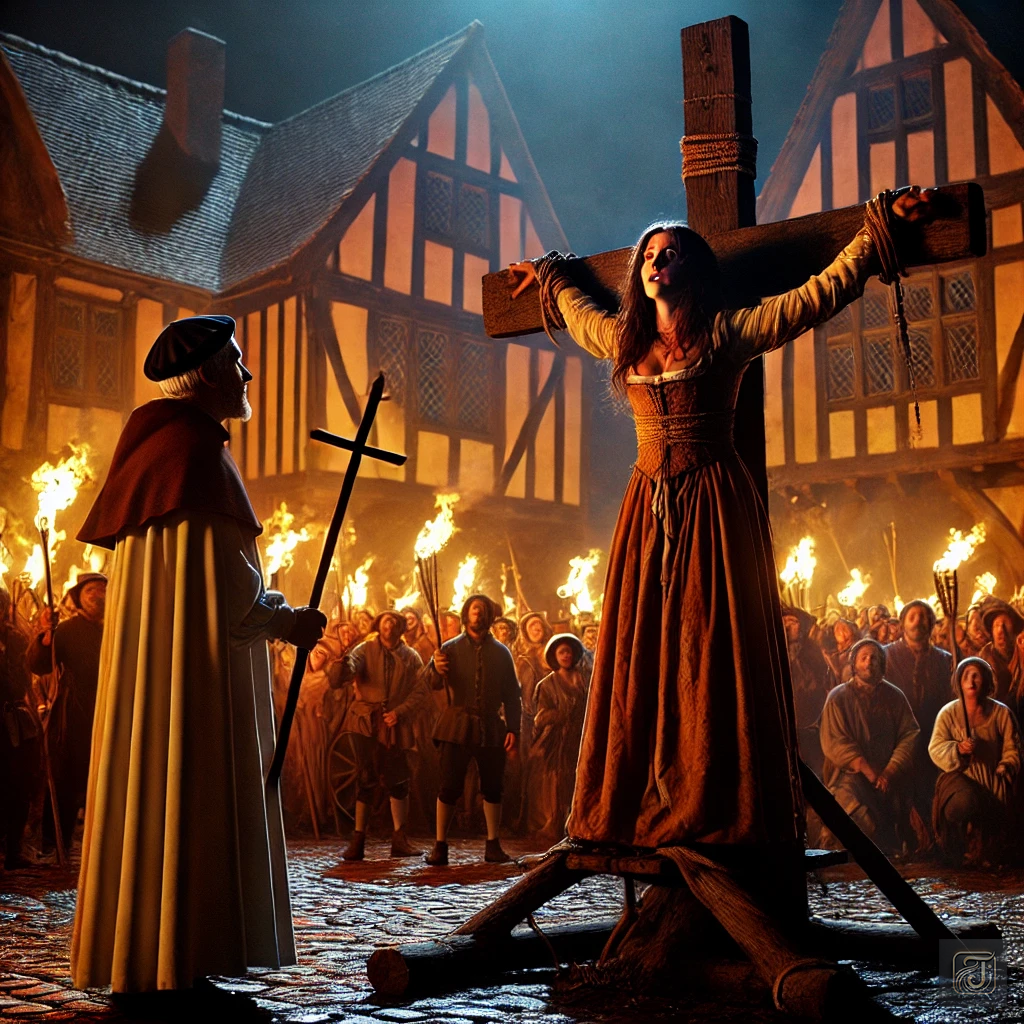
The villagers, far from realizing the gravity of their actions, only saw the situation worsen.
One by one, innocent young women of the village became victims of the witch hunts.
Meanwhile, in the church, the bishops continued to deliberate on the cause of the calamities.
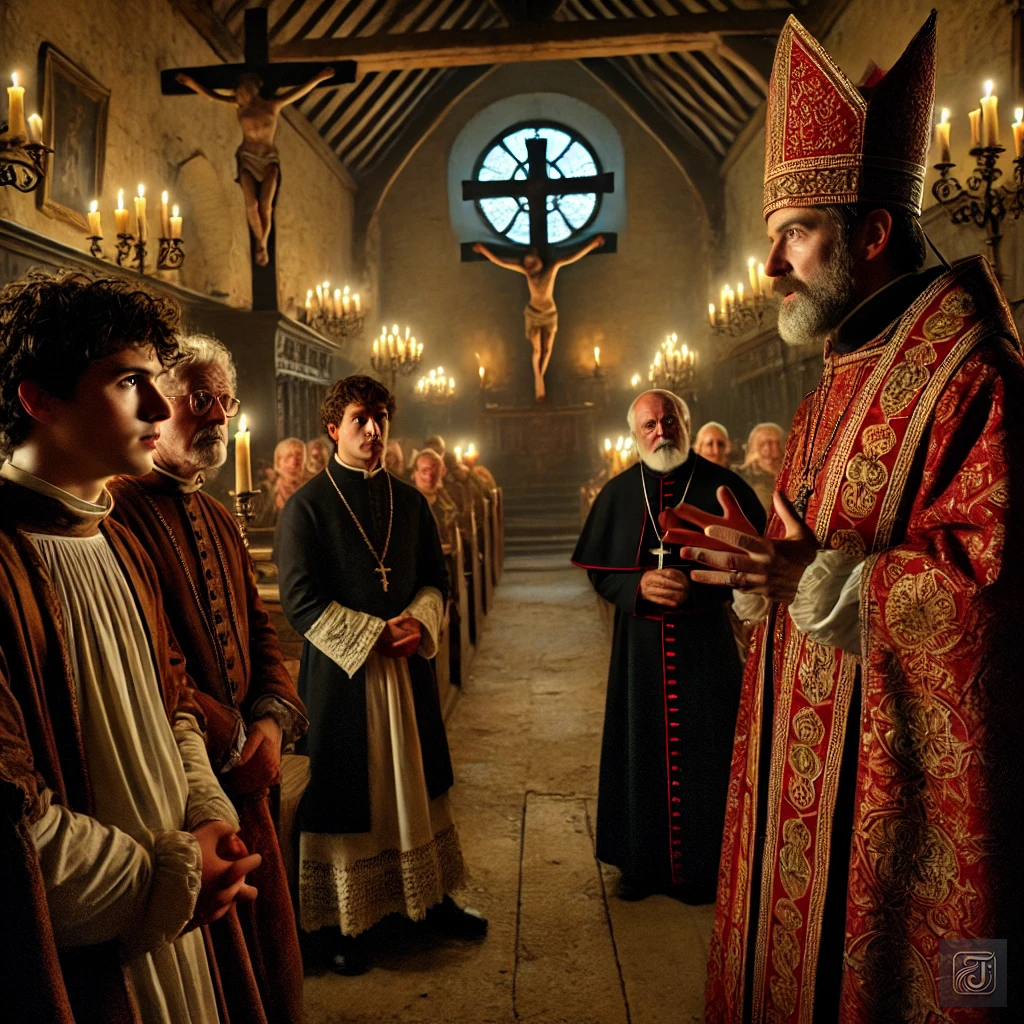
Young Priest:
“Bishop, is this truly the work of witches?”
“Even after Adèle’s execution, the situation remains unchanged.”
Bishop:
“Do not doubt God’s will!”
“If we allow the devil’s work to continue, the village will be destroyed!”
“We must execute the witches!”
Young Priest:
“But why, despite so many being executed as witches, have the calamities not ceased?”
“Did they truly make pacts with the devil?”
Bishop:
“Fear is the shield that protects the village.”
“When people believe in the devil’s presence and fear witches, order is maintained.”
“Disrupting this order cannot be allowed.”
The young priest could say no more, but a sense of unease lingered in his heart.
The Villagers’ Mindset
Meanwhile, the villagers, unable to shake their unease even after the execution, began turning their suspicious gazes toward others.
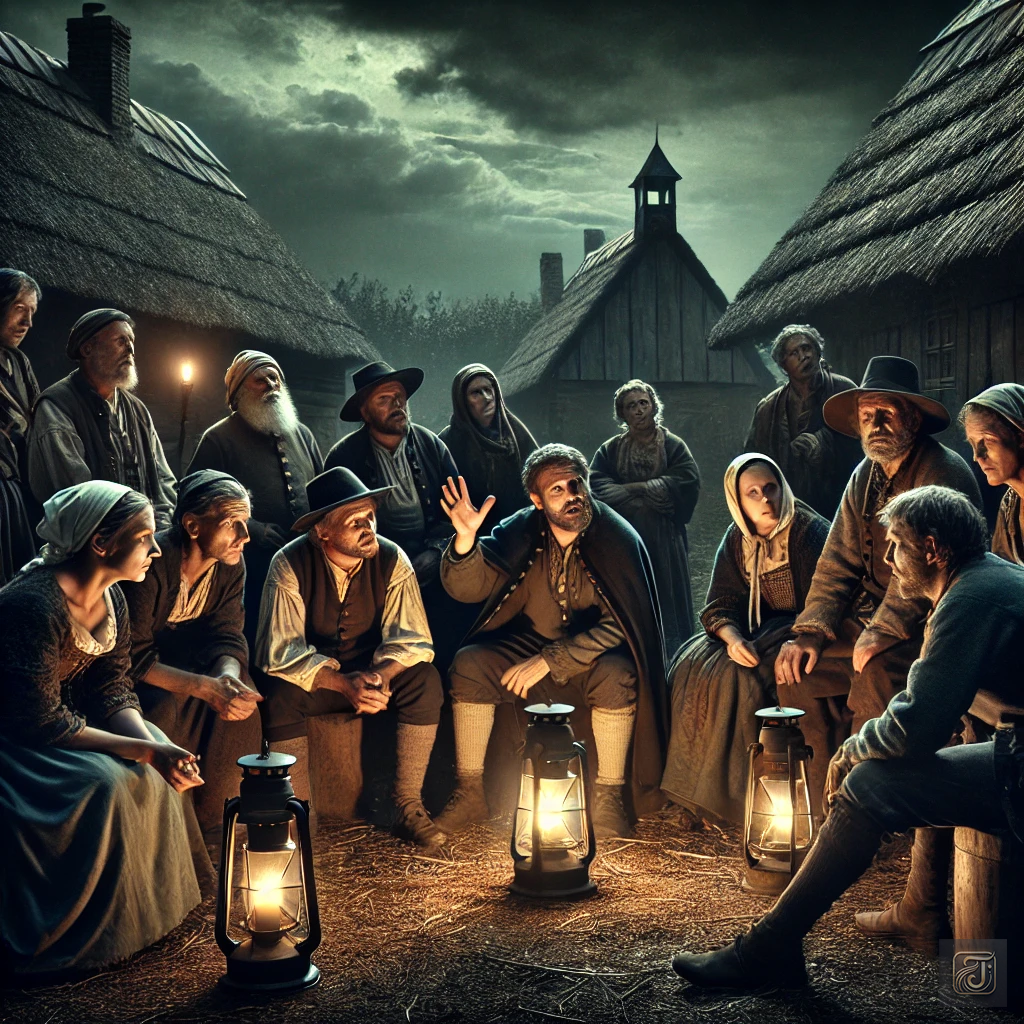
Villager 1:
“Even though Adèle was executed, the calamities haven’t stopped.”
“Why is that?”
Villager 2:
“According to the bishop, there are still other witches hiding among us.”
“We must not let our guard down!”

The villagers began searching for more witches.
Isabeau’s Thoughts

Isabeau Cheyné:
“The calamities plaguing this village are not the work of witches.”
“The truth is, the devil doesn’t exist.”
“They are merely illnesses or pollution.”
“And the villagers’ heart weakness lies in succumbing to fear.”
“With proper knowledge of medicine, the village can be saved.”
“The herbal knowledge my mother taught me will never yield to the weakness of people’s hearts.”
Isabeau continued to search for a cure for the illness all on her own while believing that the herbal knowledge inherited from her mother could one day save the village.
Chapter 6: The Conspiracy of the Powerful
Behind the village church, the powerful conspired to exploit the witch hunts as a means to acquire wealth.
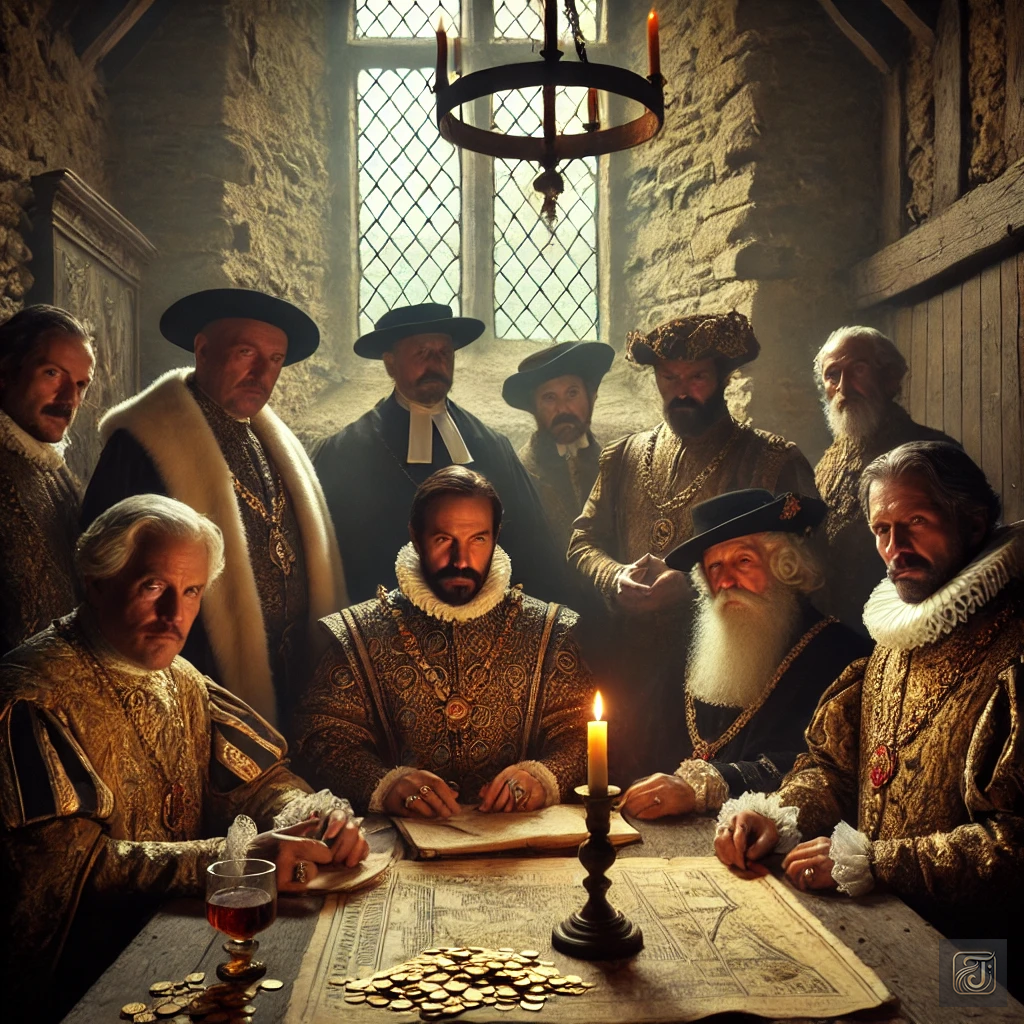
Officials from another village:
“The witch trials are remarkably convenient.”
“If we accuse someone of being a witch, we can confiscate their property.”
Bishop:
“Exactly.”
“If we claim it is God’s will, no one will dare oppose us.”
For them, the witch hunts were both a “ritual to appease God’s wrath” and a means to satisfy their own greed.
Meanwhile, on the outskirts of the village, Isabeau observed the growing unease and fear spreading throughout the community.

Isabeau Cheyné:
“This is the power of fear.”
“People refuse to see the truth, finding solace only in doubting others.”
“But that will only lead to innocent people becoming victims…”
“Someone must put an end to this vicious cycle…”
As she reflected on the herbal knowledge taught by her mother, she vowed in her heart that one day she would save the village.
Chapter 7: The Tragedy of Geneviève, Condemned by Grudge
A Proposal and Rejection

The most beautiful woman in the village, Geneviève, was in love with a young shepherd named Jean.
Guillaume, the son of a village nobleman, proposed to her.
In the village square, as the soft light of the setting sun bathed the scene, Geneviève stood gracefully, dressed in a white dress.
The sunlight illuminated her dress, making her beauty resemble that of a painting.
Her elegance radiated a confidence and pride that seemed to shine from within.
In stark contrast, Guillaume, standing before her, bore a look of dissatisfaction and irritation.
His lavish attire symbolized his status and wealth, yet his words betrayed nothing but selfish desire.

Guillaume:
“Geneviève, you are the most beautiful woman in the village.”
“Marry me, and I will give you the luxurious life you deserve.”
His voice was cloaked in gentleness, but he could not conceal the controlling desire that lay beneath.
Geneviève:
“Thank you, but my heart already belongs to someone.”
“Unfortunately, that person is not you.”
In that moment, Guillaume’s smile vanished, and anger filled his eyes.
Guillaume:
“That shepherd Jean?”
“What could you possibly see in such a poor man?”
“I could give you a far more luxurious life!”

Geneviève:
“You wouldn’t understand, would you?”
“I would never choose a husband based on wealth or convenience.”
“You don’t care about my happiness.”
“You only want to satisfy your own desires.”
“Is that what you call marriage?”
“Don’t think you can buy everything with money.”

Guillaume:
“You dare to reject me…”
“I will make you regret this!”
Grudge and Conspiracy
That night, Guillaume and his father sat in a cold, stone-built room within their mansion.
On the wooden table at the center of the room lay a black cloth and chicken bones, scattered carelessly.
The flickering candlelight cast eerie shadows across their faces.
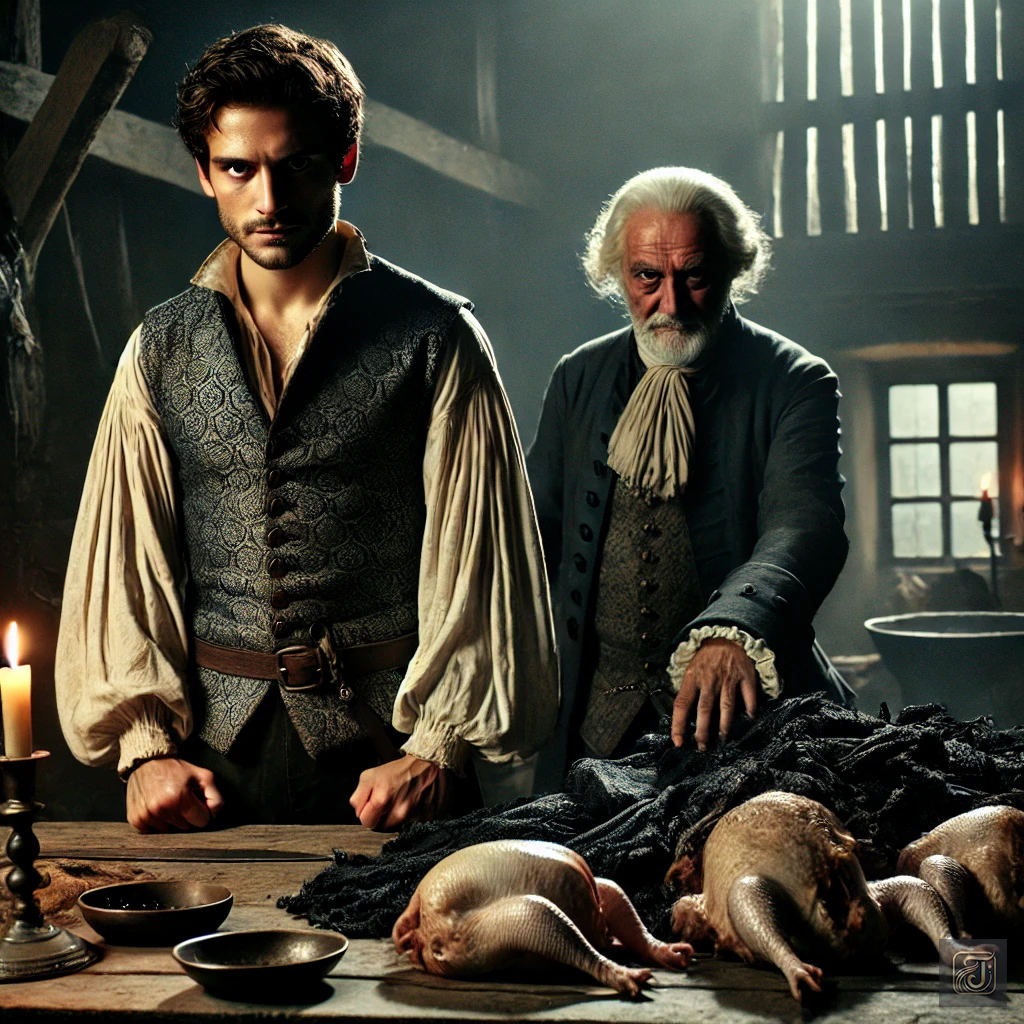
Guillaume:
“I cannot forgive that woman.”
“She insulted me in front of everyone.”
“I will have my revenge on her!”
Guillaume’s father flashed a sinister smile.
Guillaume’s father:
“It’s simple.”
“Everyone is already consumed by suspicion, wondering who the witch might be.”
“Plant the black cloth and chicken bones in her house—everyone will believe they are tools of witchcraft.”
“Then the villagers will see her as a witch.”
“Make her out to be one.”
Fabrication and Trial
A few days later, rumors spread throughout the village that “evidence” had been found in Geneviève’s house: a black cloth and chicken bones.
Driven by fear and curiosity, the villagers gathered at her home, their accusations of witchcraft growing louder and more insistent.
Geneviève’s lover, Jean, desperately tried to defend her, insisting it was all a lie, but his pleas fell on deaf ears.
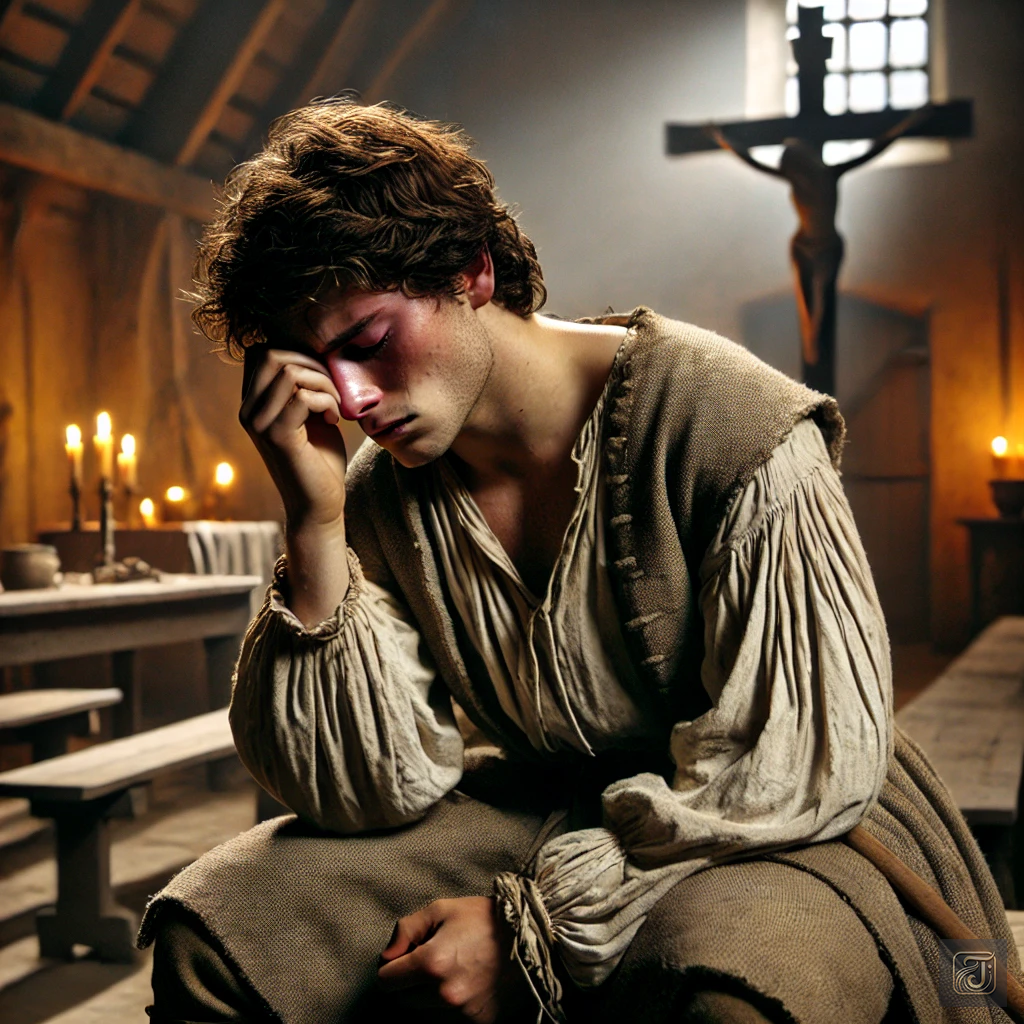
Jean:
“She… made a pact with the devil?”
“That’s a lie!”
“But no matter how much I say it’s false, no one believes me…”
“What am I supposed to do…?”
In the church tribunal, Geneviève stood in the center, surrounded by high ceilings and cold stone walls.
Her voice echoed through the space, but it failed to reach the ears of the crowd.
Accused of being a witch, Geneviève faced interrogation in the church court.

Bishop:
“There are testimonies claiming that you met with the devil in the dead of night.”
“We also have this evidence.”
“How do you explain yourself?”
Geneviève:
“I know nothing of such things, nor have I ever seen them!”
“Someone must have planted them!”
“I am not a witch!”
However, fear had taken root in the villagers’ hearts, and her words fell on deaf ears.
Her Final Words
Under the overcast sky, a pyre was erected in the village square.
Geneviève, her bound hands trembling slightly, walked toward the pyre with a steady and dignified stride.
There was no trace of fear in her demeanor.
Among the crowd, some faces bore expressions of regret, while others were twisted in fear.
Jean pushed through the throng, his voice quivering as he cried out.

Jean:
“Geneviève, I’m sorry.”
“I couldn’t save you…”
“No one believed my words.”
Geneviève smiled at Jean, her expression calm and reassuring as she softly responded.
That smile conveyed both her gratitude and her final farewell to him.

Geneviève:
“It’s all right, Jean.”
“You did nothing wrong.”
“That you loved me and believed in me until the end—”
“That is more than enough.”
“Thank you, truly.”
She turned to face the villagers and cried out with a powerful voice.
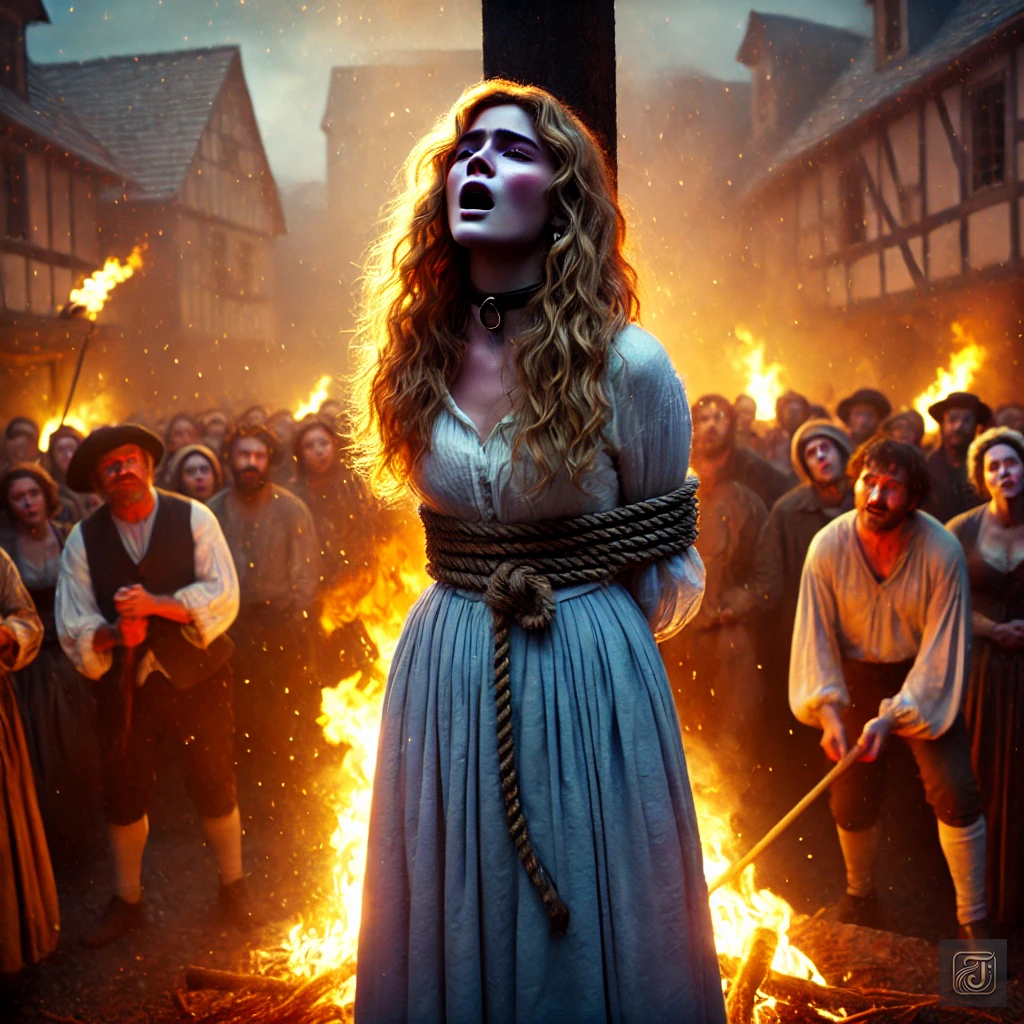
Geneviève:
“If loving is a sin, then there is no justice in this world!”
The flames roared to life, and her heartfelt cry was carried away with the smoke.
Chapter 8: What Can Be Done for Everyone
One by one, innocent women of the village continued to fall victim.
Isabeau was hurrying to complete the medicine.
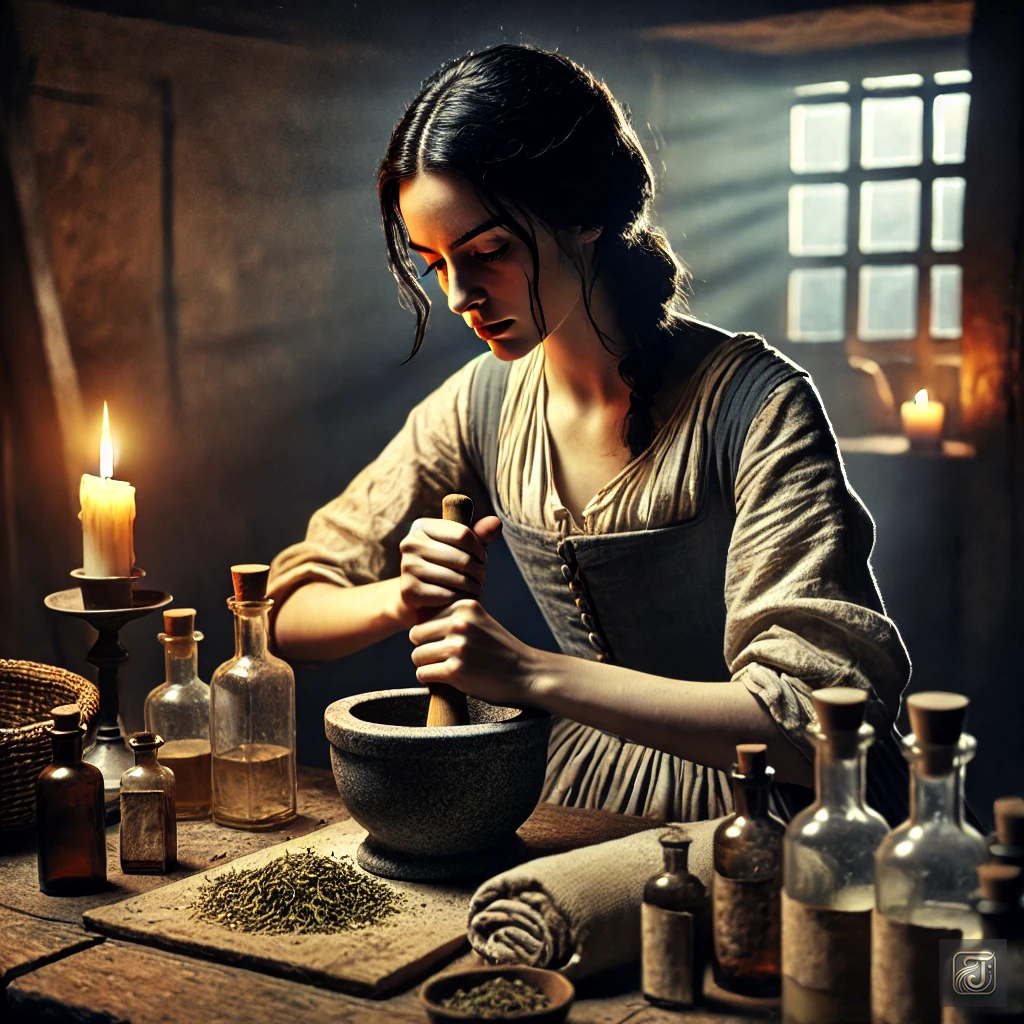
Isabeau Cheyné:
“I must complete this medicine as soon as possible to prevent another victim.”
“This is what I can do for everyone in the village.”
“It’s what I can do to save the people my mother loved so dearly.”
Isabeau worked tirelessly every day, staying up late into the night, sacrificing sleep to continue crafting the remedy.
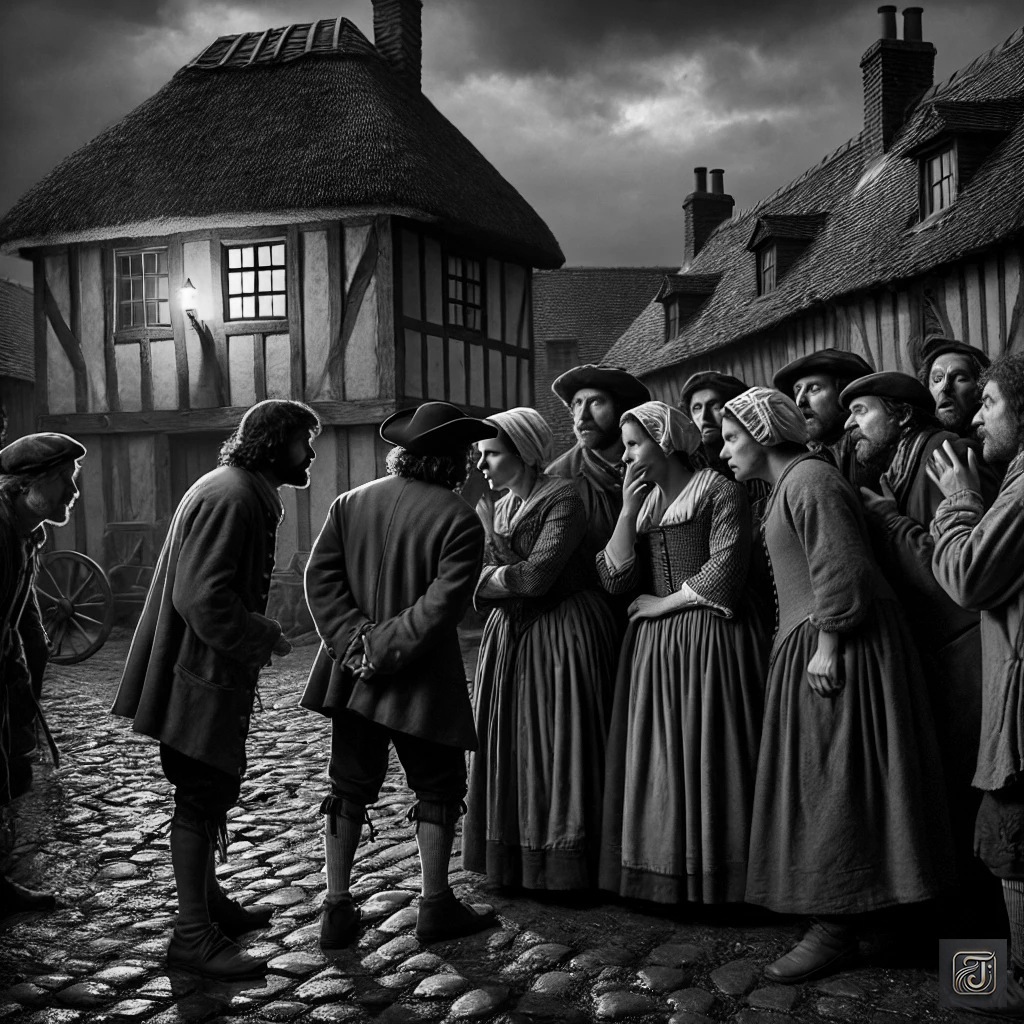
Rumors Among the Villagers:
“I heard Isabeau’s house often has lights on late into the night.”
“Do you think she’s up to something suspicious?”
The light they saw was not one of suspicion, but a beacon of hope—a reflection of Isabeau’s pure desire to save the village.
Chapter 9: The Tragedy of Hélène, Condemned by Temptation

Hélène
Hélène was a gentle and trusted woman in the village.
Having lost her parents at a young age, she lived a modest life, working diligently on the farmland they had left behind.
She had a compassionate nature and could never turn a blind eye to those in need, always ready to lend a helping hand.
Debt and Betrayal
One day, a villager named Renaud visited Hélène.

Renaud:
“Hélène, please!”
“The harvest was poor, and I’m desperately short of money.”
“Could you lend me some?”
Hélène:
“Renaud, use this to help your family.”
“But don’t push yourself to repay it too soon.”
“Just do so when the harvest is better.”
Renaud:
“Thank you, Hélène!”
“You truly are a saving angel.”
However, a few months later, as the repayment deadline approached, Renaud found himself cornered.
He visited Hélène again, but she responded kindly.

Hélène:
“It’s all right, Renaud.”
“The repayment deadline hasn’t arrived yet, has it?”
“I’m not in a hurry.”
However, betraying Hélène’s kind and generous heart, a sinister idea began to form in Renaud’s mind.

Renaud:
“If Hélène were gone…”
“Then my debt would disappear with her.”
And the thought that emerged in his mind was a terrifying one:
“to use the witch trials.”
The Betrayal and Accusation
Renaud went to the church and gave the priest Hélène’s name.
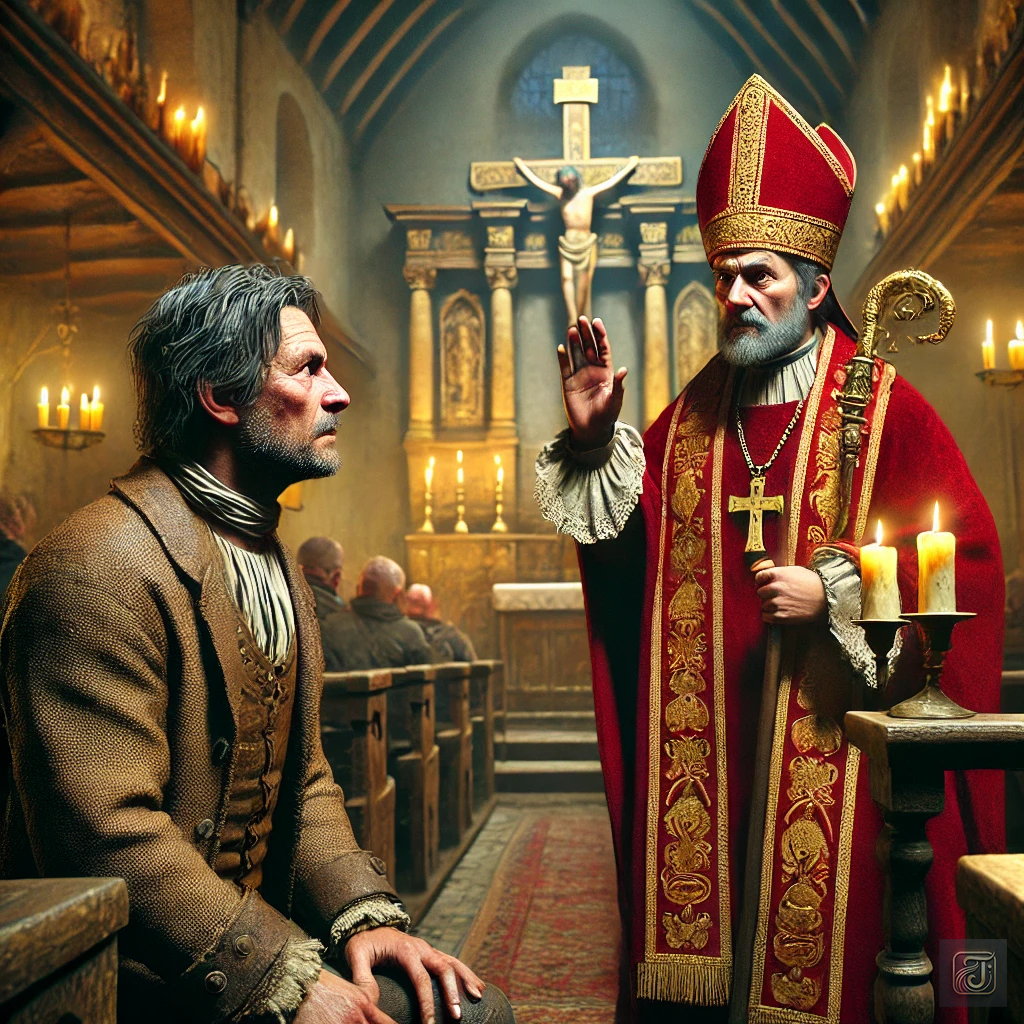
Renaud:
“Bishop, I saw Hélène talking to the devil in the middle of the night!”
The priest, convinced by the testimony, summoned Hélène.
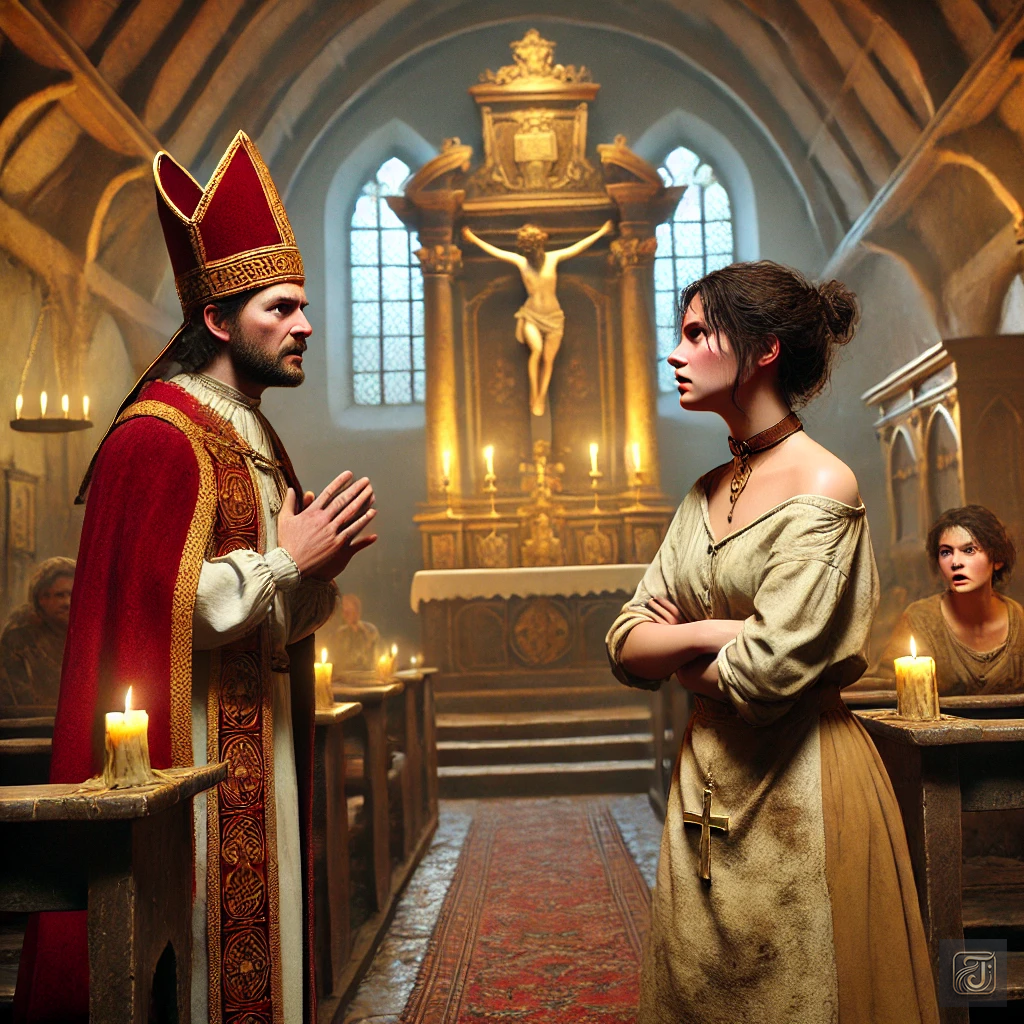
Bishop:
“Hélène, there is testimony claiming that you have been meeting with the devil at night.”
Hélène:
“What are you saying?”
“I have done no such thing!”
Hélène looked at Renaud, but he averted his eyes and remained silent.
The Trial and Torture
Hélène was also taken to the church’s underground dungeon, where she was subjected to torture.
She pleaded her innocence repeatedly, but no one would listen.
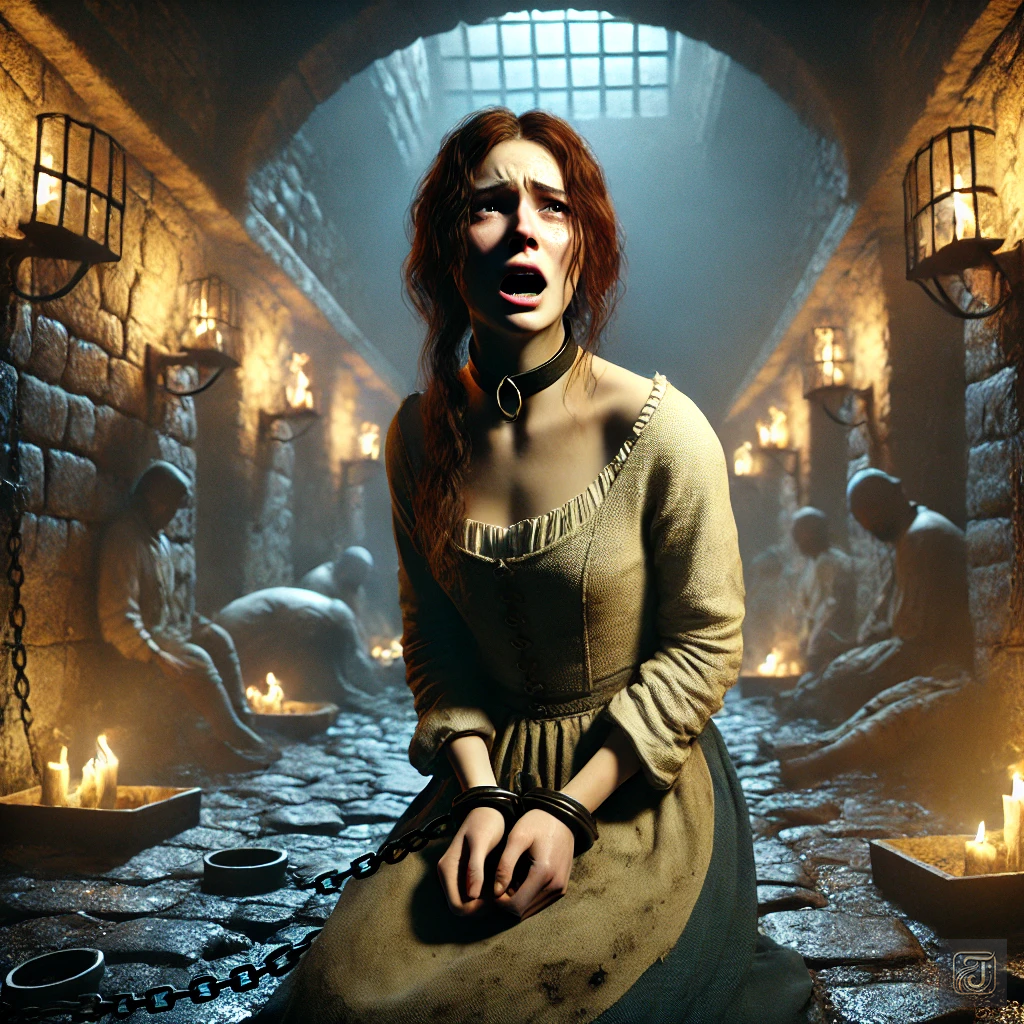
Hélène:
“I am not a witch!”
“Why won’t you believe me?”
However, after enduring brutal torture, she too was forced to give a false confession.
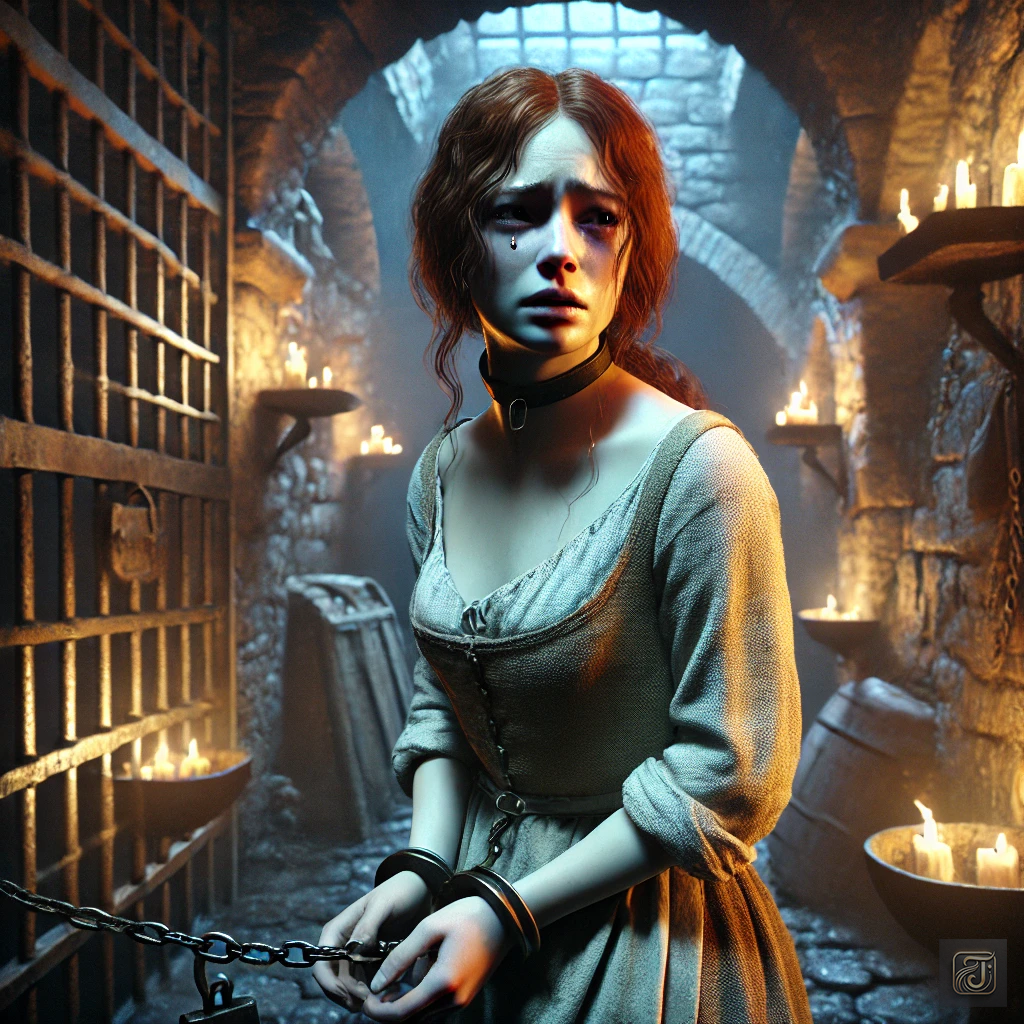
Hélène:
“…Very well.”
“I made a pact with the devil.”
“But I couldn’t defy the orders he gave me…”
Her Final Words
On the day of her execution, Hélène was led to the village square.
Amidst the watchful eyes of many villagers, she cried out to the priest.
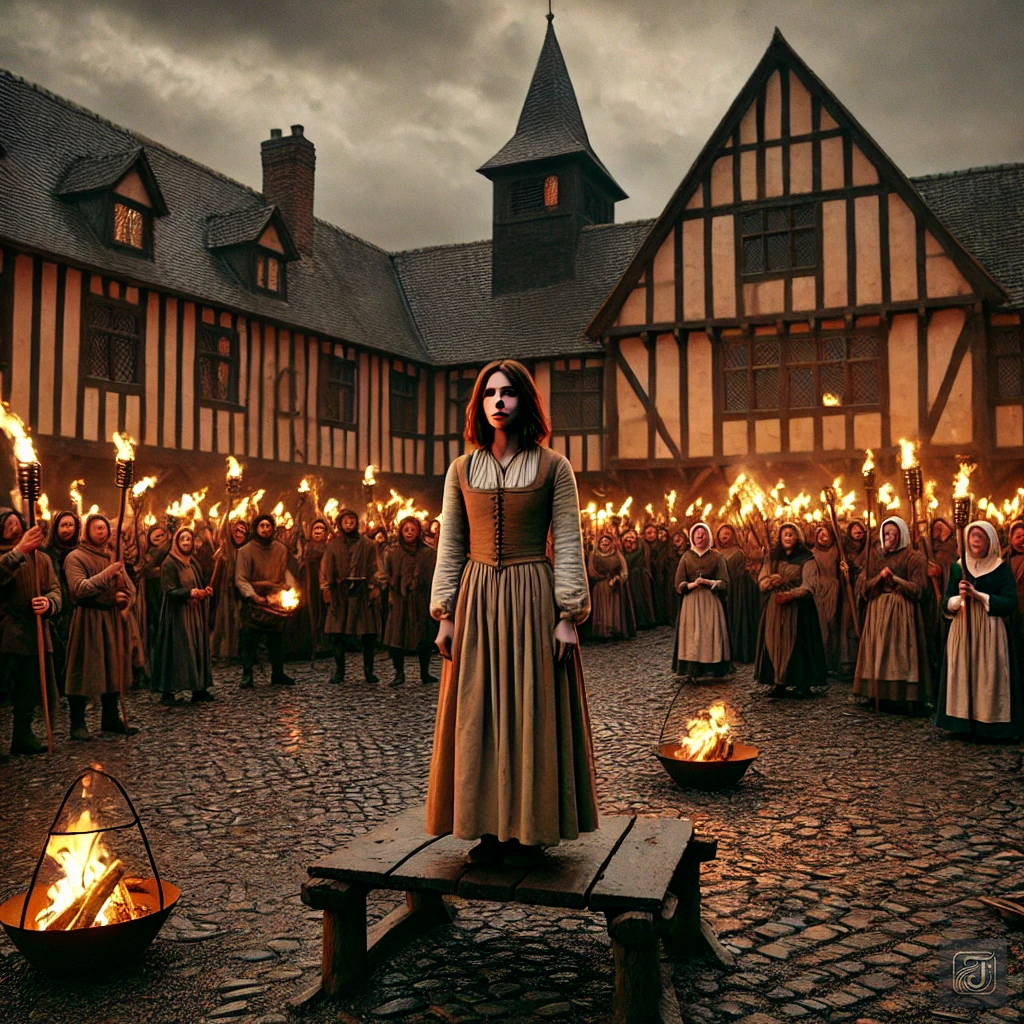
Hélène:
“I am not a witch!”
“Nor am I a servant of the devil!”
She looked around at the crowd and shouted her final words.
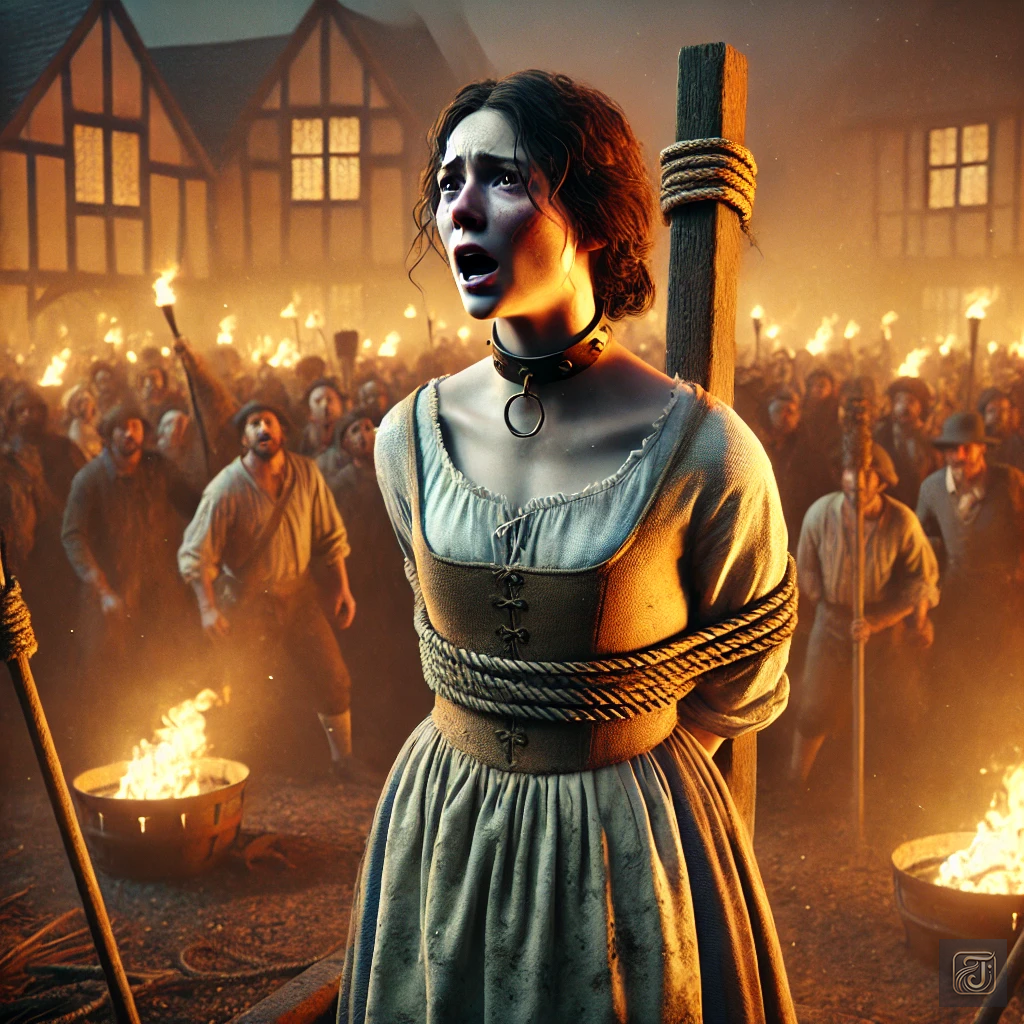
Hélène:
“Why must I be punished?”
“You are bound by fear, executing the innocent!”
“The ones committing the true sin are all of you!”
Her words pierced deeply into the hearts of the villagers, and even as the flames engulfed her, her voice lingered in their ears.
Chapter 10: The Villagers’ Doubts and Struggles
The Villagers’ Inner Struggles
Even after the executions of Geneviève and Hélène, the calamities continued to plague the village.
Driven by anxiety, the villagers kept searching for new “witches,” but some among them gradually began to harbor doubts.
A Villager’s Murmur
One evening, after a village meeting, the villagers spoke in hushed tones.
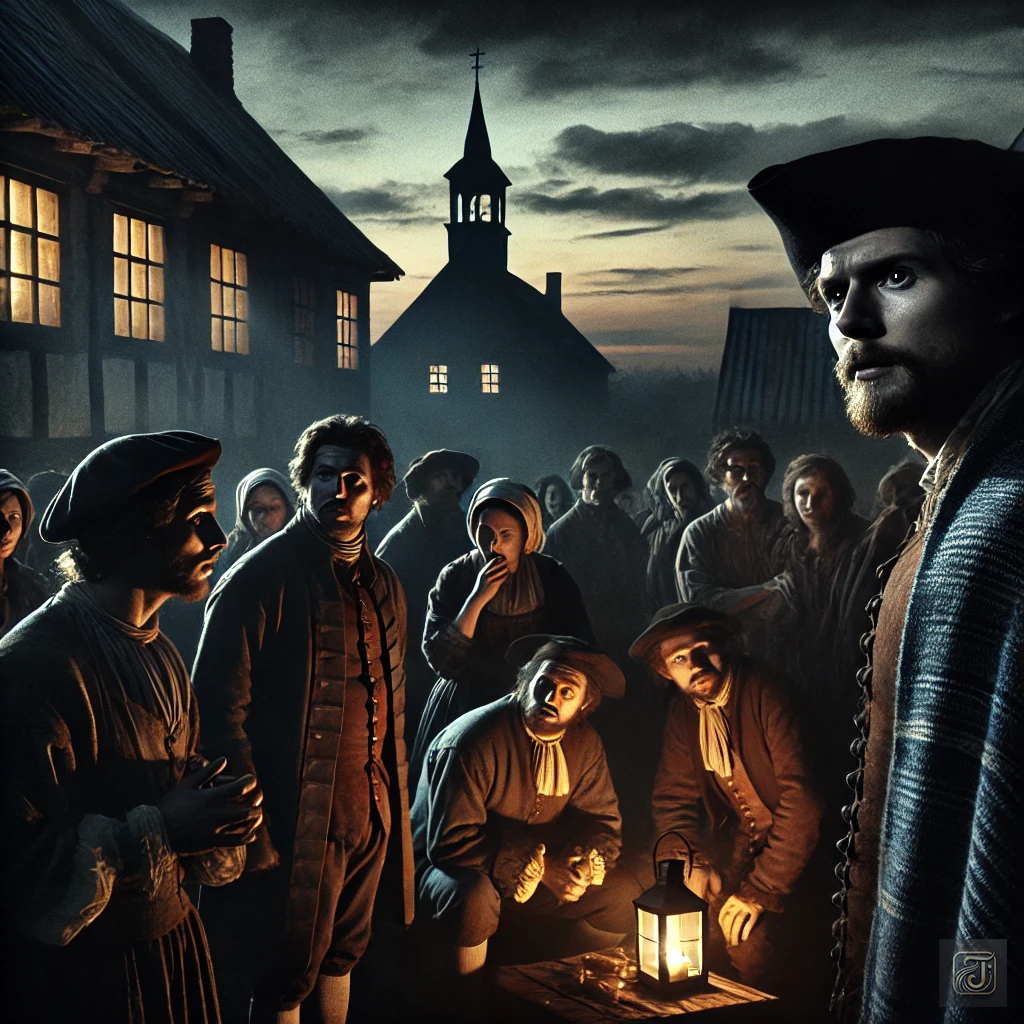
Villager 1:
“Burning someone hasn’t stopped the calamities…”
“Maybe witches don’t even exist after all?”
Villager 2:
“Don’t say that!”
“You’ll be the next target!”
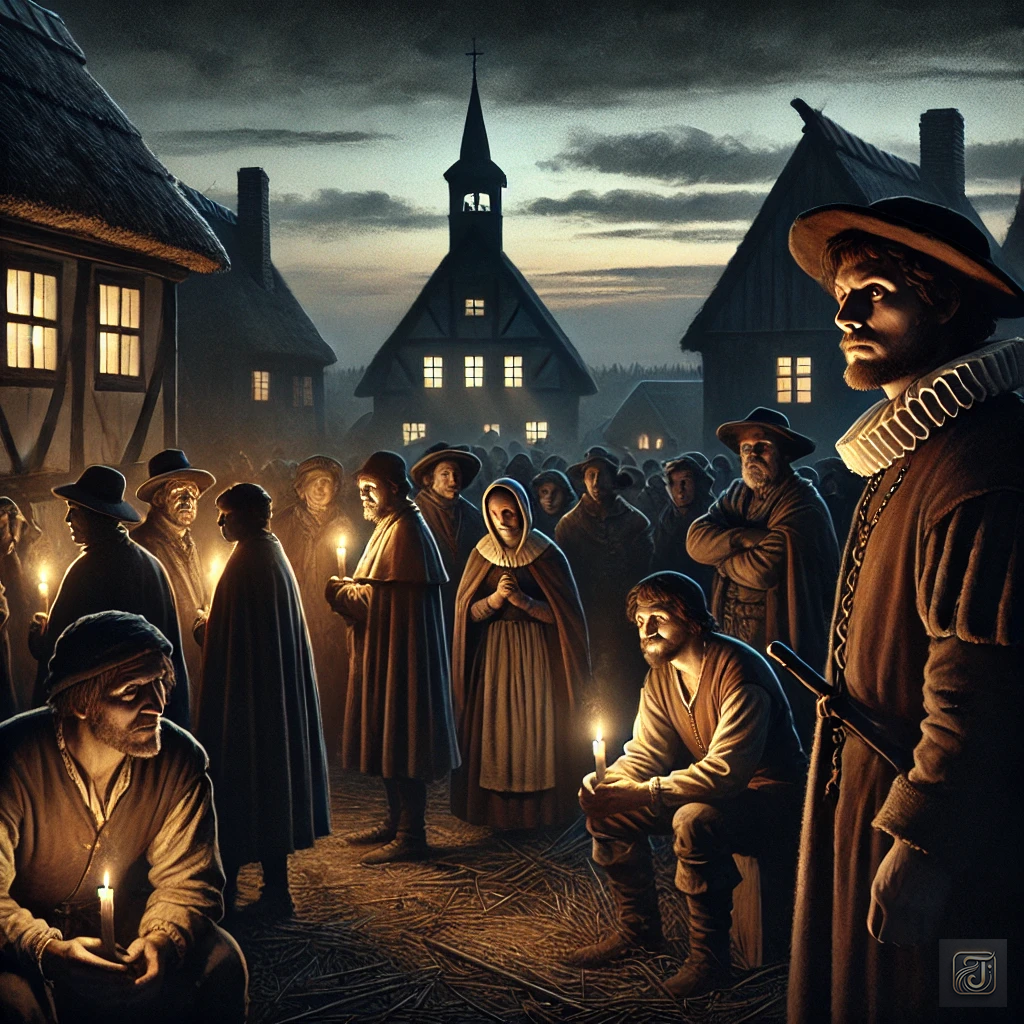
Villager 1:
“But think about it.”
“What if the calamities are just illnesses or natural disasters?”
“If that’s the case, what we’re doing is nothing but murder.”
“Are we really okay with continuing like this?”
Villager 3:
“Even so, if we don’t point fingers at someone, we’ll be the next targets…”
“Even if we know how wrong it is.”
The villagers feared that they might become the next targets.
Fear ruled over them, and by accusing others, they sought to avoid suspicion falling upon themselves.
Though gripped by internal dread, the villagers began searching for new “witches,” one after another.
Chapter 11: Jacques’ Confession
Meanwhile, Jacques, who had accused Adèle, was tormented by guilt, as her cries appeared in his dreams night after night.
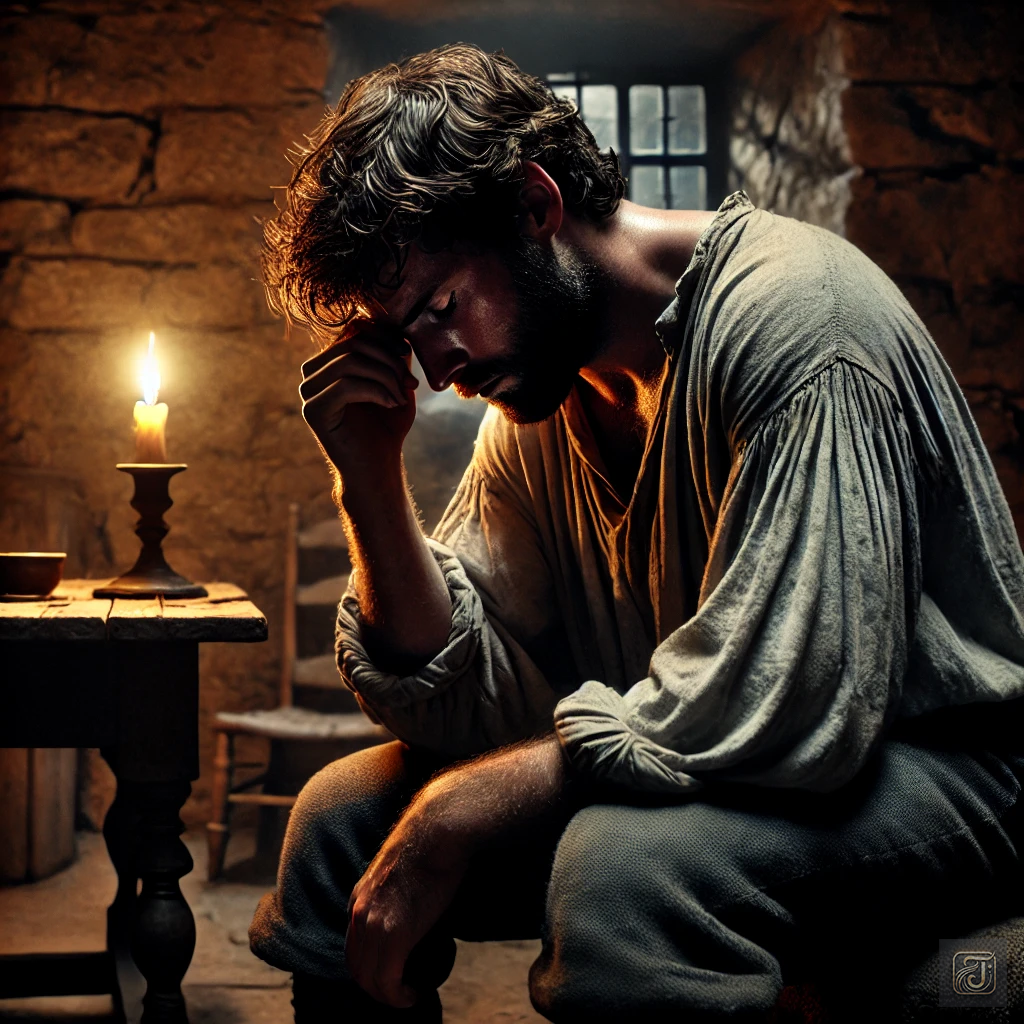
Jacques:
“It was all my fault.”
“Adèle wasn’t a witch…”
“She was only trying to protect the land her husband left her, and I took it from her.”
One night, he confessed to his wife.
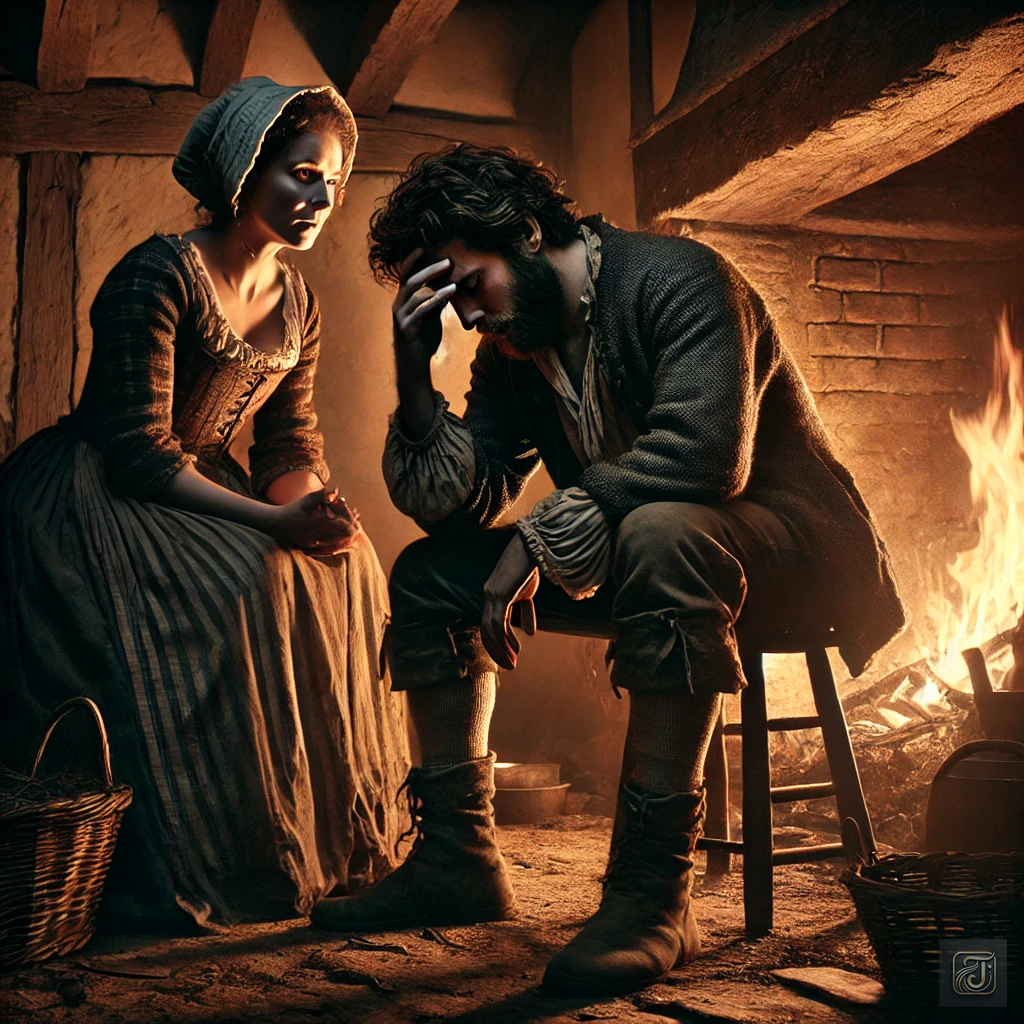
Jacques:
“Adèle, the first to be executed…”
“Her execution was my fault…”
“I lied and framed her.”
Jacques’s wife:
“Why would you do such a thing?”
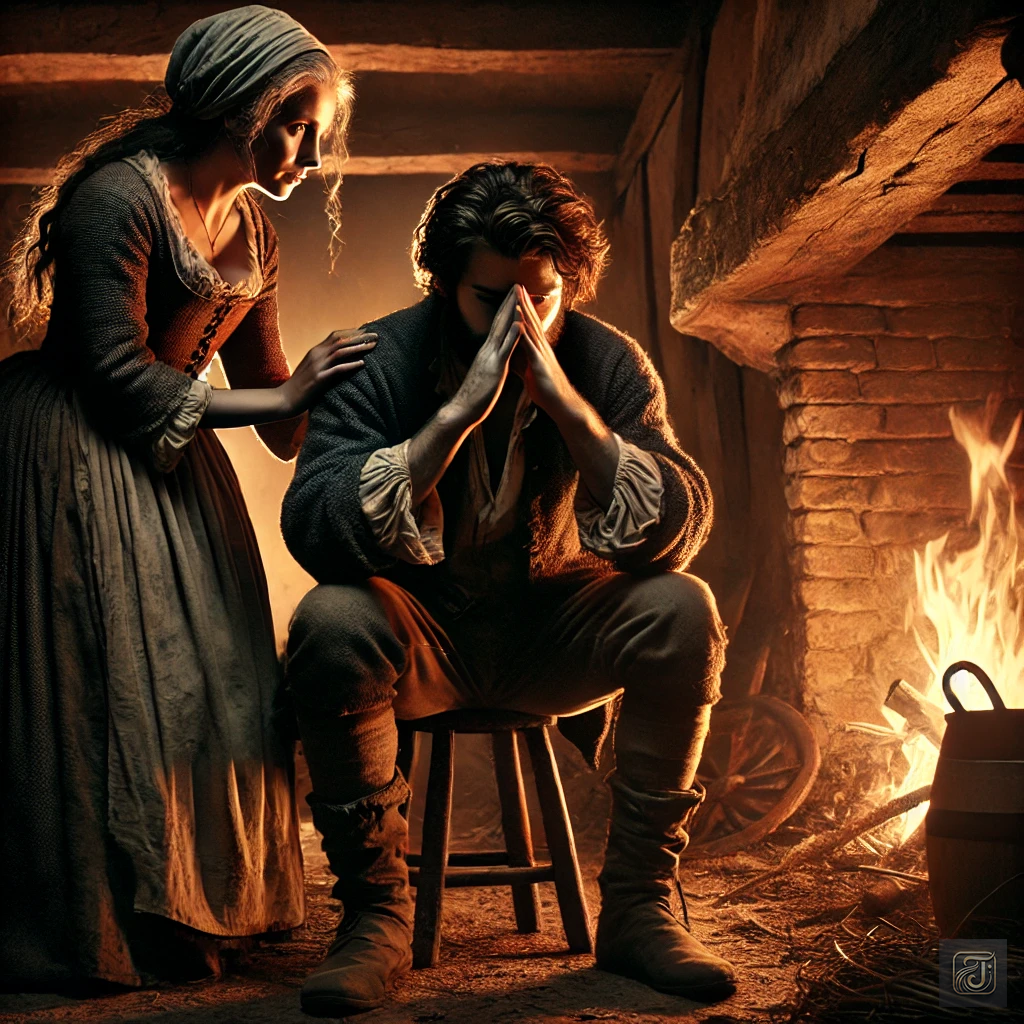
Jacques:
“I was jealous of her.”
“She inherited that land from her wealthy husband without any effort!”
“I gave in to my own greed.”
“But even I didn’t think she would be executed in such a way.”
“What am I supposed to do now?”
Jacques’s wife:
“You need to tell the truth to everyone.”
“If you don’t, this village will never change.”
Villagers Awaken to the Truth
A few days later, spurred by Jacques’ confession, the villagers gathered once again to discuss the situation.
Though fear lingered in their voices, some villagers could no longer conceal their doubts.
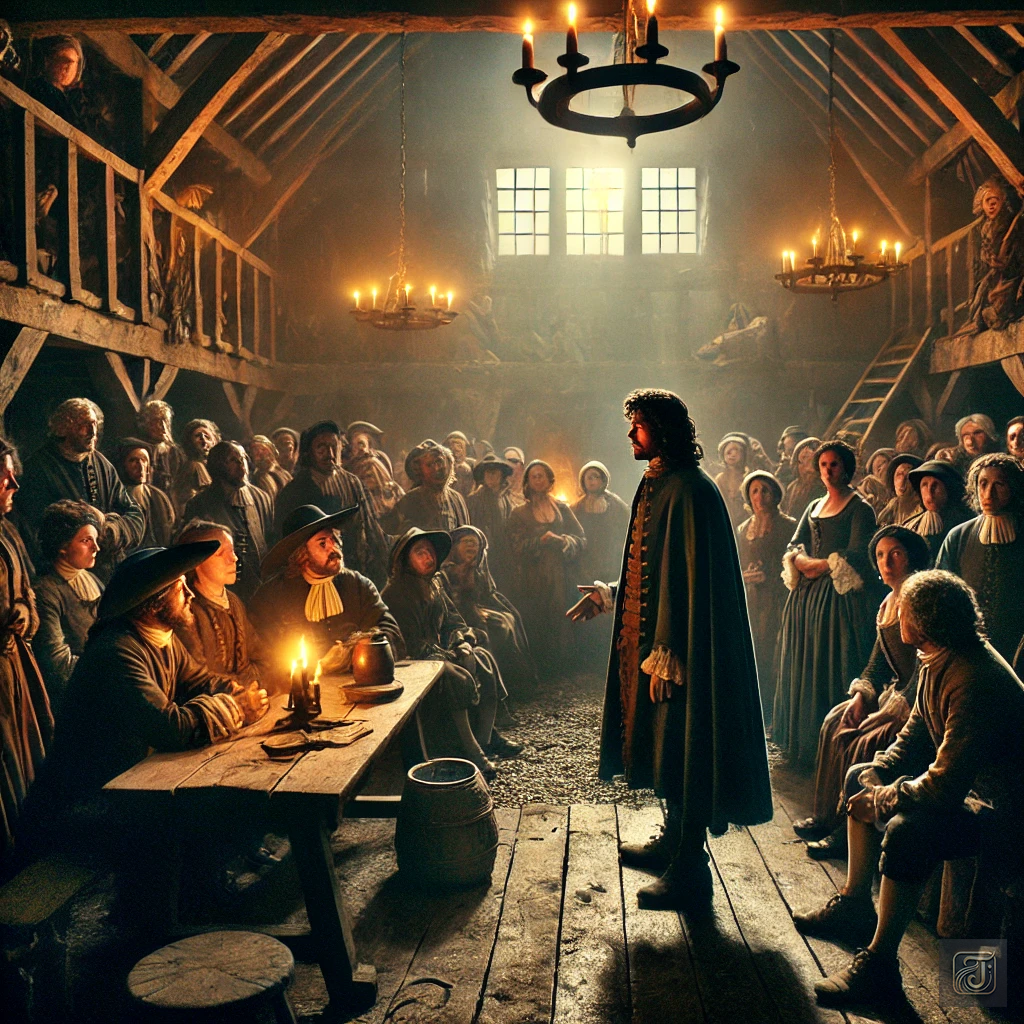
Villager 1:
“What if Isabeau is innocent too?”
“What if she has been trying to help us all along?”
Villager 2:
“But if we admit that, what happens to all the sacrifices we’ve made?”
“It would mean acknowledging that we killed innocent people.”
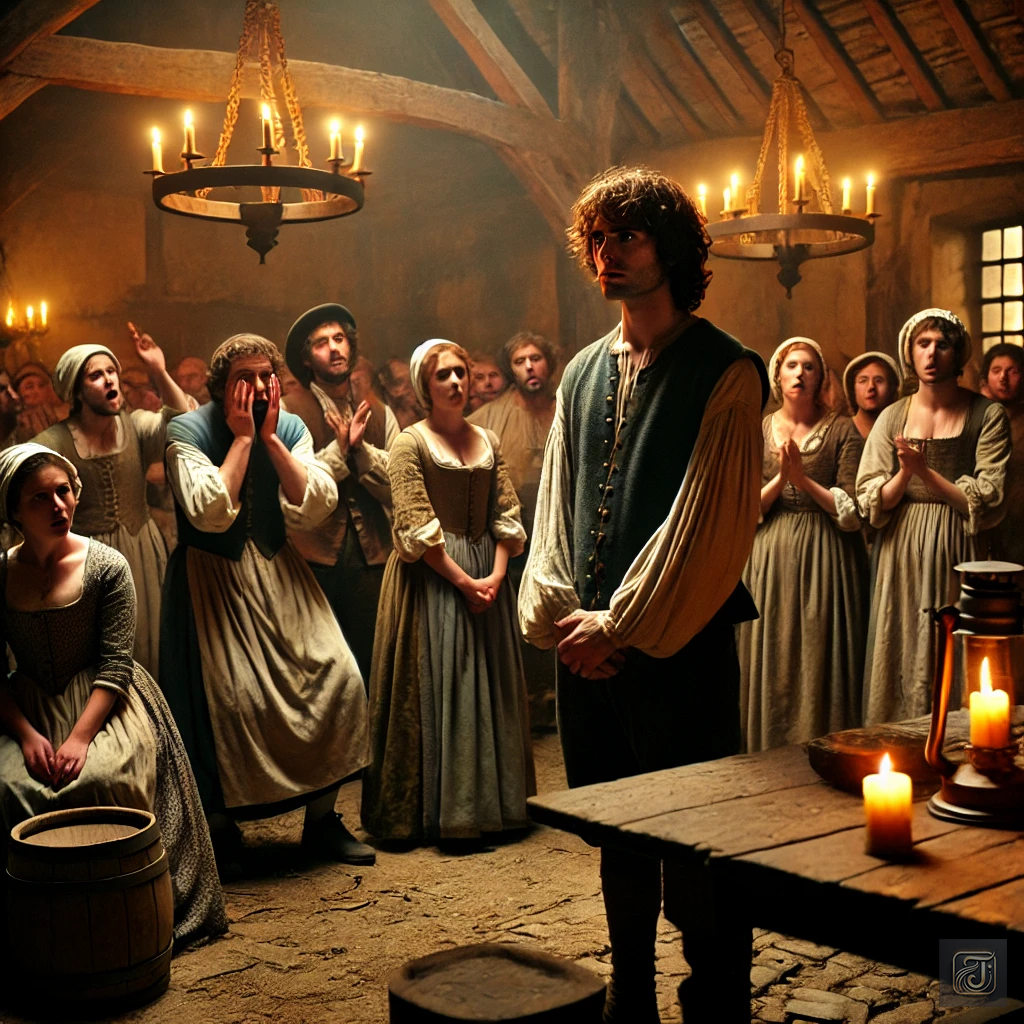
Villager 3:
“But isn’t it time we realized the truth?”
“There is no devil in this village.”
“The calamities are just illnesses or natural disasters.”
“The devil… doesn’t really exist.”
Those words silenced the group, but a growing awareness began to take root among the villagers—that there should be no more victims.
Chapter 12: Between Truth and Falsehood
The Completion of the Medicine

Despite being under the suspicious gaze of the villagers, Isabeau, after days of tireless effort, finally completed her remedy.Using the knowledge passed down from her mother, she had found a solution to treat the disease plaguing the village.
She administered the medicine to several sick villagers and witnessed their symptoms improve with remarkable speed.

Isabeau Cheyné:
“With this, everyone in the village can be saved.”
“No one else has to lose their life or live in fear anymore.”

Isabeau took the remedy in hand and headed to the church.
Her heart was filled with hope that she could save the villagers.
Confrontation with the Bishop
In the church, before the villagers, Isabeau began to speak, holding the completed remedy in her hands.
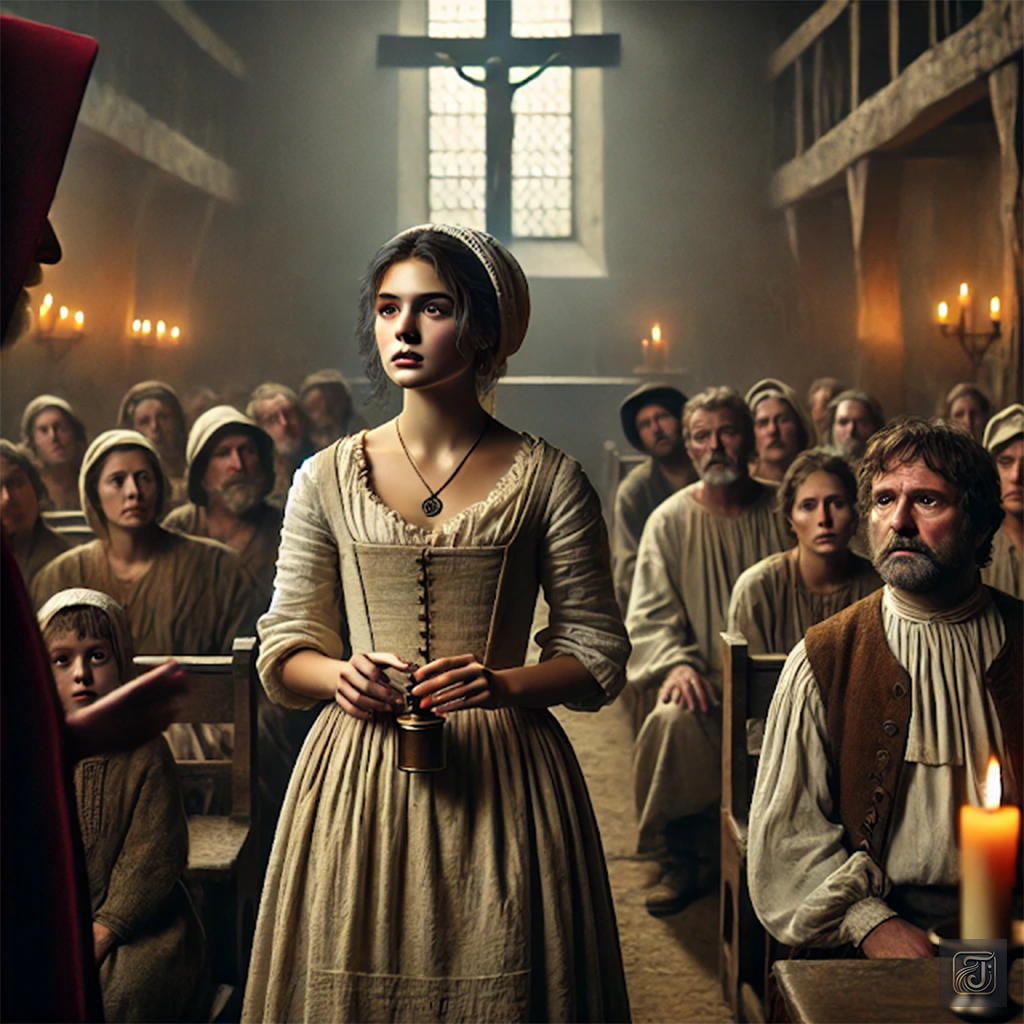
Isabeau Cheyné:
“The calamities plaguing this village are not the work of the devil.”
“This remedy can cure the illness.”
“With this, the village can be saved!”
The villagers showed expressions of surprise and relief.
However, the bishop’s face grew stern as he directed a cold glare at Isabeau.

Bishop:
“Can that medicine really cure the illness?”
“How can you prove that it is not the work of the devil?”
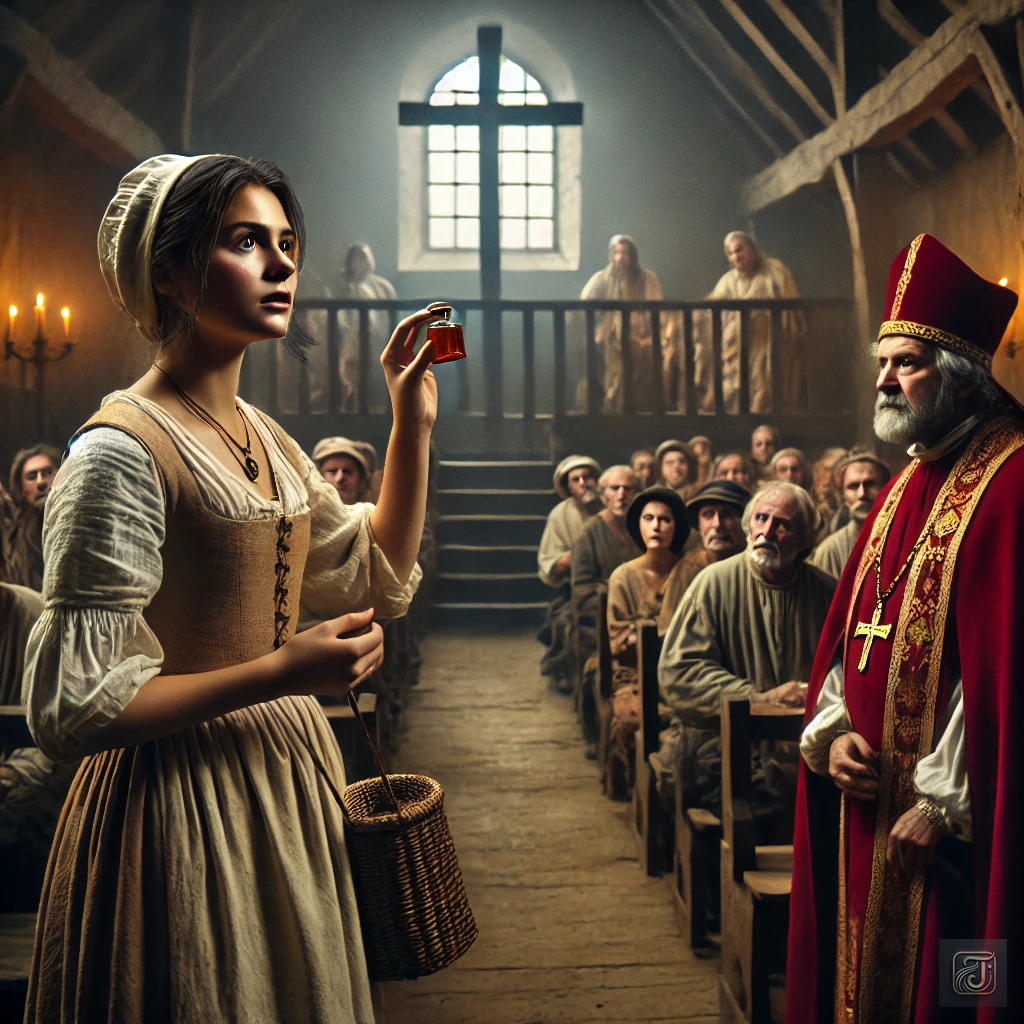
Isabeau Cheyné:
“This is not the power of the devil.”
“It is the power of medical knowledge.”
“Believe in me.”
“With this, everyone can be saved!”
Cheers erupted from among the villagers.

Villager 1:
“Is it true?”
“Will this remedy really cure the illness?”
Villager 2:
“This means we won’t need to search for witches anymore!”
The Bishop’s Distress and Conspiracy
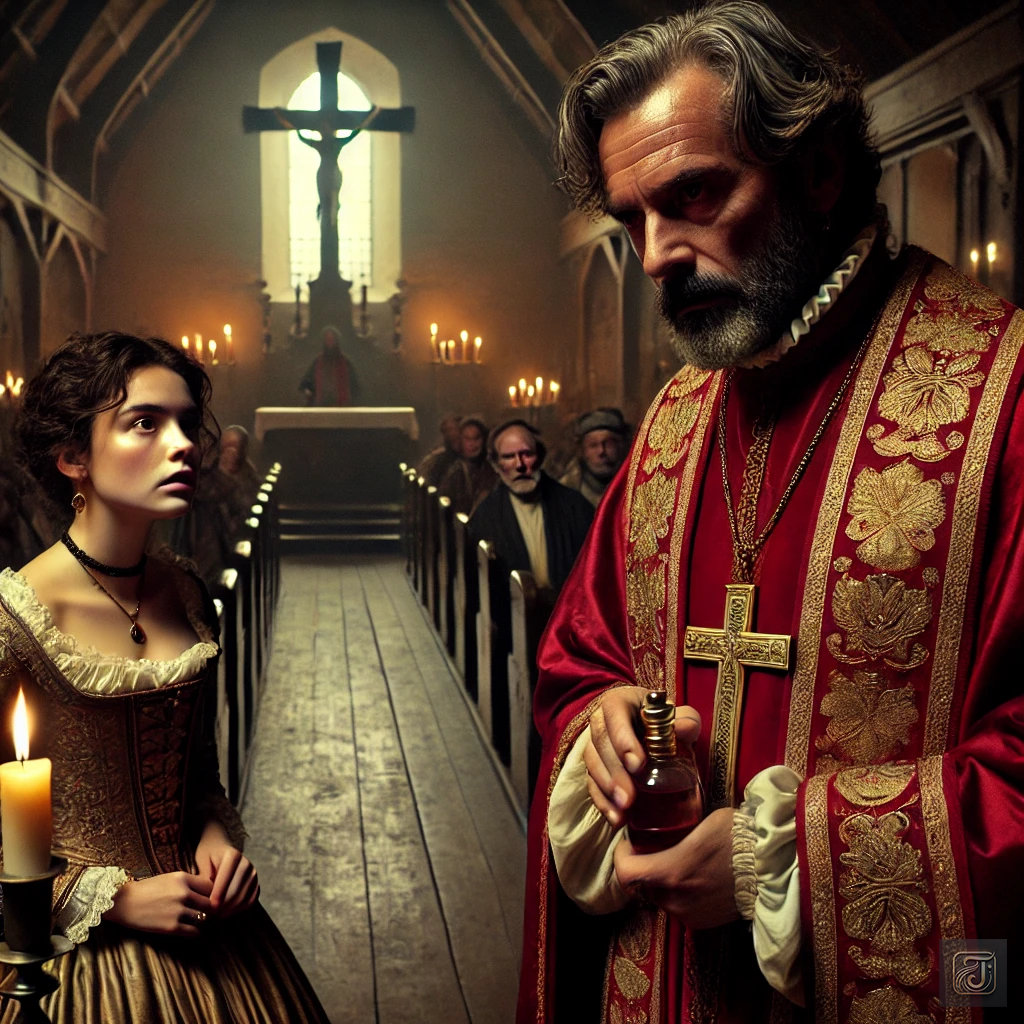
At the very moment the villagers began to find hope, the bishop felt a wave of panic.
If Isabeau’s remedy were proven to save the village, it would expose the witch hunts—conducted under the guise of “God’s will”—as lies.
This revelation would spell his own downfall.
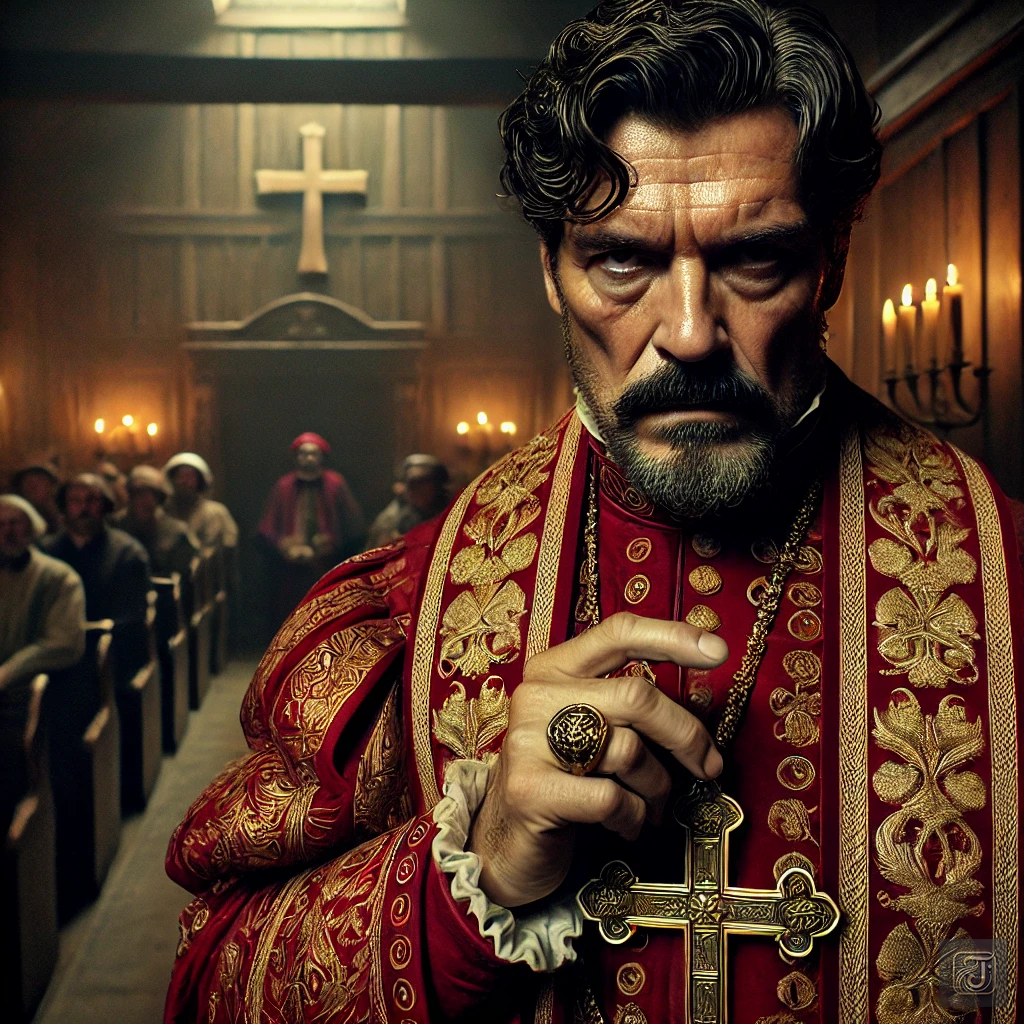
Bishop:
“If the villagers learn the truth, my authority will crumble, and I will be the one condemned.”
“I cannot allow that to happen…”
“Everything will be ruined.”
His hands trembled, and cold sweat beaded on his forehead.
Though he maintained an appearance of calm, inwardly, the bishop saw Isabeau as a grave threat.
The Bishop’s Conspiracy
The next morning, the bishop gathered the villagers in the church and began to speak with a resolute demeanor.
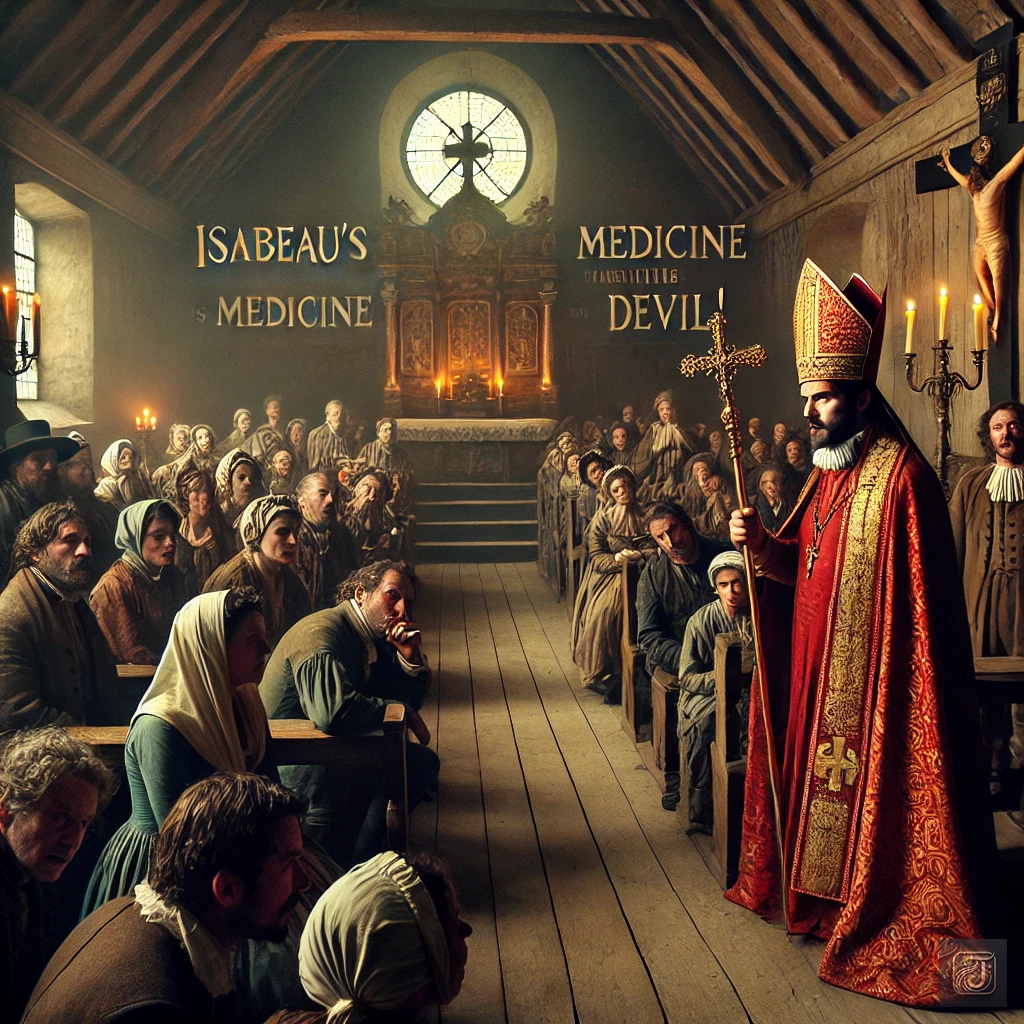
Bishop:
“Villagers, I carefully examined the remedy Isabeau brought last night.”
“But it is dangerous!”
“It is a potion of the devil!”
The villagers were astonished and began murmuring among themselves.
Villager 1:
“But… her remedy is already starting to heal the sick. Why?”
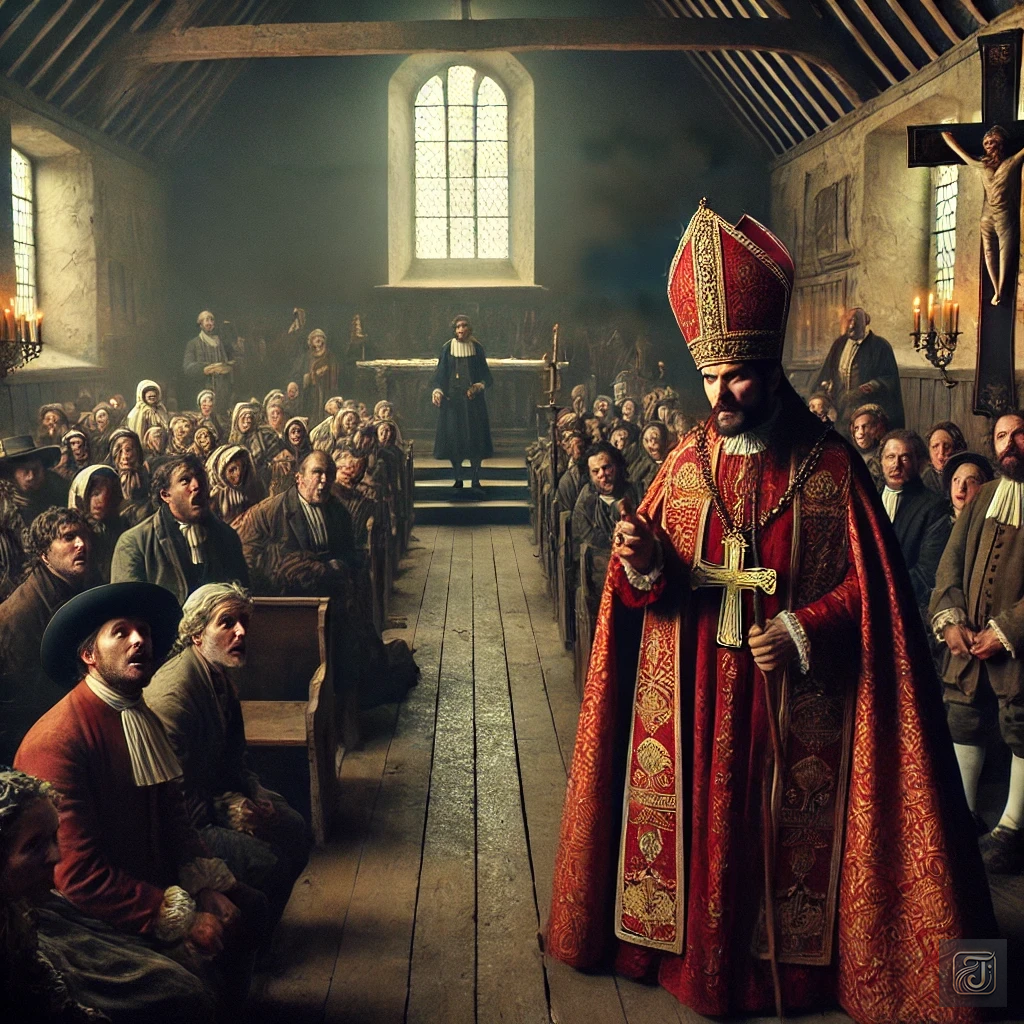
Bishop:
“Don’t be fooled!”
“The devil plans to cure the illness with that medicine and gain the villagers’ trust!”
“And its goal is to make us lose our faith in God and drag us down to hell!”
“Isabeau is an extremely dangerous witch.”
“She must be captured and executed!”
The Capture of Isabeau
Under the bishop’s orders, Isabeau was seized by the church guards.
The villagers, though unsettled, remained silent, paralyzed by fear and confusion, knowing that opposing the bishop might make them the next target.
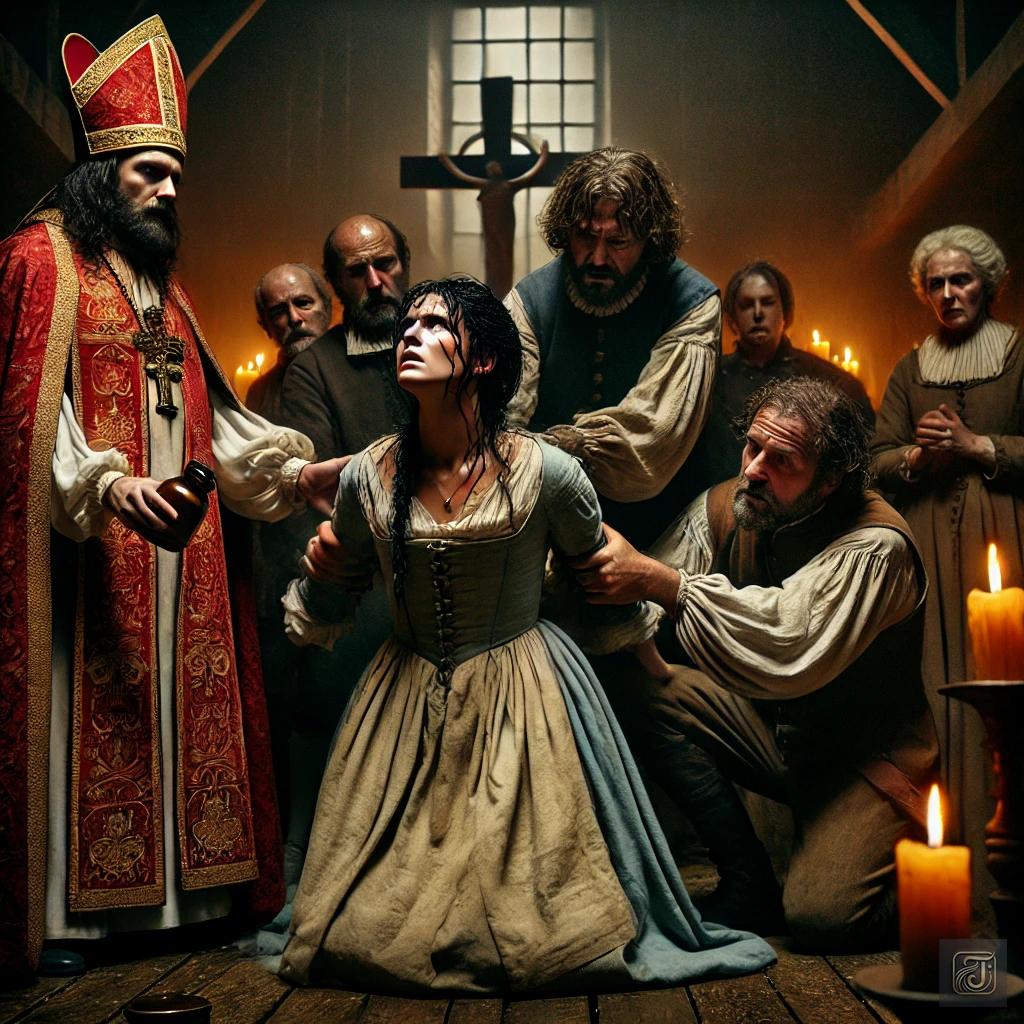
Isabeau:
“Why?”
“That remedy can save everyone!”
“No one else needs to die anymore!”
Bishop:
“Silence, servant of the devil!”
That night, Isabeau was locked away in the church’s underground dungeon.
In the darkness of the room, she quietly shed tears, yet she held firmly to her convictions.
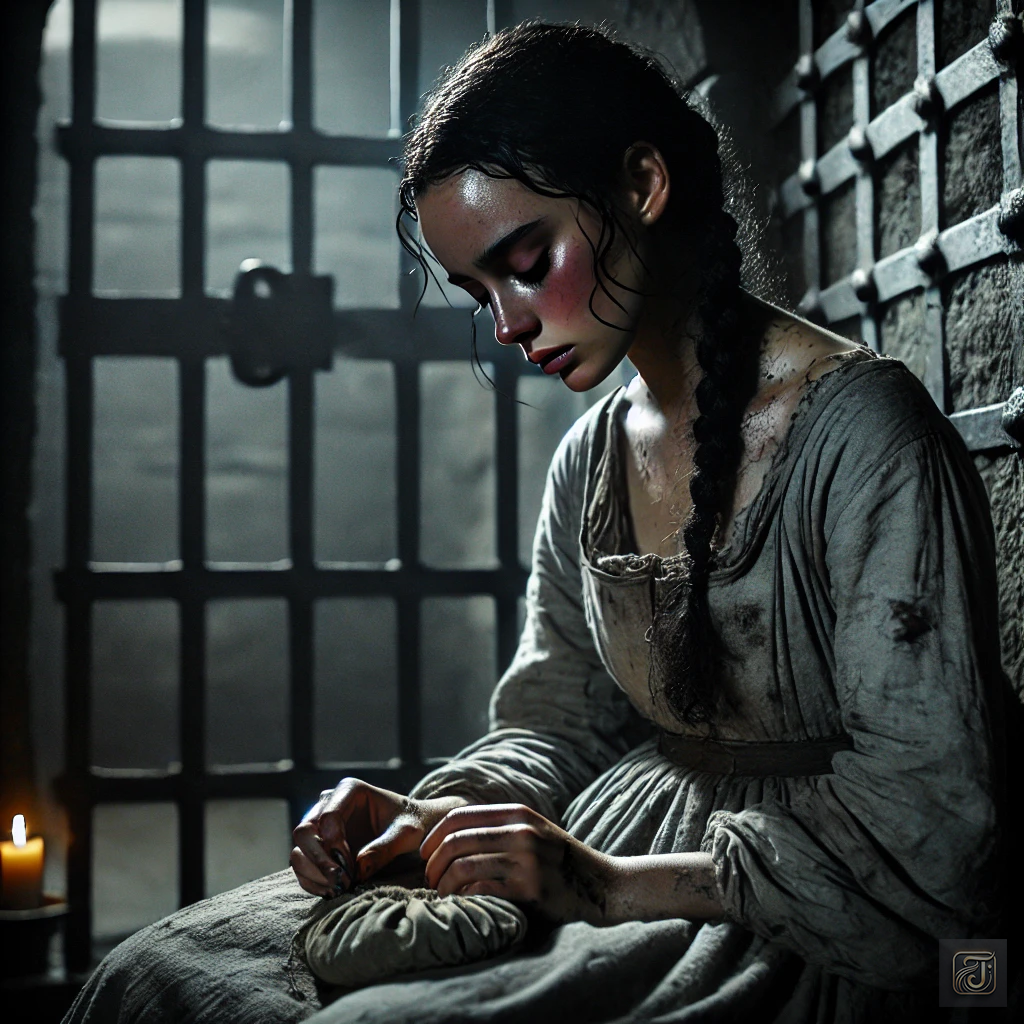
Isabeau:
“I am not a witch.”
“My knowledge is meant to save the village…”
“Even if this body is burned, I believe this medicine will save the village.”
Chapter 13: The Accusation and Fate of Isabeau
The Target of Suspicion
The bishop summoned Isabeau and began to interrogate her.
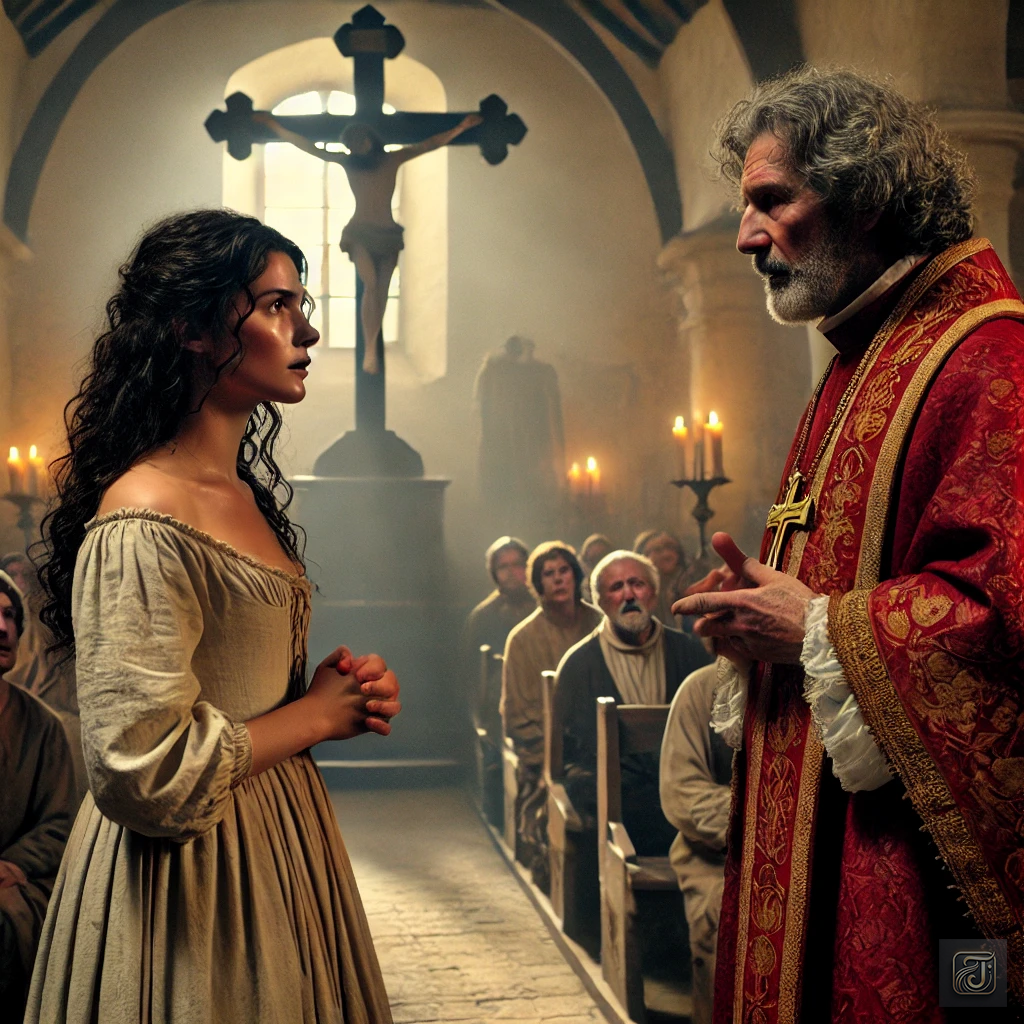
Bishop:
“Isabeau, have you not used your suspicious remedies to bring calamity upon this village?”
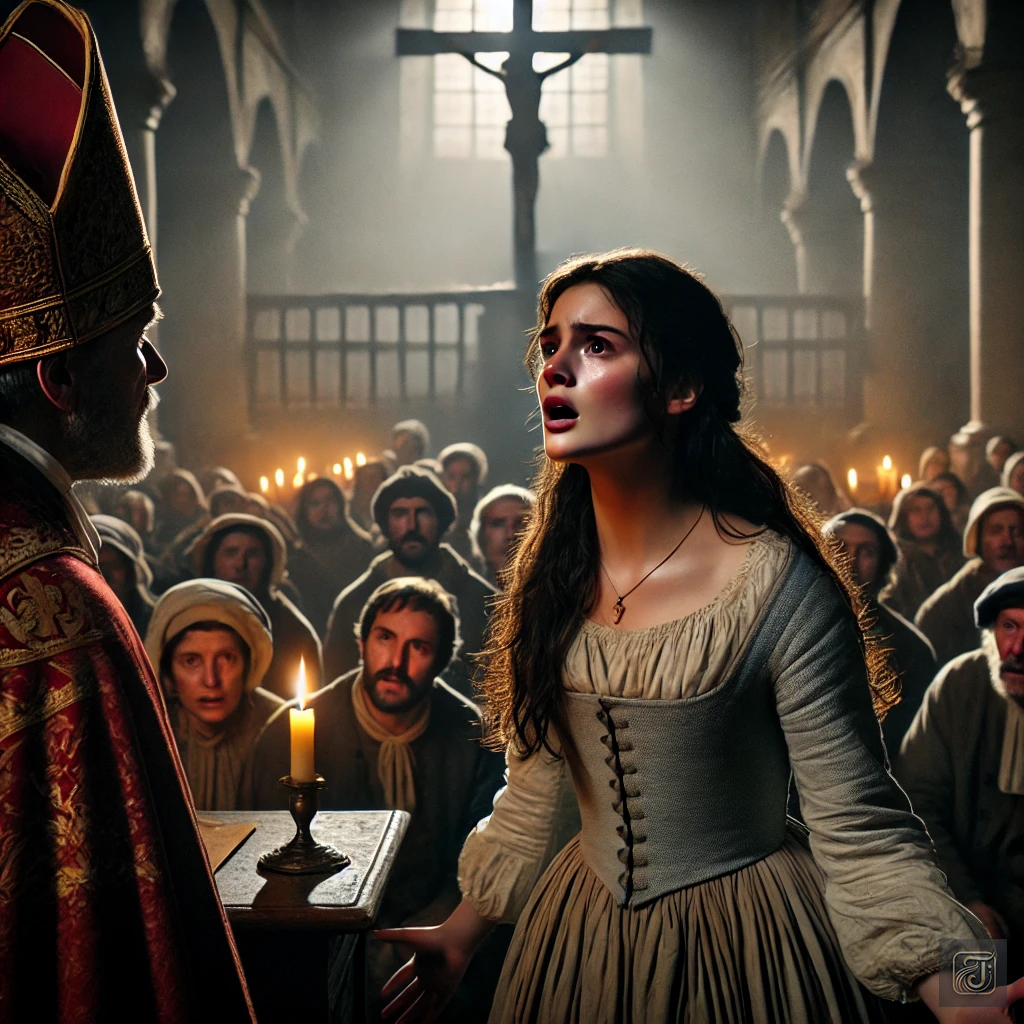
Isabeau:
“I have only been treating people.”
“I have brought no calamities upon anyone.”
“And now, I have finally completed a remedy to cure the illness tormenting the village.”
“This village and everyone in it can be saved.”
“No one else needs to die anymore.”
However, the bishop didn’t admit to acknowledging this—It was absolutely impossible to admit.If they admitted that the calamities striking the village were not the work of the devil, but merely disease or pollution, it would mean acknowledging that everything he had said until now was a lie.
To protect his position, the bishop simply could not admit such an admission.
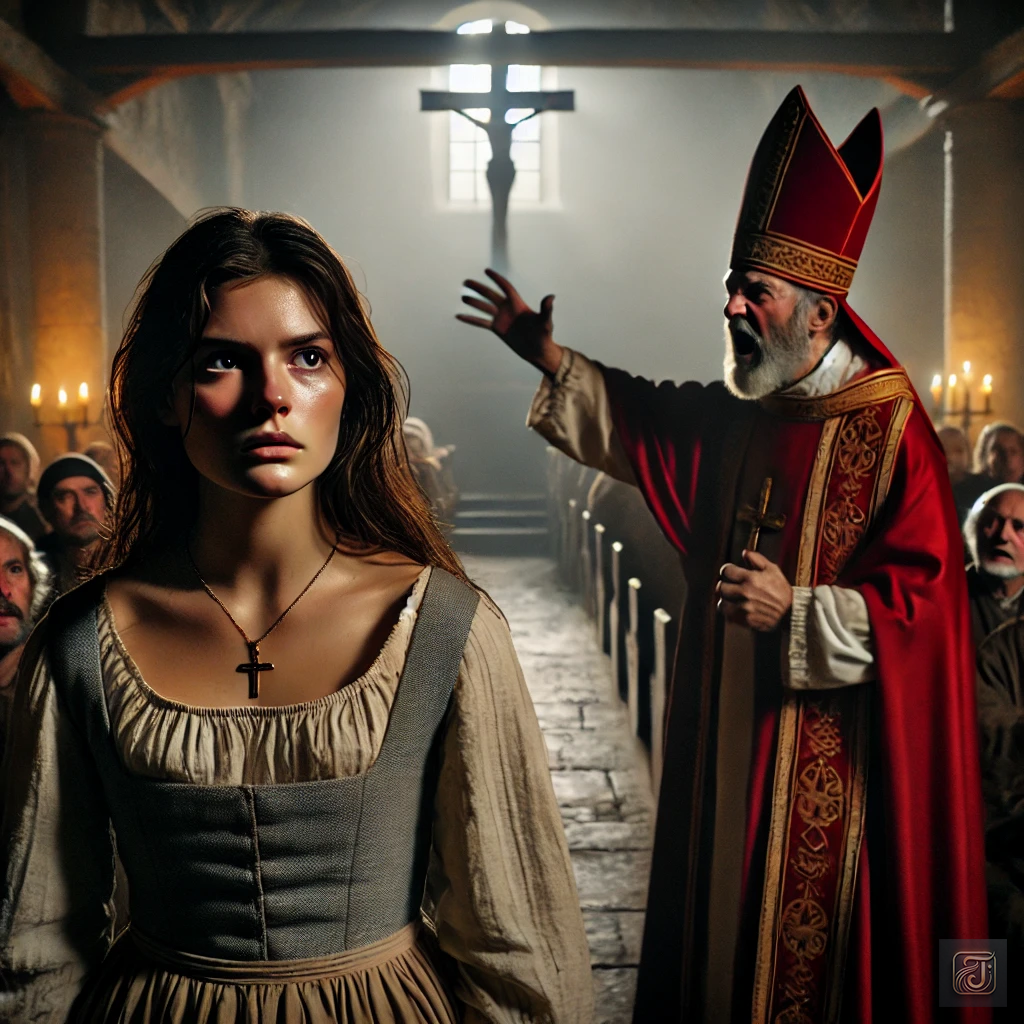
Bishop:
“Do not be deceived!”
“She intends to bring calamity upon this village with that remedy she received from the devil!”
Bishop’s thoughts:
(This is for the best.)
(All of this is to preserve order in the village.)
(If the devil’s existence is denied, everything will fall apart…)
(This is the only choice for the good of everyone in this village.)
The bishop justified his actions by convincing himself that it was to preserve the village’s order, masking his motives of self-preservation.
The Trial and Torture
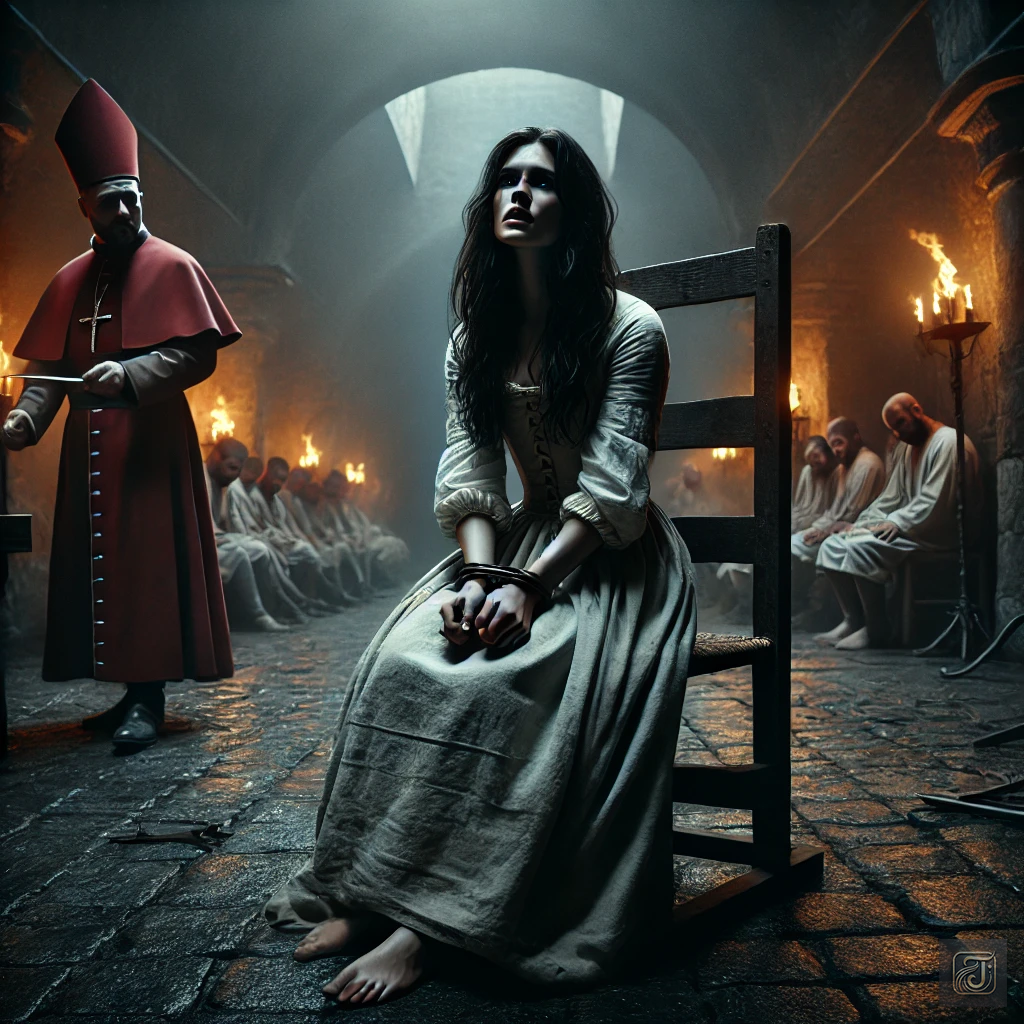
Isabeau was taken to the church’s dungeon, where she was subjected to needle pricks and torture.
Her cries echoed through the dark, cold walls of the underground chamber.
As her pleas resonated in the dungeon, the flickering candlelight reflected her unwavering resolve and unbroken spirit.
Her voice carried profound sorrow, intertwined with a heartfelt determination to save the village.

Isabeau:
“I am innocent!”
“I have made no pact with the devil, as you claim!”
Despite the severe torture she endured, she cried out with unwavering determination.
She was different from the other victims.
No matter how brutal the torment, she never wavered in her resolve nor gave a false confession.
Instead, she said:
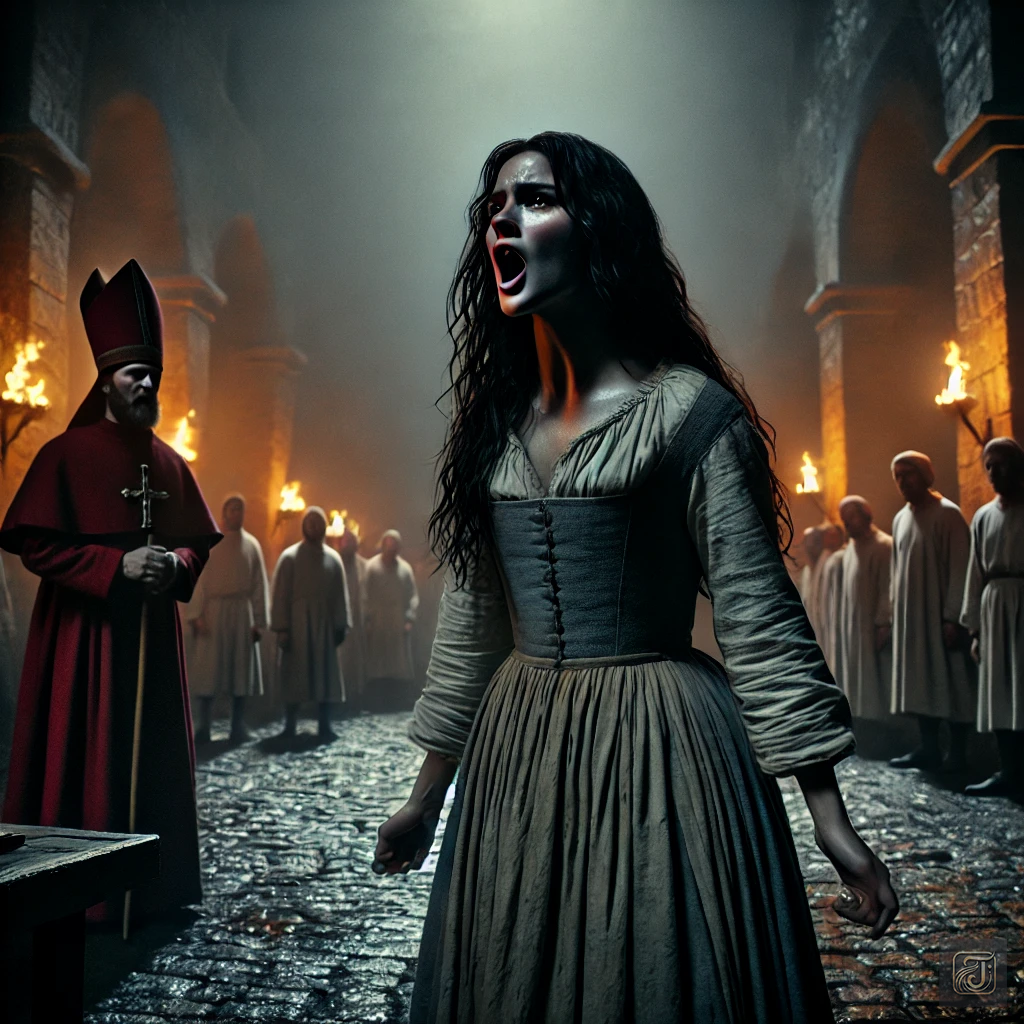
Isabeau:
“…Very well.”
“But I am not a witch.”
“And there is no falsehood in my words when I say I want to save this village.”
“So, if burning me will truly save the village, then do not hesitate—burn me.”

Isabeau:
“But think well about this!”
“You have burned so many innocent people before!”
“Who has truly been saved by those actions?”
“Has even one person been truly saved?”
These words struck deep into the hearts of the villagers.
The air in the dungeon grew heavy as the villagers exchanged glances, yet none could find the words to respond.
A murmur rippled through the crowd, only to be followed by a moment of profound silence.
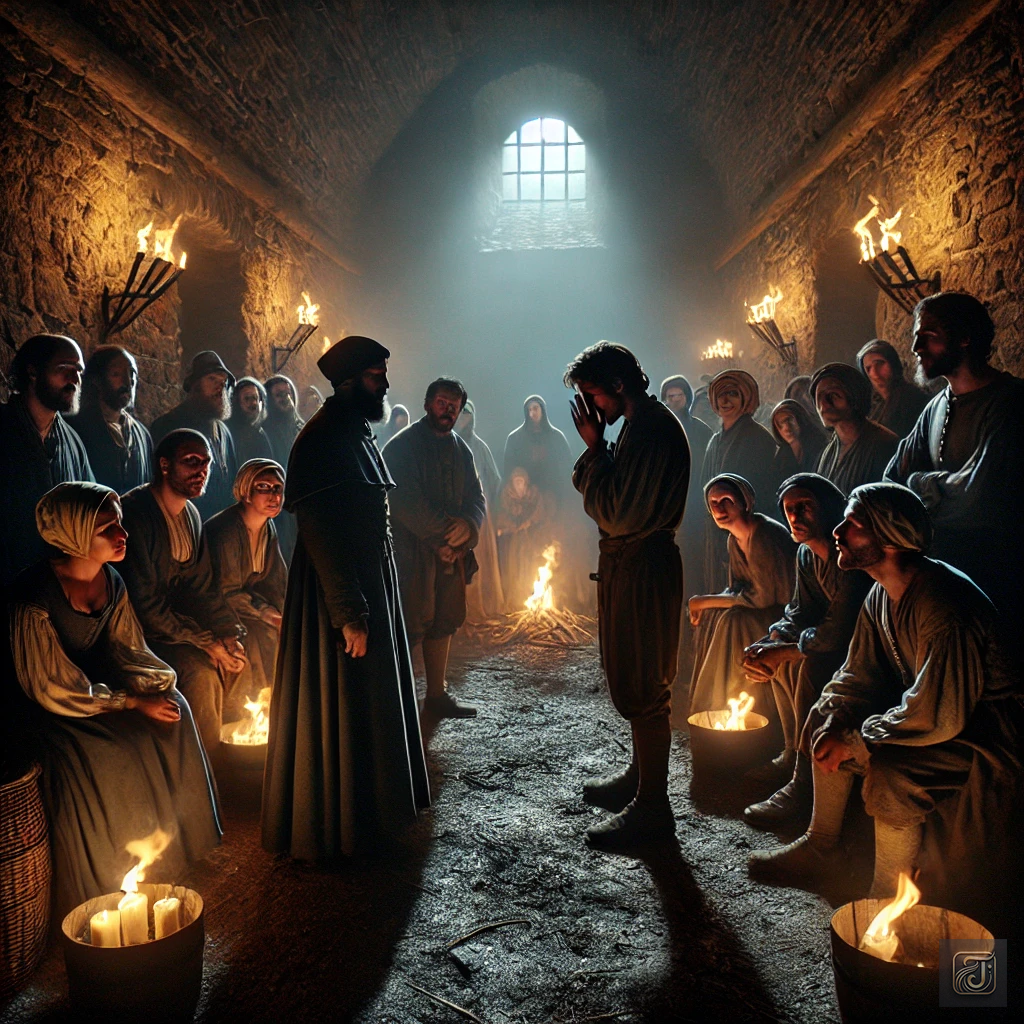
Villager 1:
“Indeed, we’ve executed witches, but who has truly been saved by it?”
“If that’s the case, what have we been doing all this time…?”
Villager 2:
“Perhaps the devil… doesn’t really exist at all…”
Isabeau’s words quietly shook the fear and doubt that had taken root in the villagers’ hearts, forcing them to confront the truth.
In that moment, her cries became more than mere words—they transformed into the voice of a soul seeking truth, stirring the villagers to the brink of action.
Their hearts were on the verge of being moved by her words.
Fearing this, the bishop hastened her execution to protect his own position.
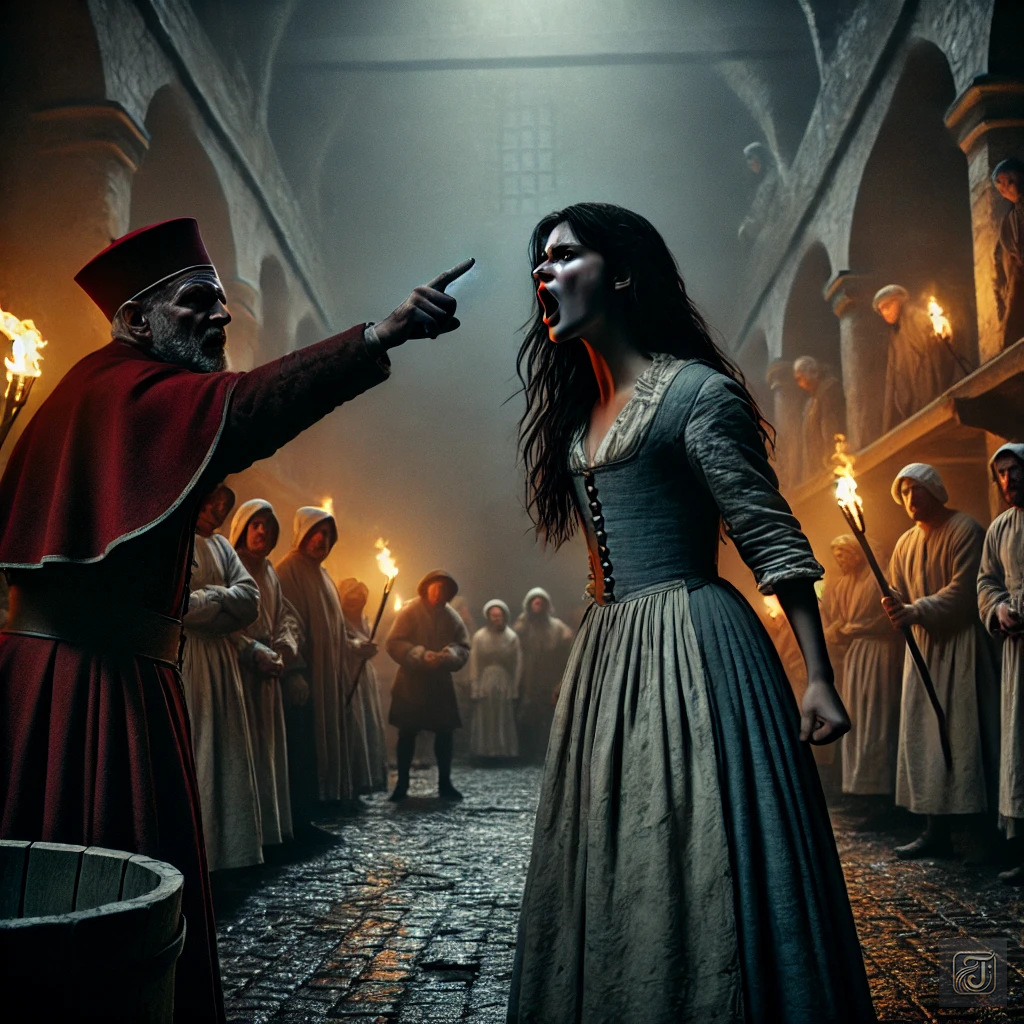
Bishop:
“Do not be swayed by the words of a witch!”
“This witch is dangerous!”
“She cunningly tempts and deceives people—a witch of the utmost danger!”
“Burn her immediately! Burn her to ashes!”
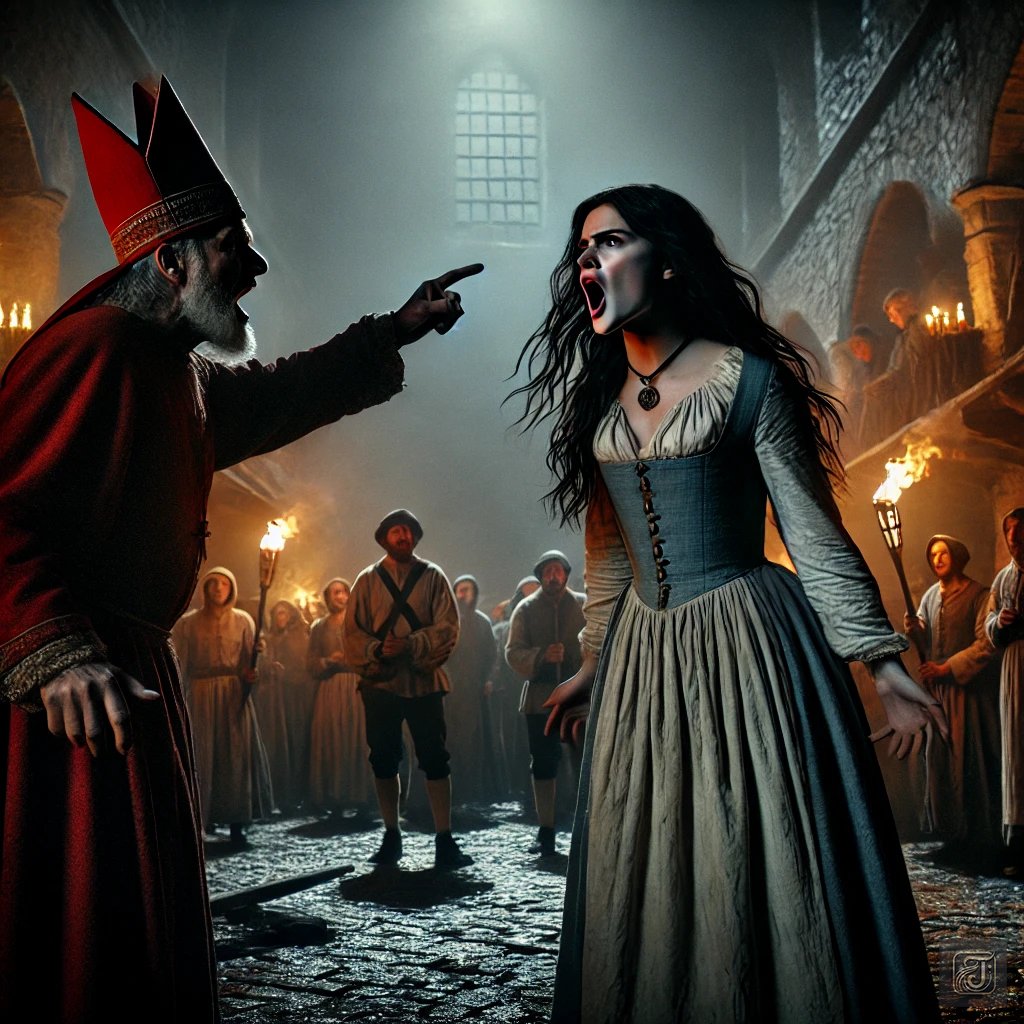
Isabeau:
“Who witch? Who devil? You are the ones executing innocent people! It is you who are the real devils!”
Her Final Words
On the day of her execution, Isabeau looked at the villagers and spoke to them calmly.
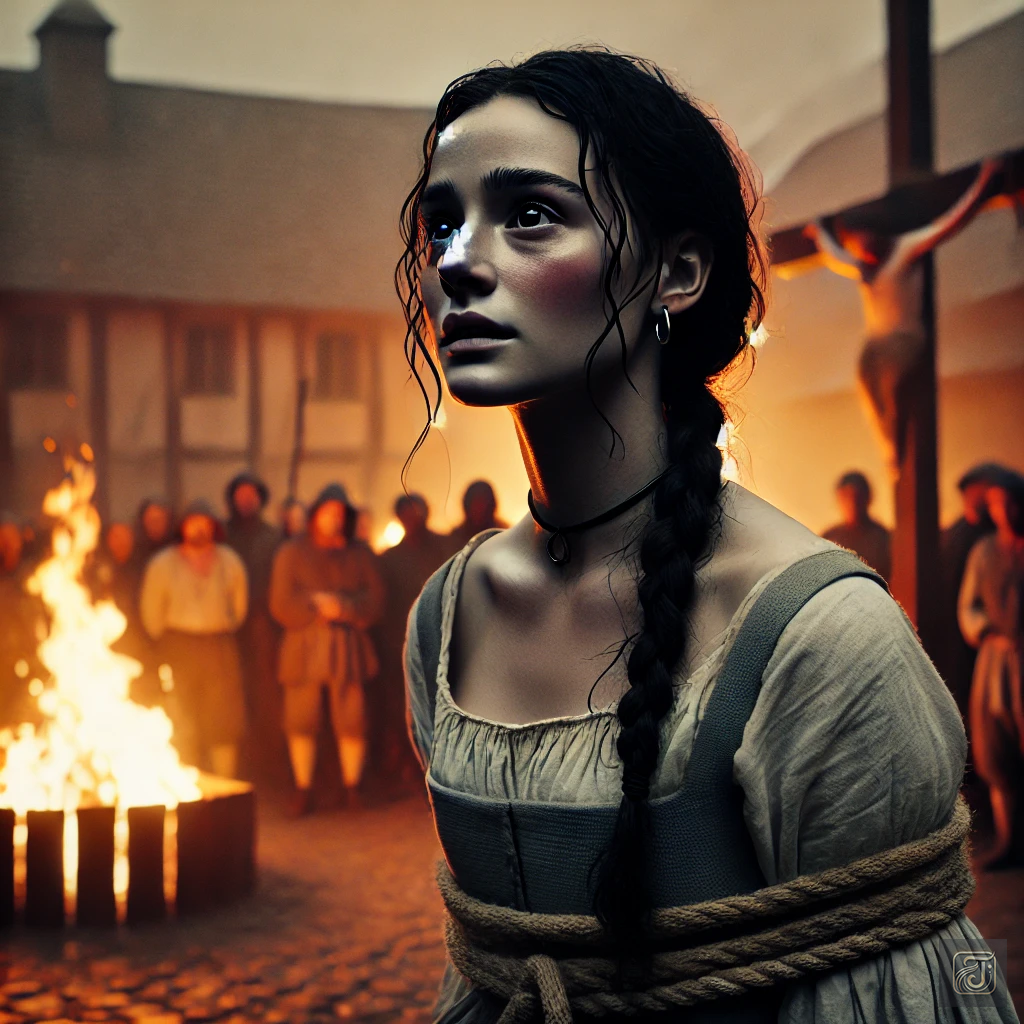
Isabeau:
“I am not a witch.”
“Burning me is nothing more than your fear and weakness of heart.”
“Until you overcome this heart’s weakness, you will continue to create more victims.”
As the flames engulfed her, Isabeau’s words were etched deeply into the hearts of the villagers.
Chapter 14: The Unending Doubt
A few days after Isabeau’s execution, the atmosphere in the village remained heavy and oppressive.
The doubts in the villagers’ hearts only grew stronger.
They began to realize that Isabeau’s execution had changed nothing, but that realization was overshadowed by their lingering fear and uncertainty.
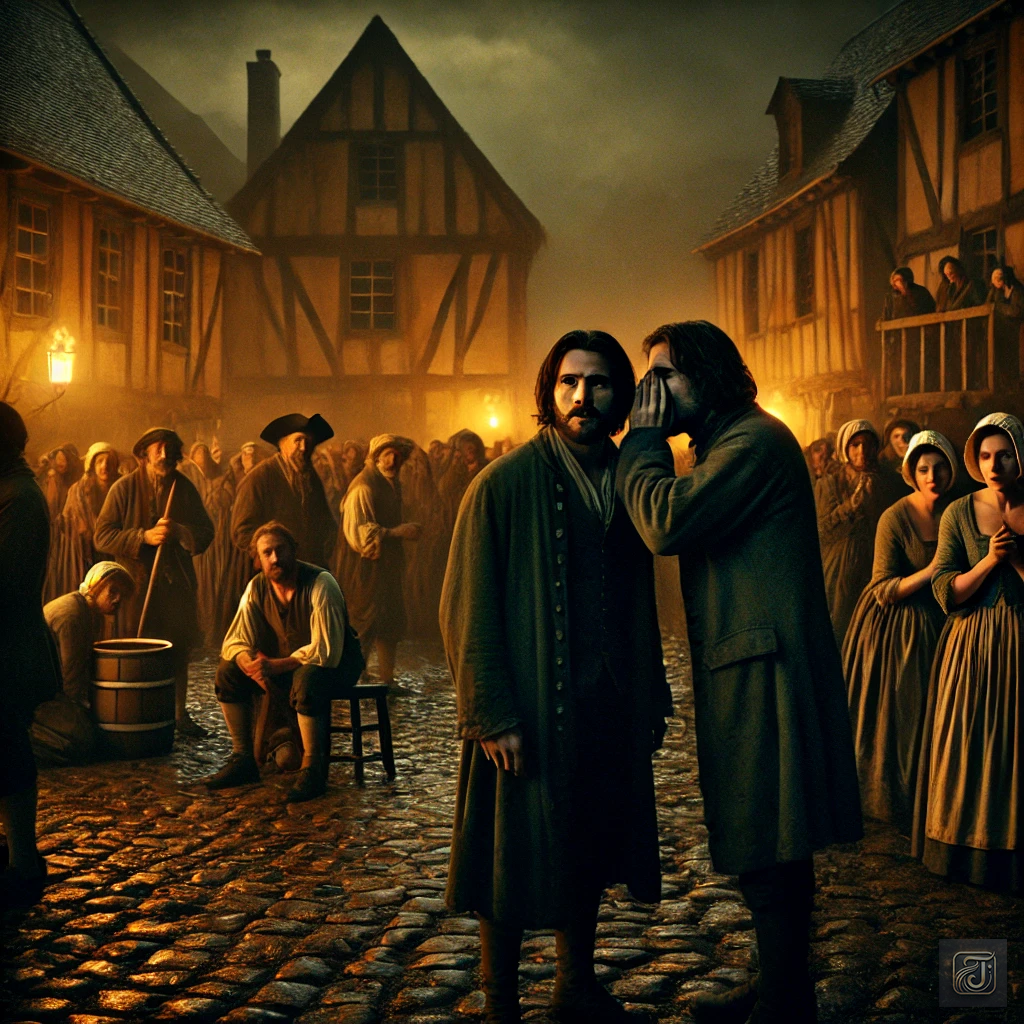
Villager 1:
“Who’s next? It might be our turn to be suspected.”
Villager 2:
“Burning someone hasn’t stopped the calamities…”
“We’ve sacrificed so many already, and yet nothing has changed.”
“The devil doesn’t even truly exist, does it?”
Villager 3:
“Be quiet!”
“If you say that, you’ll be the next one accused of being a devil!”
Villager 2:
“But think about it.”
“What if the cause of these calamities isn’t the devil, but simply illness or natural disasters?”
“Why have we been burning people… for what reason?”
The Tense Atmosphere in the Church

Amid the villagers’ lingering unease and silence, the flickering candlelight in the church cast trembling shadows, as fear and doubt continued to spread.
Even after Isabeau’s execution, the ongoing calamities and pervasive anxiety deeply unsettled the villagers, cracking the foundation of their beliefs.
Fear of becoming the next victim mixed with the lingering echoes of Isabeau’s words, leaving their hearts restless.
In this unstable atmosphere, some among them quietly began to question the truth.
The Arrival of a New Priest
One day, a young priest from the city arrived in the village.
Having been influenced by Enlightenment ideals, he deeply understood the irrationality of witch hunts.
Upon his arrival, he looked at the dilapidated village church and let out a heavy sigh.
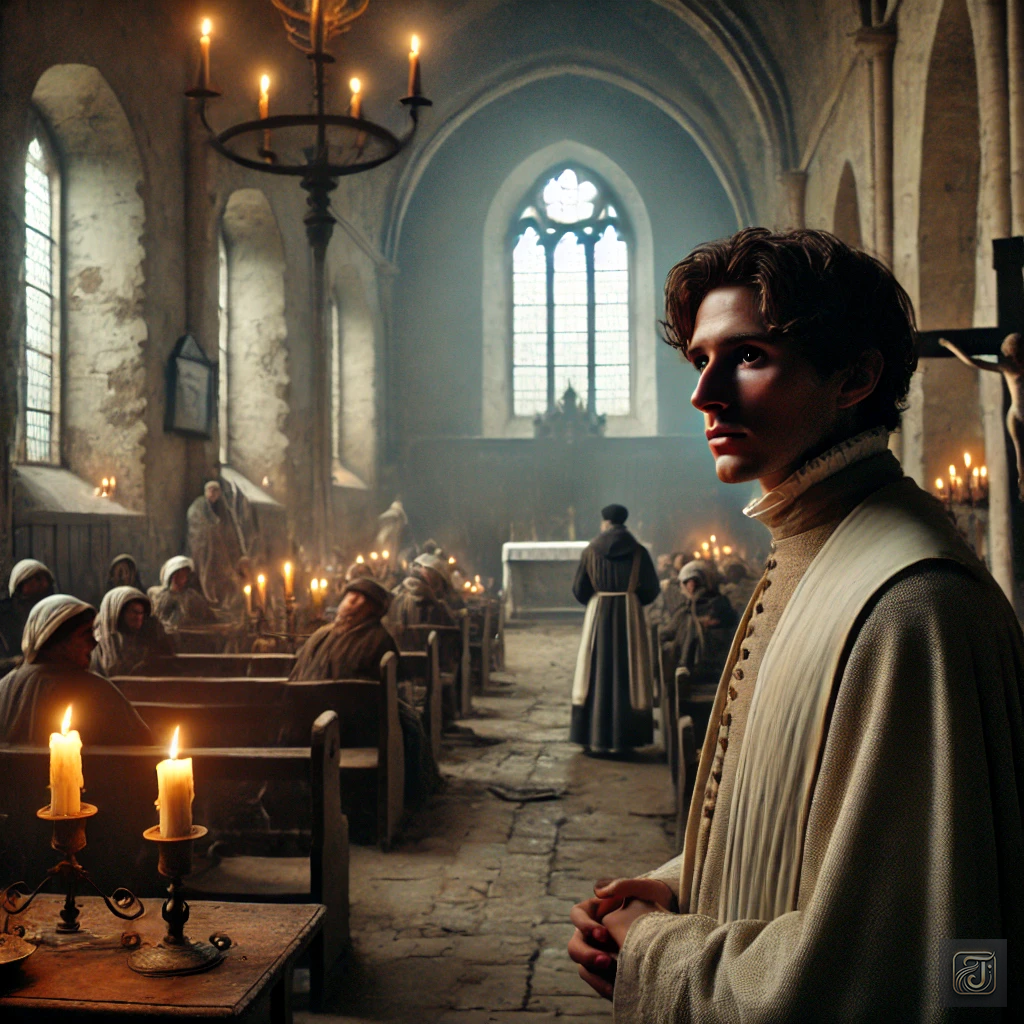
New Priest:
“This place is burdened with layers of fear.”
“It has been ruled not by faith in God, but by fear.”
He observed the lives of the villagers and noticed that fear continued to divide them.
Distrust lingered in the air, as neighbors struggled to trust one another and suspicion permeated their interactions.
Amid the growing unease and mistrust among the villagers, the young priest could not shake the sense of foreboding in his heart.
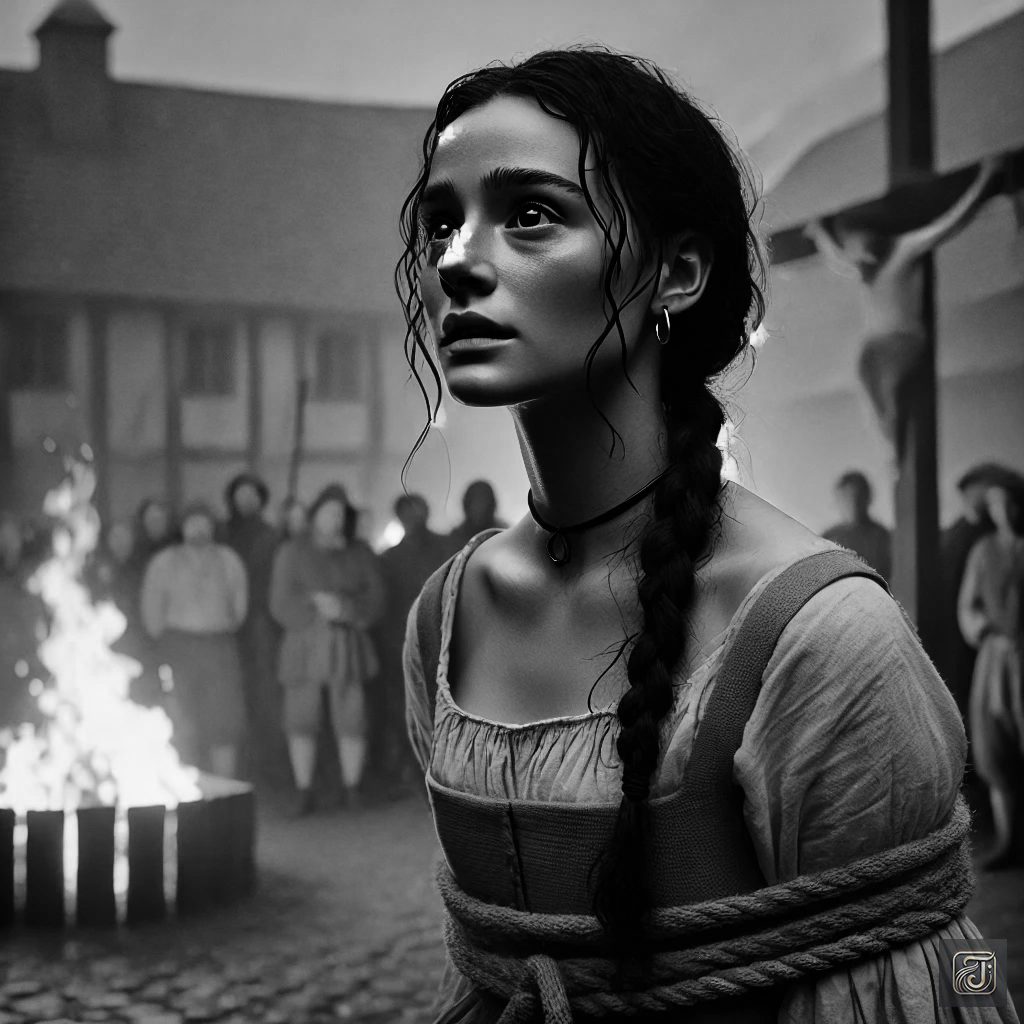
Isabeau’s Final Words:
“Burning me is nothing more than your fear and weakness of heart.”
“Until you overcome this heart’s weakness, you will continue to create more victims.”
These words lingered in his mind, refusing to fade.
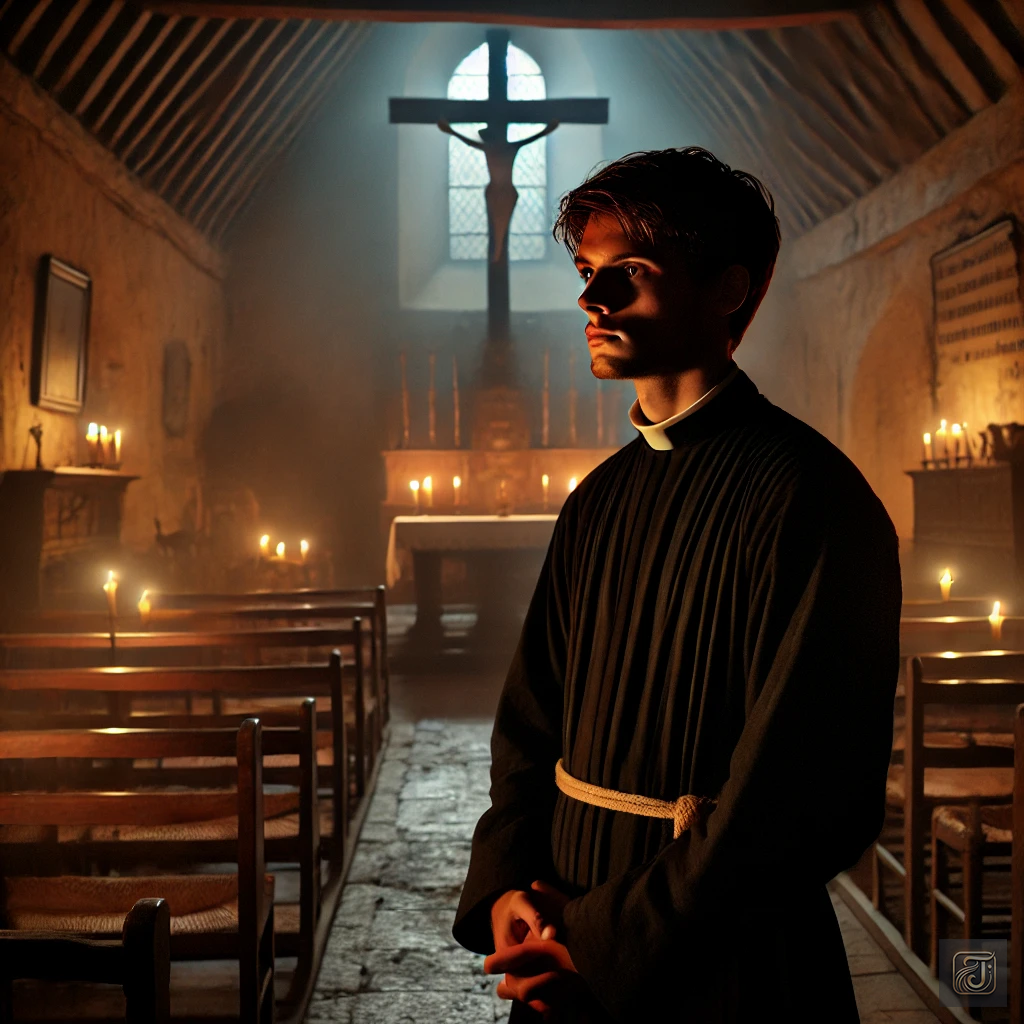
Young priest:
“Something is wrong…”
“This cannot be God’s will.”
“I must uncover the truth.”
That night, the young priest, mustering his courage, confessed to the new priest everything they had done up to that point.
A Conversation in the Church at Night
The flames of the church’s candles flickered, and in the stillness of the night, only the voices of the two priests echoed.
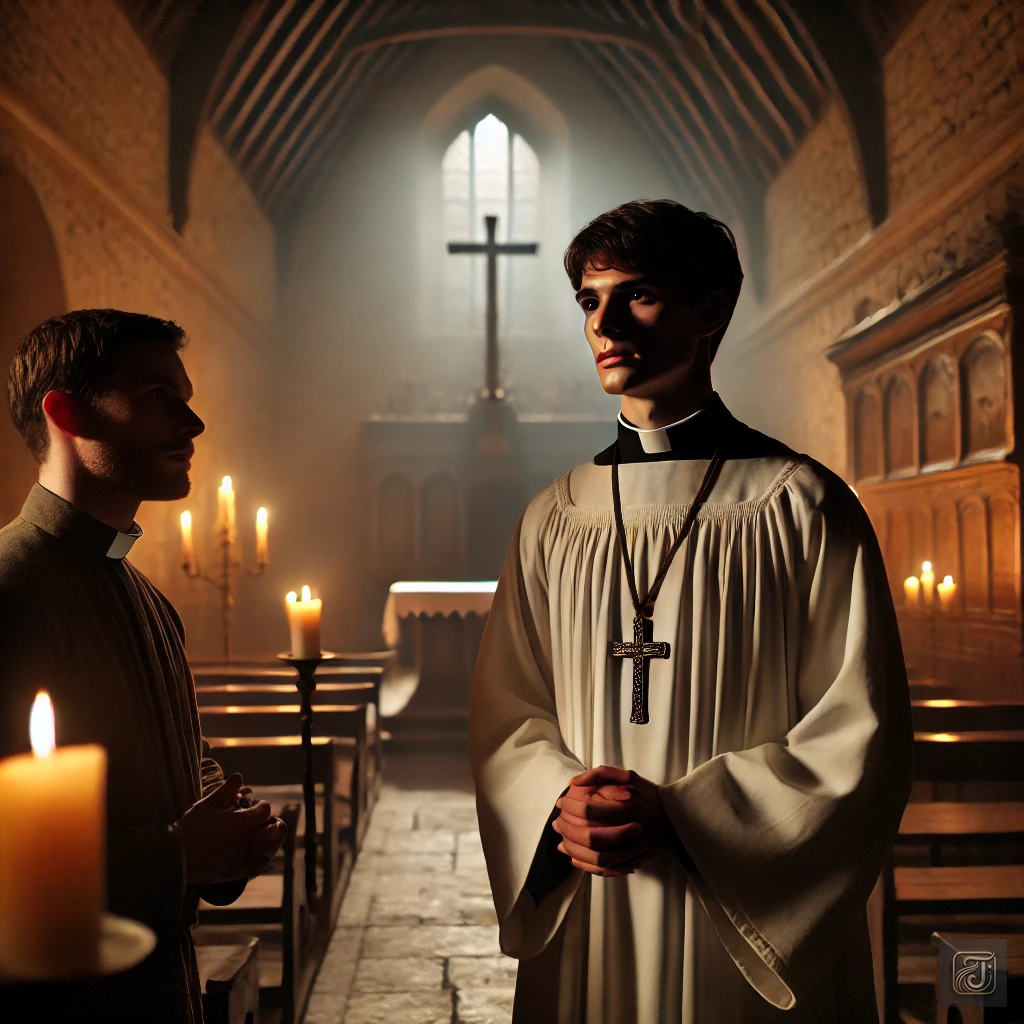
Young Priest:
“The bishop has always said it.”
“‘Condemning witches is God’s will.'”
“We believed that and sacrificed countless innocent lives.”
New Priest:
“But could God truly desire such things?”
“Did the bishop truly say that it was God’s will?”
“God would never give such commands.”
“His teachings are of compassion and forgiveness.”
“Actions that go against these cannot be righteous.”
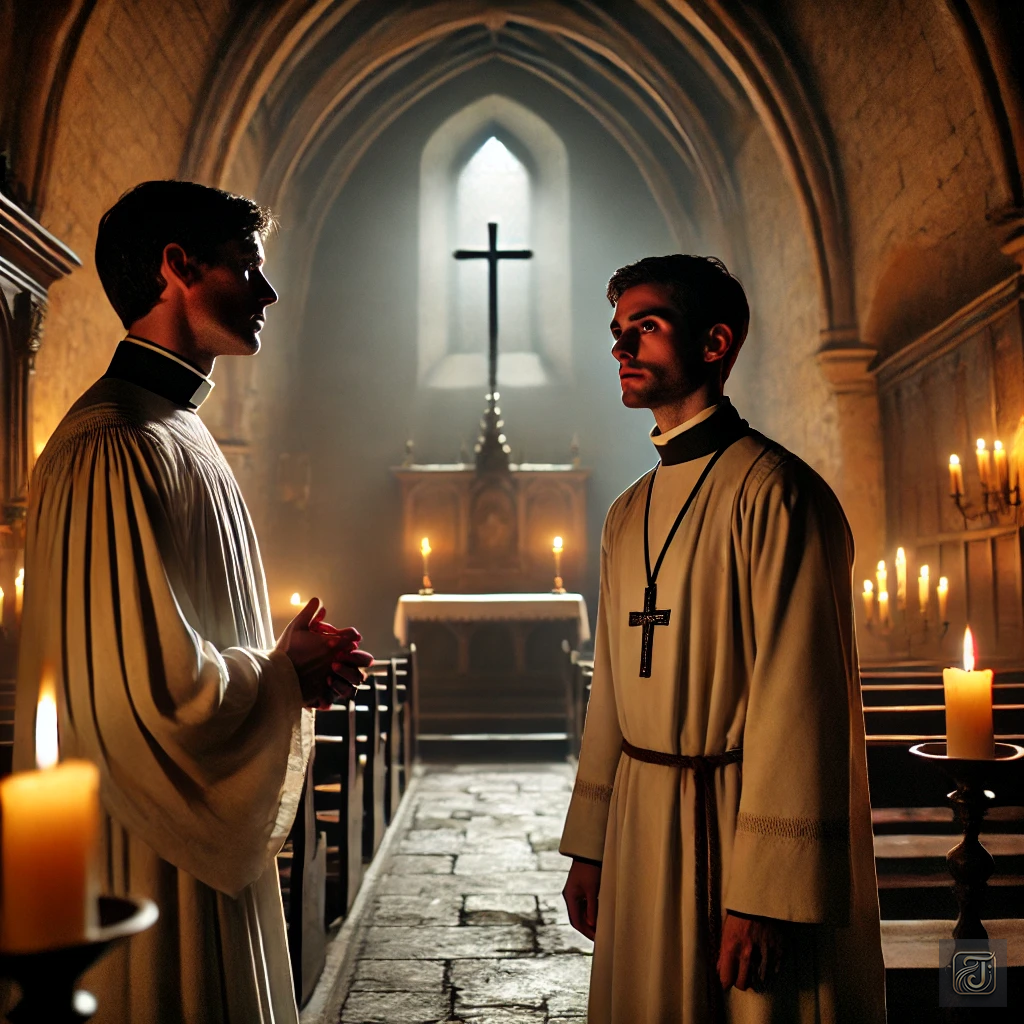
The Pursuit of Truth
New Priest:
“The bishop must know this as well.”
“If he continues such actions despite that, there must be another reason behind it.”
Young Priest:
“Then, everything we have done so far…”
New Priest:
“What we must do now is not deny the past, but uncover the truth and prevent any more innocent victims.”
As the candlelight flickered against the church walls, the two priests resolved to seek out the truth and take action.
Chapter 15: The Bishop’s Guilt and the Unveiling of Truth
The Discovery of Crucial Evidence
The Church Archives
Amid the stillness of the night, the new priest and the young priest carefully stepped into the church archives, their footsteps deliberately muffled.

New Priest:
“The bishop’s secrets must be here.”
“There’s no doubt that what he feared so greatly is hidden in this place.”
Young Priest:
“Just being here at this hour is dangerous, but we have no choice if we want to uncover the truth.”
The Key Ring and the Locked Drawer
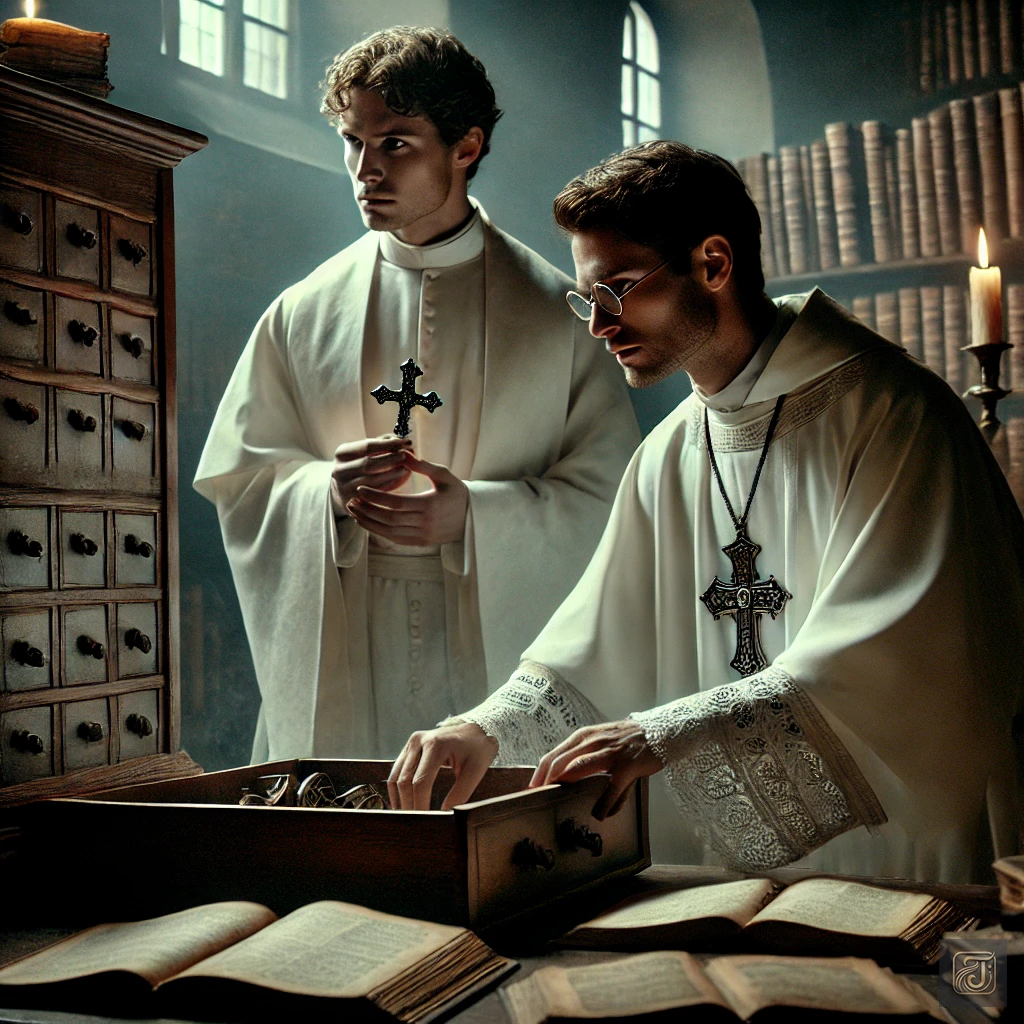
The two priests reached the back of the bishop’s chamber, where they discovered a heavily locked drawer covered in dust.
Young Priest:
“This must be it.”
“The keyring… it must be around here somewhere.”
The new priest searched the desk by the wall and found a key ring.
Though his hands trembled, he carefully inserted the key into the lock.
New Priest:
“All the answers must be in here.”
As the drawer opened, several aged letters lay inside, neatly arranged.
The Discovery of the Letters
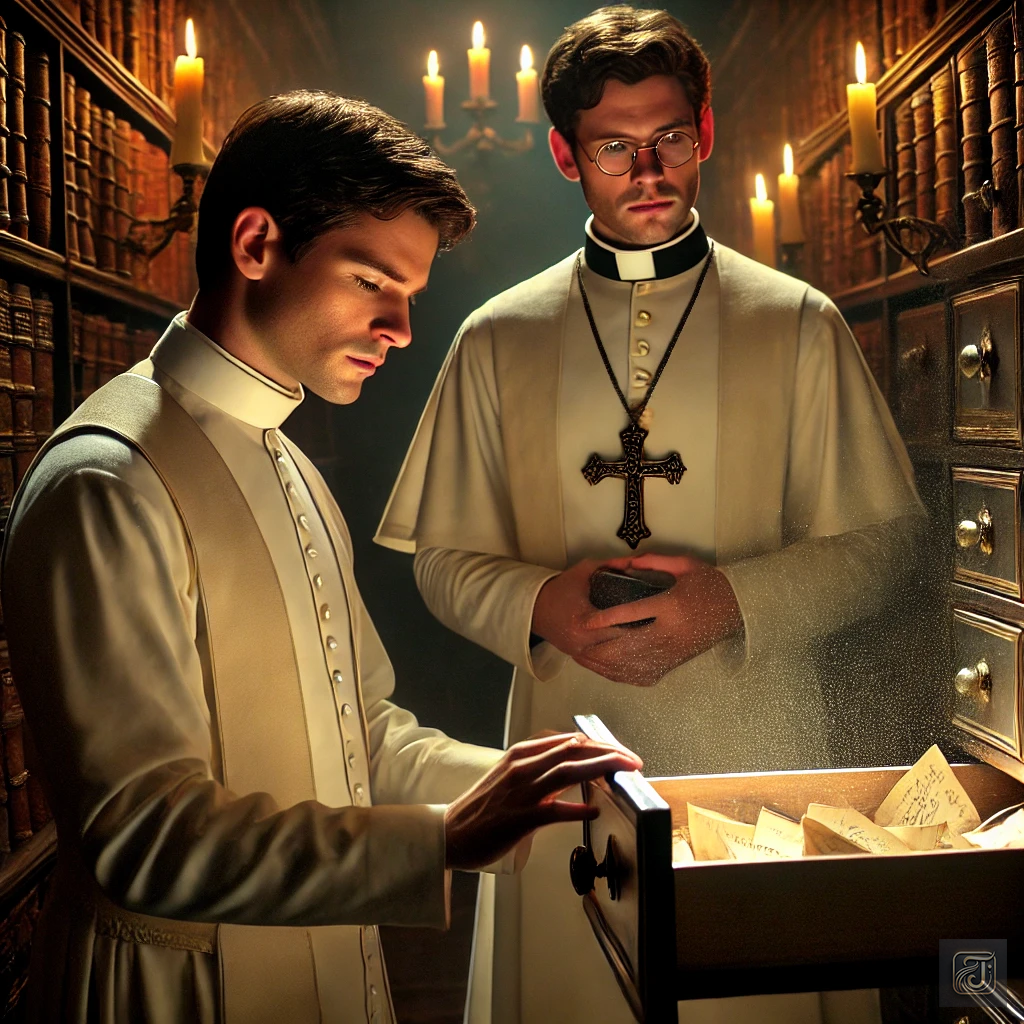
The young priest picked up one of the letters and held it up to the lamp’s light, reading the words aloud.
Young Priest:
“This is… correspondence with the powerful figures of the region.”
Brushing off the dust, he carefully read through each letter, one by one.
The Contents of the Letters
The Letter from a Noble to the Bishop:
“Bishop, Adèle’s land has been successfully seized.”
“Her execution has quelled much of the villagers’ unrest.”
The Bishop’s Reply:
“Excellent work.”
“Fear is the key to maintaining order.”
“The next target is Geneviève.”
“We must secure her land as well.”
The Noble’s Demand to the Bishop:
“Half of the property seized from those executed must be handed over to my estate, as agreed.”
“Fail to honor this, and you will face the consequences.”
The Reactions of the Two Priests

Young Priest:
“This… this was the bishop’s true intention all along?”
“Everything we did, everything we believed to be God’s will, was nothing more than a selfish scheme…”
New Priest:
“This is an unforgivable act.”
“We must reveal the truth and show these letters to the villagers.”
“They deserve to know the depth of this betrayal.”
The lamp’s glow illuminated their earnest expressions, and a heavy silence filled the church archives.
The letters the two priests had uncovered held the key to revealing the true nature of the fear that gripped the village.
Moreover, they were poised to shake the very foundation of the bishop’s authority.
Chapter 15: The Accusation Before the Villagers
The next day, the young priest gathered the villagers in the square, holding the letters aloft as he raised his voice.
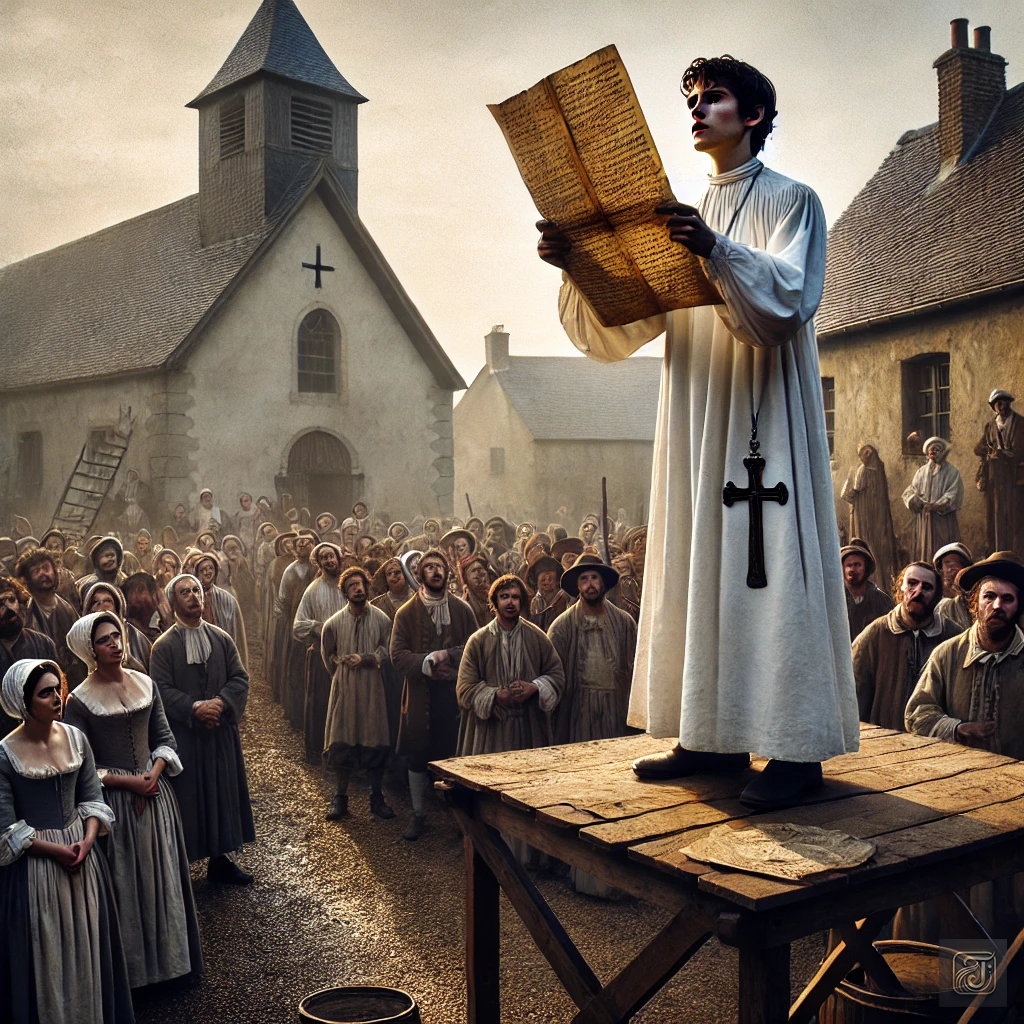
Young Priest:
“Everyone, look at this!”
“These are letters exchanged between the bishop and the nobles!”
Villager 1:
“Letters, you say?”
“What’s written in them?”
Villager 2:
“Could it be…?”
Young Priest:
“These letters contain proof that the bishop fabricated witch trials to seize the land and property of those executed, sharing the spoils with nobles and officials from other villages!”
The villagers’ anger and doubts erupted all at once, filling the church square with a cacophony of outrage.
The young priest’s unwavering words, backed by undeniable evidence, steadily dismantled the bishop’s defenses.
Villager 1:
“Adèle, Geneviève, Hélène… they were all innocent!”
Villager 2:
“Bishop! You’ve been deceiving the village, haven’t you?”
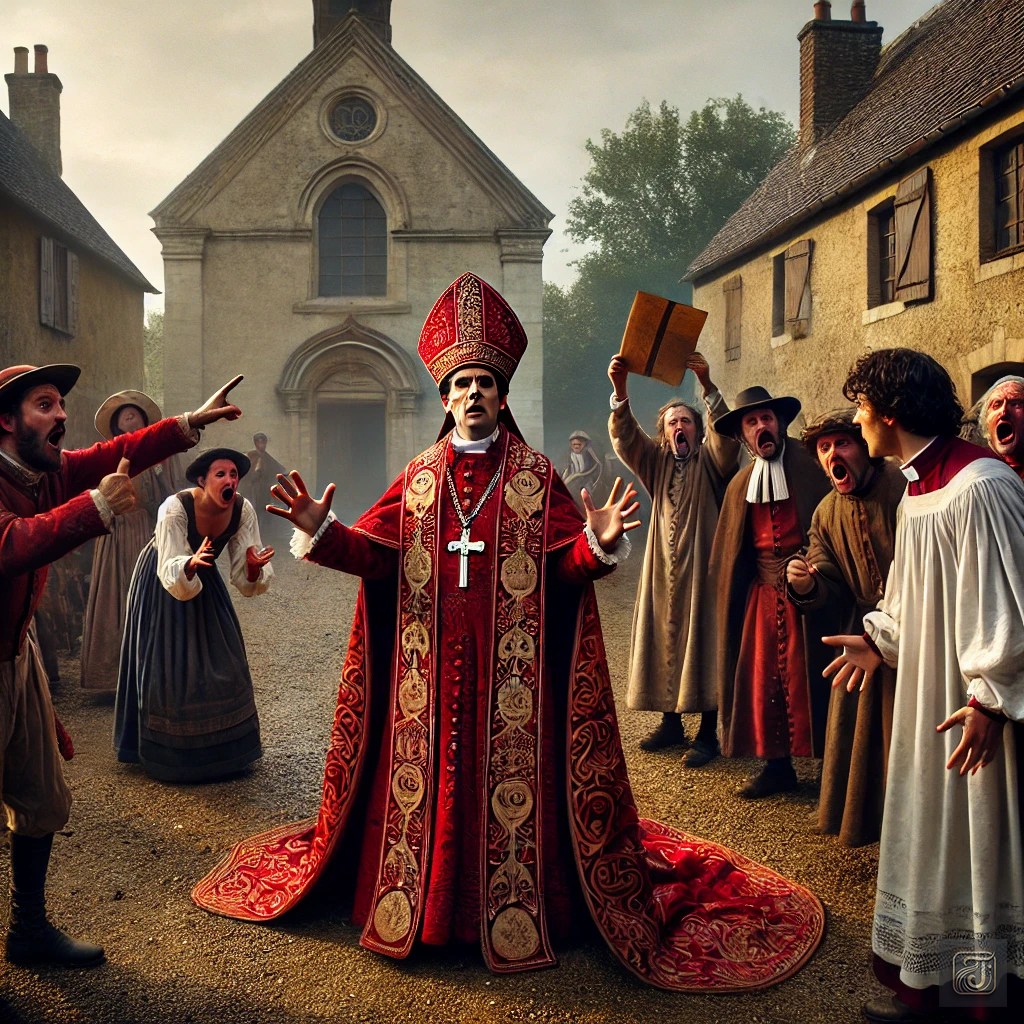
Bishop:
“No!”
“This is a fabrication!”
“A trap to bring me down!”
Young Priest:
“Then what do you say about the signature on these letters?”
“This is unmistakably your own handwriting!”
The villagers, unable to hide their shock and anger, surrounded the bishop.
Villager 1:
“You’ve been deceiving us!”
“Do you have any idea how many lives have been lost because of you?”
Villager 2:
“Bishop! Have you been using God’s name to satisfy your own greed?”
The bishop fell to his knees, covering his face with trembling hands.
The color drained from his face, and the once authoritative figure was now a mere shadow of his former self.
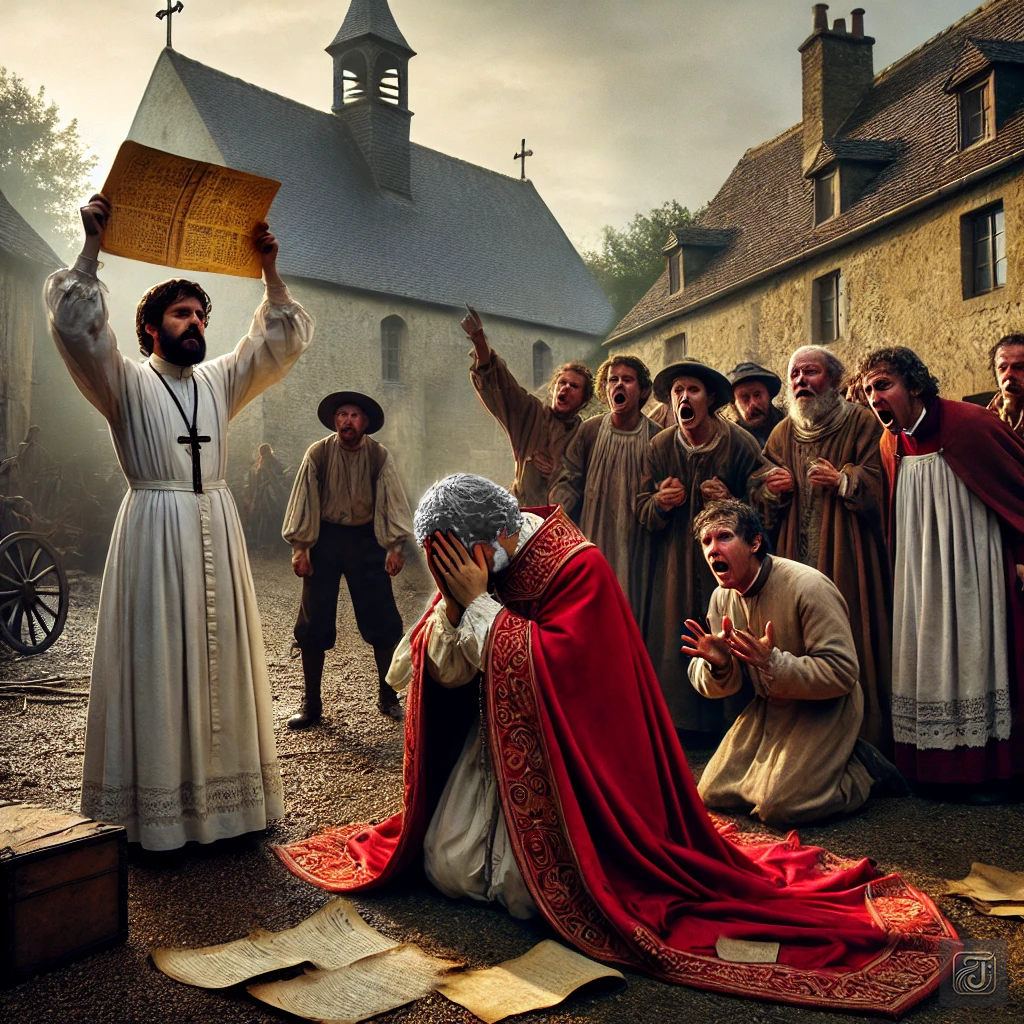
Villager 1:
“I… I did it for the village…”
Villager 2:
“Don’t be ridiculous!”
“If you truly cared about the village, you should have abandoned your ties with the nobles and officials from other villages! and told everyone the truth!”
“Is hiding the truth and ruling through fear what you call God’s will?”
As sunlight illuminated the square, the murmurs of the villagers echoed against the church walls.
The bishop’s lies were exposed, and the villagers began to realize the weight of the sacrifices made and the trust that had been lost.
This marked the first step toward transforming the entire village.
Chapter 16: The Condemnation and Exile of the Bishop
The Villagers’ Fury and the Moment of Exile

Villager 3:
“You used fear to manipulate us, didn’t you!”
“You are the real devil!”
Surrounded by the villagers, the bishop continued to shout until the very end.
Bishop:
“No! I did it for the village…”
“It was to preserve the order of the village!”
But the villagers did not believe his words.
Villager 1:
“For that so-called order, how many lives have you taken?”
“You are nothing but a greedy hypocrite who sold your soul to the devil for your own gain!”
The villagers seized the bishop and dragged him out of the church.
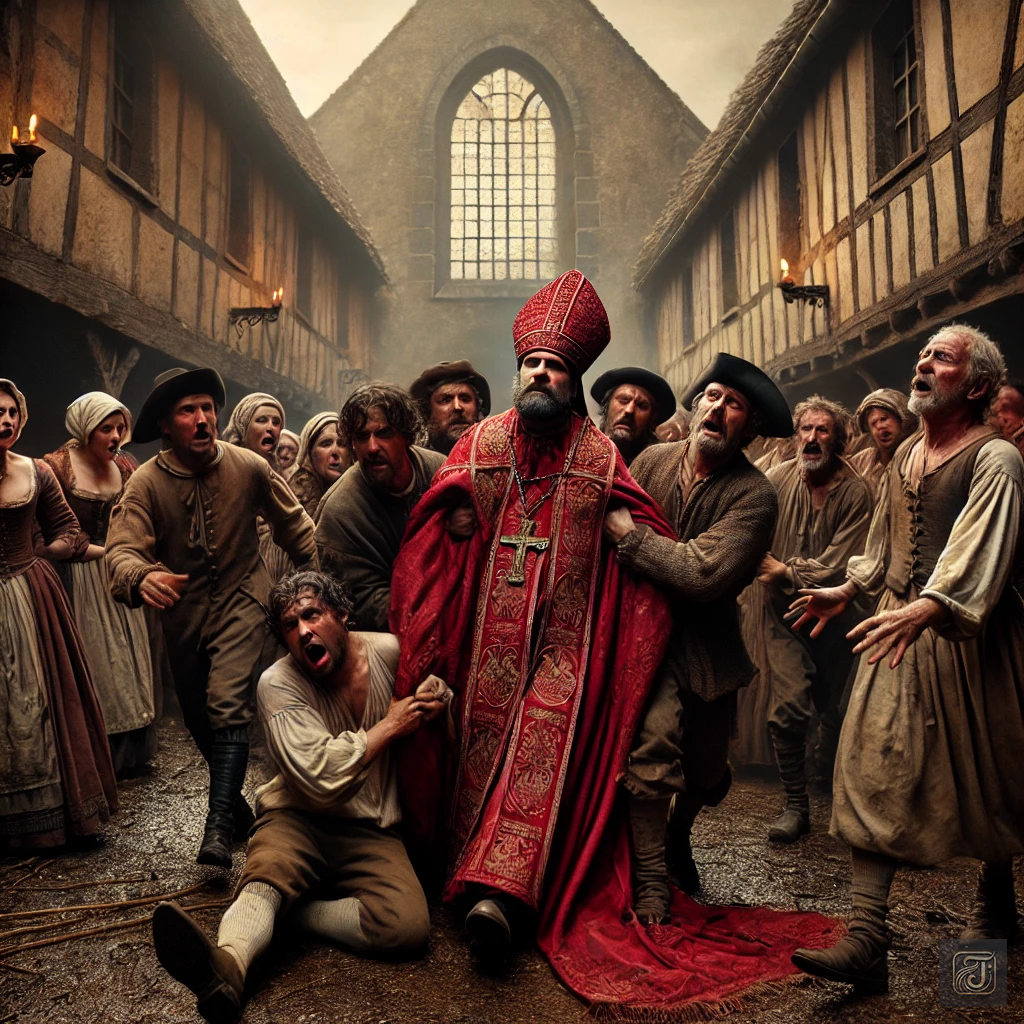
Villager 1:
“Bishop, you have no right to remain in this village!”
Villager 2:
“Leave!”
“And never come back!”
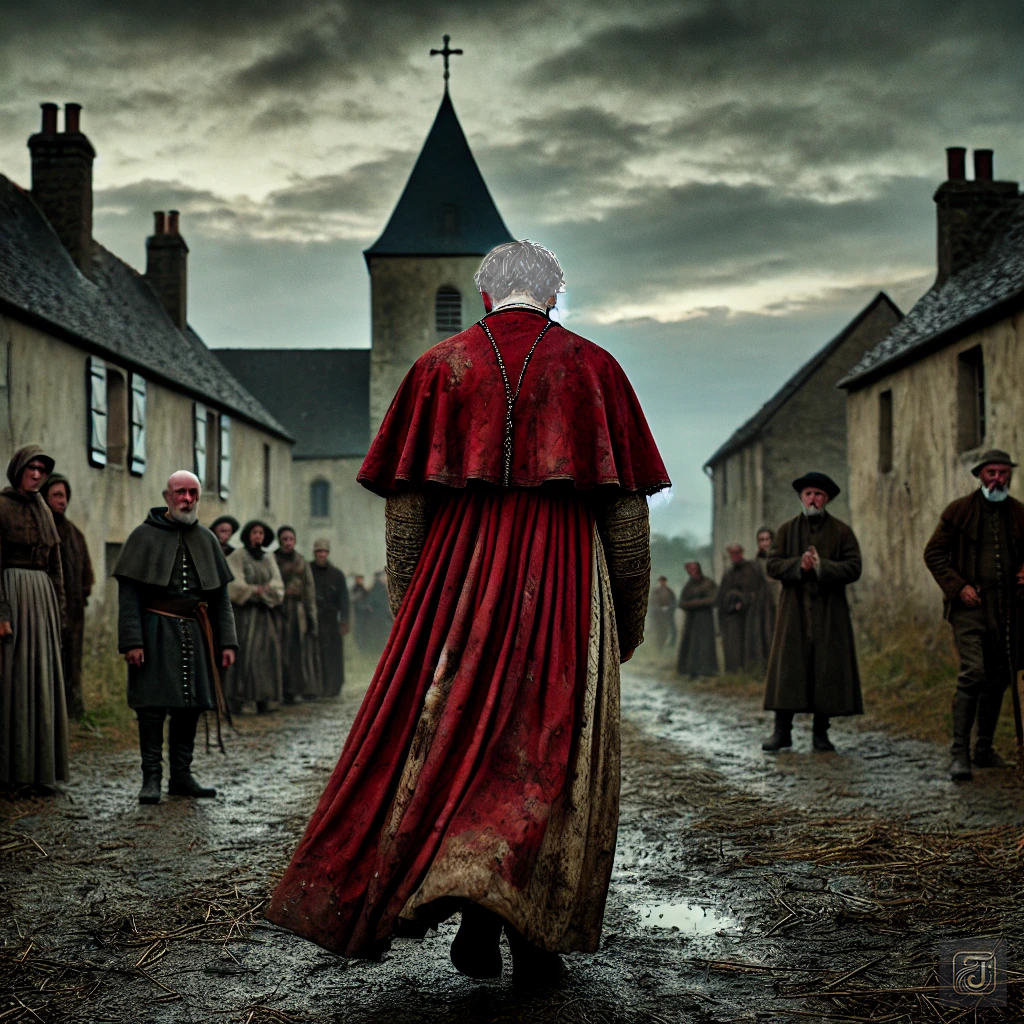
Thus, the bishop was exiled from the village.
His once-majestic robes were soiled, and the commanding expression he once wore was now gone without a trace.
Dragging his feet, the bishop made his way toward the outskirts of the village, his figure growing smaller with each step.
The villagers continued to glare at him with anger until he disappeared entirely from view.
Not a single person followed him, nor did anyone call out to him.
The air in the village remained heavy, and in the long silence that followed, everyone reflected on the events that had unfolded.
The bishop’s exile marked the first step toward ending the era of fear that had loomed over the village.
However, its aftermath remained deeply etched in the hearts of the people, leaving them with heavy burdens they would have to face in the days to come.

Young Priest:
“Was it right not to execute him?”
“He might join forces with the powerful figures from other villages and do the same thing again.”
New Priest:
“The powerful only collaborated with him because he was a bishop and wielded authority.”
“Now that he has lost that power, no one will support him anymore.”
“Besides, even if we were to execute him, Isabeau and the others would never return.”
Chapter 17: The Exiled Bishop’s Solitude and Decay

The Beginning of a Lonely Journey
The exiled bishop, now clad in tattered clothing, wandered aimlessly through the cold winds of the forest.
Once adorned in richly embroidered robes of gold thread and wielding great authority, his former grandeur was nowhere to be seen.
In every village he entered, people averted their eyes, and the sound of doors shutting echoed in his ears.
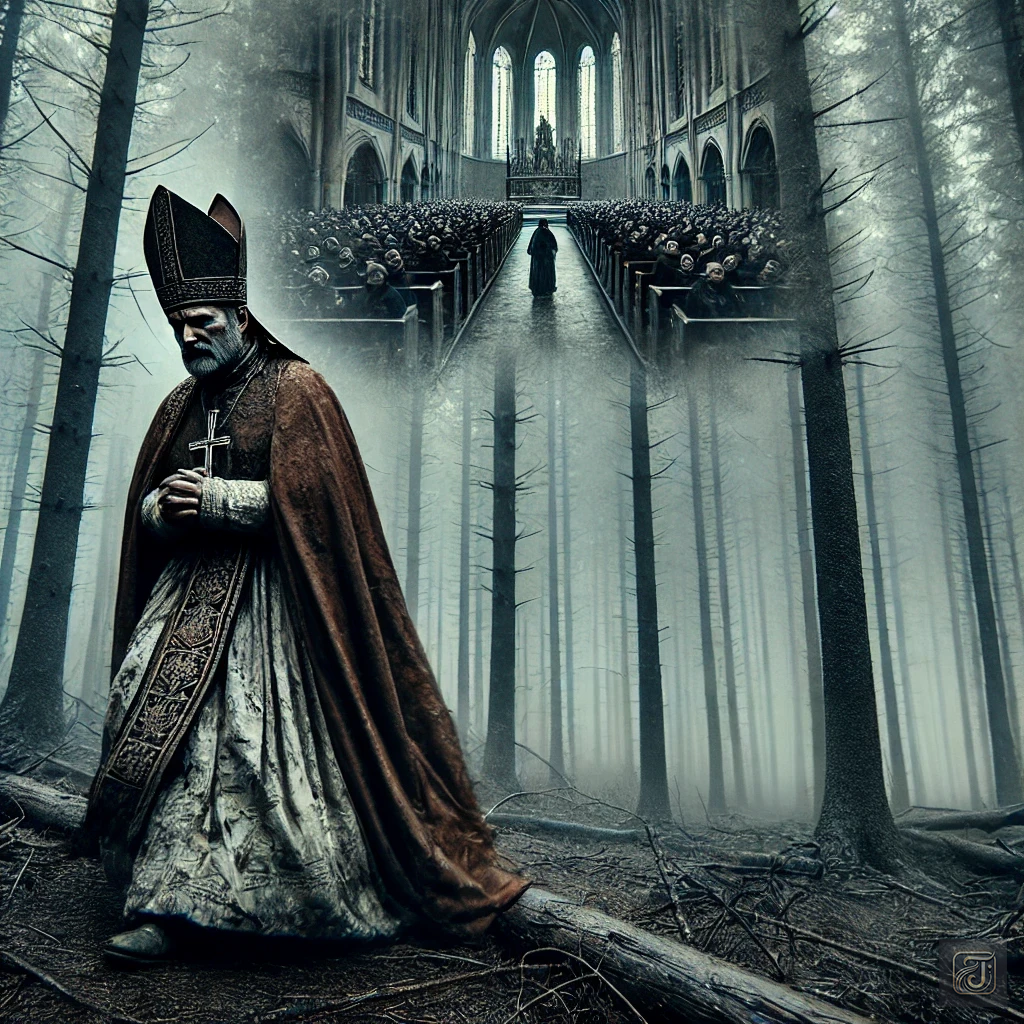
Bishop:
“No one will accept me…”
“Not even those who once followed my words.”
“What I believed to be God’s will… to see it end like this…”
A Reunion with Abandoned Allies
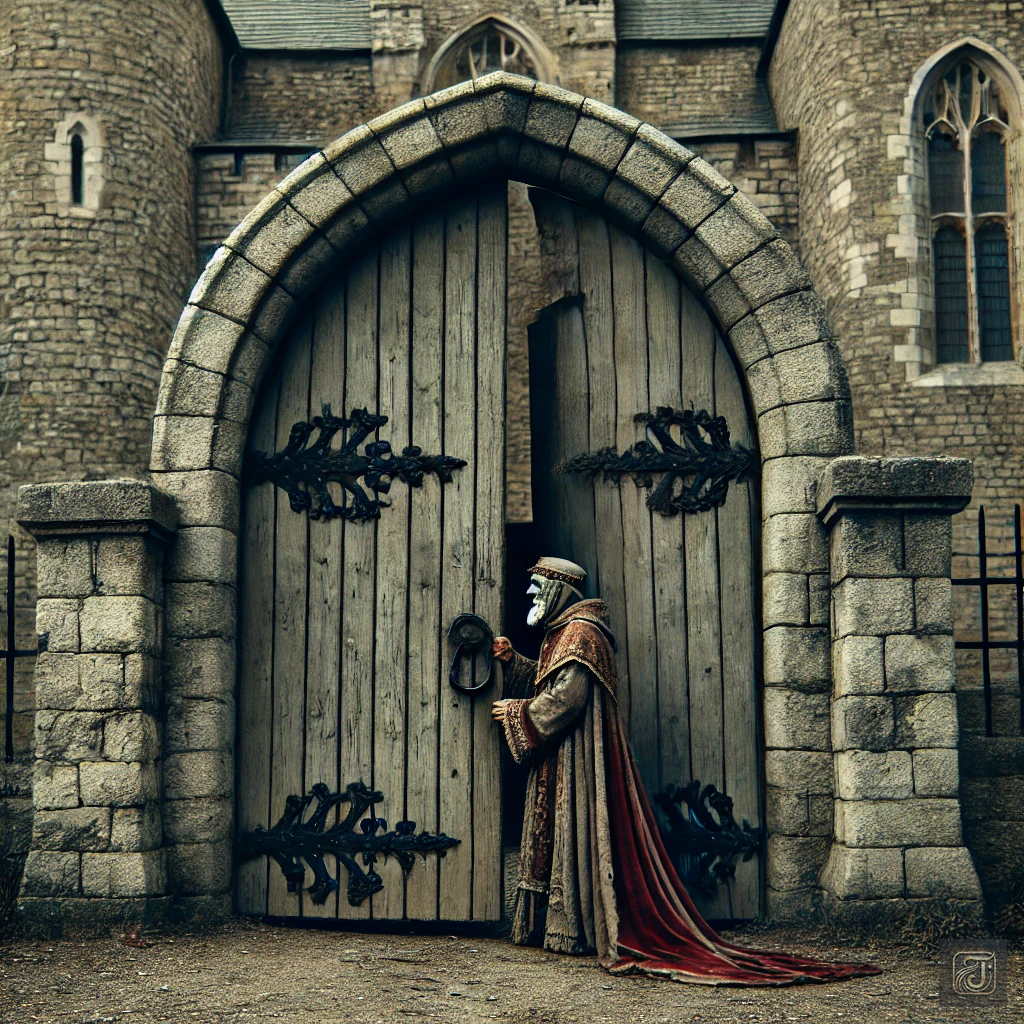
One day, the exhausted bishop sought refuge with a noble lord he had once corresponded with through letters.
He knocked on the gates of the castle, but the guard coldly informed him.
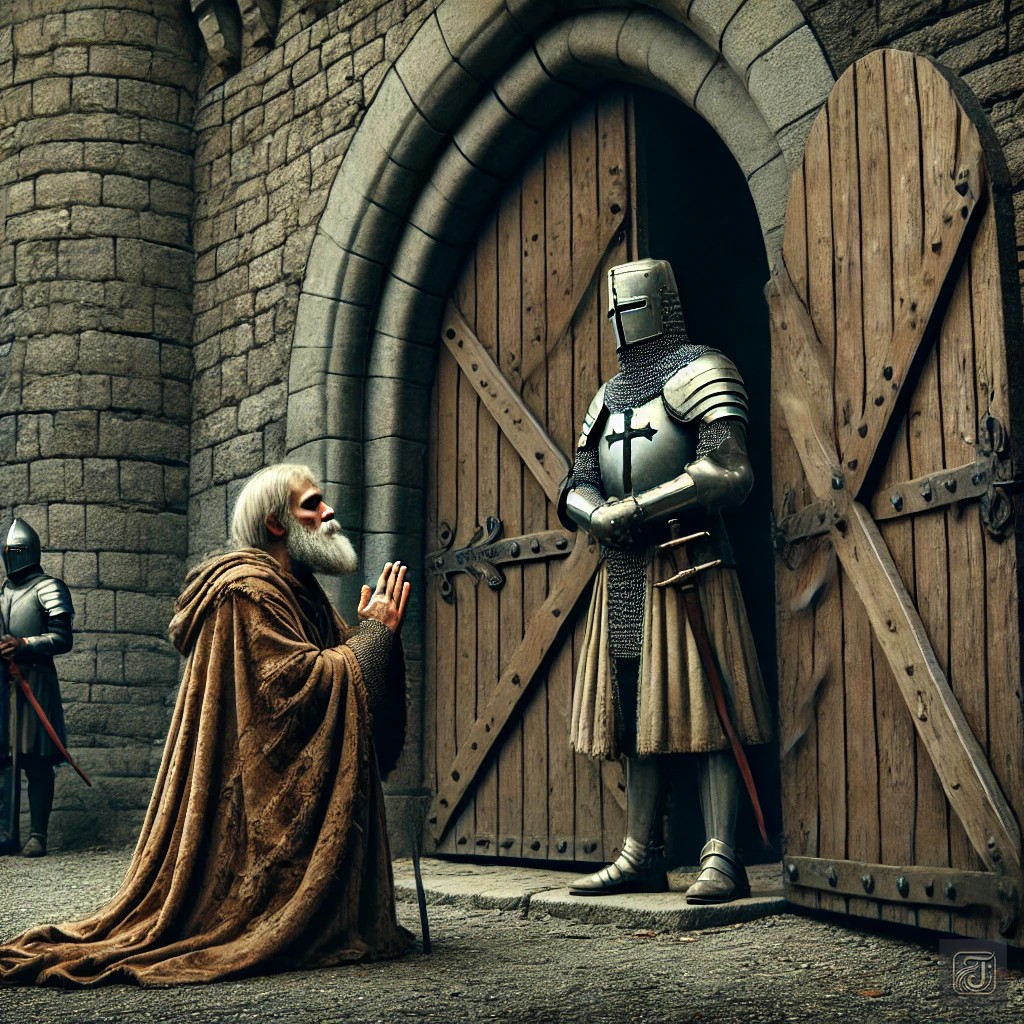
Gatekeeper:
“You are no longer a bishop.”
“You’re just a wanderer now.”
“There is no place for you here.”
Bishop:
“But I was allied with you!”
“Are you planning to abandon me?”
Gatekeeper:
“The Lord has spoken.”
“‘What benefit is there in working with someone like you now?'”
The sound of the gate closing echoed in the bishop’s ears.
Even those who once shared in his profits had now abandoned and cast him aside.
Regret and Despair in a Wasted Land
The bishop arrived at a ruined church, where he sank to his knees in solitude.
Cold raindrops dripped through the crumbling roof, sliding down his cheeks.
The floor was covered with moss, and the once-proud symbols of faith lay in decay.
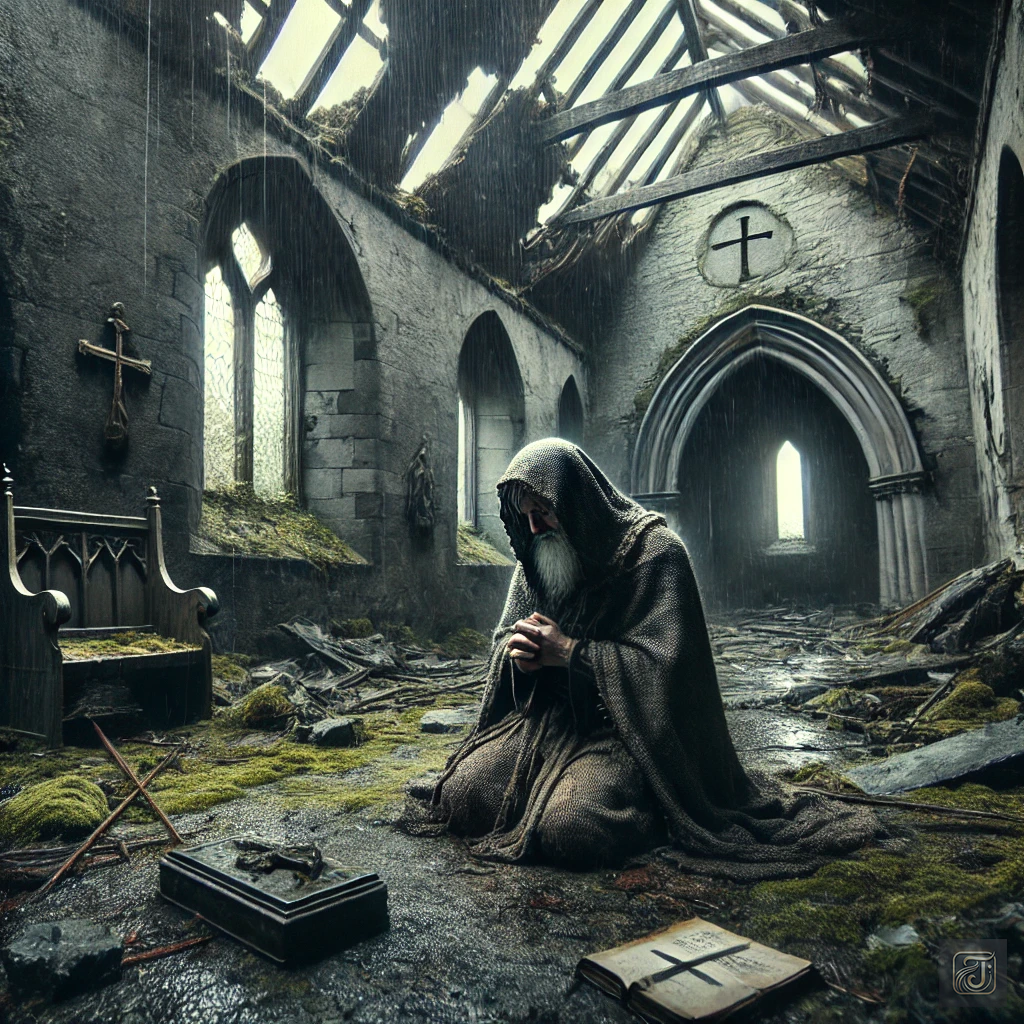
Bishop:
“What was the order I tried to protect…?”
“I was ruled by fear, burning the innocent.”
“Was I the one who was truly evil…?”
With trembling hands, the bishop clutched a crucifix, tears streaming from his eyes.
In his mind, the faces of those he had condemned—Adèle, Geneviève, Hélène, and Isabeau—appeared one after another, only to fade away.
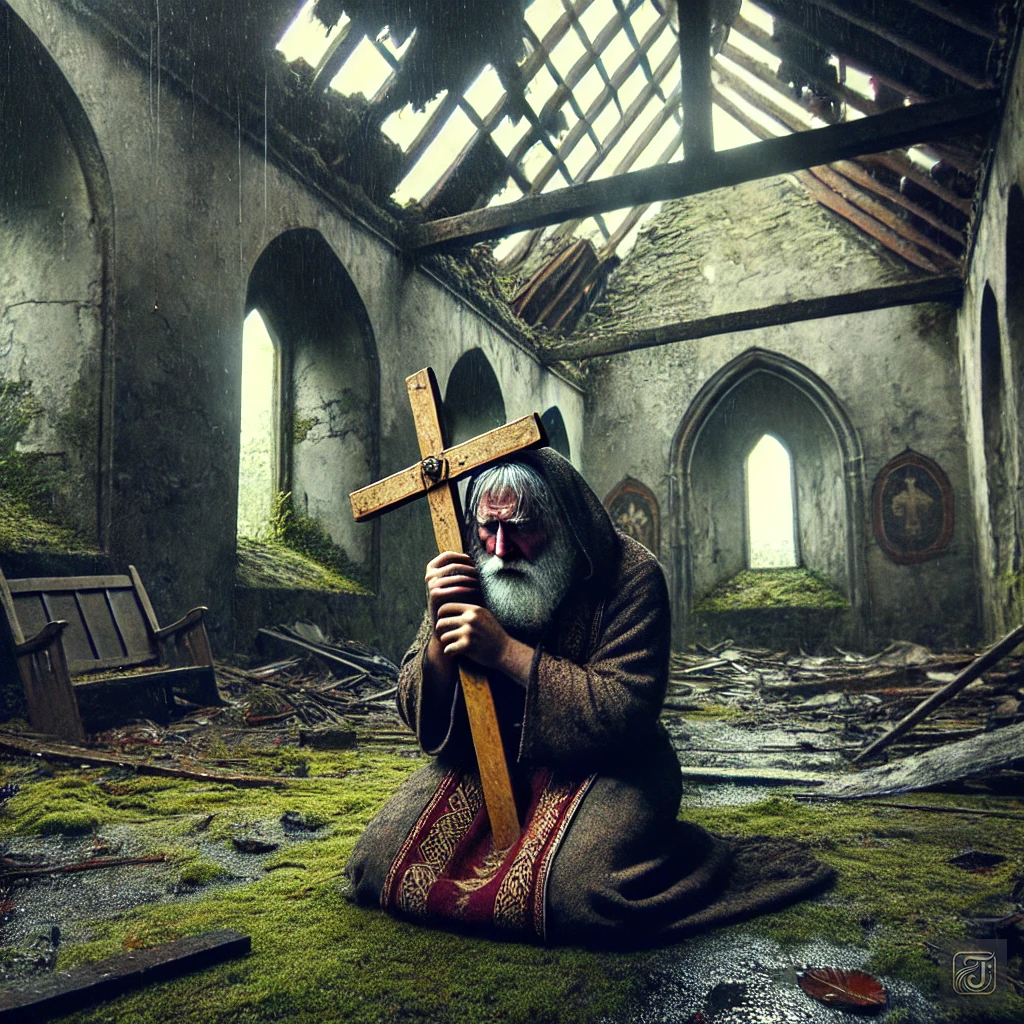
Bishop:
“They will never forgive me…”
“This loneliness and hunger must be my punishment…”
The Bishop’s Final Fate (Implied)
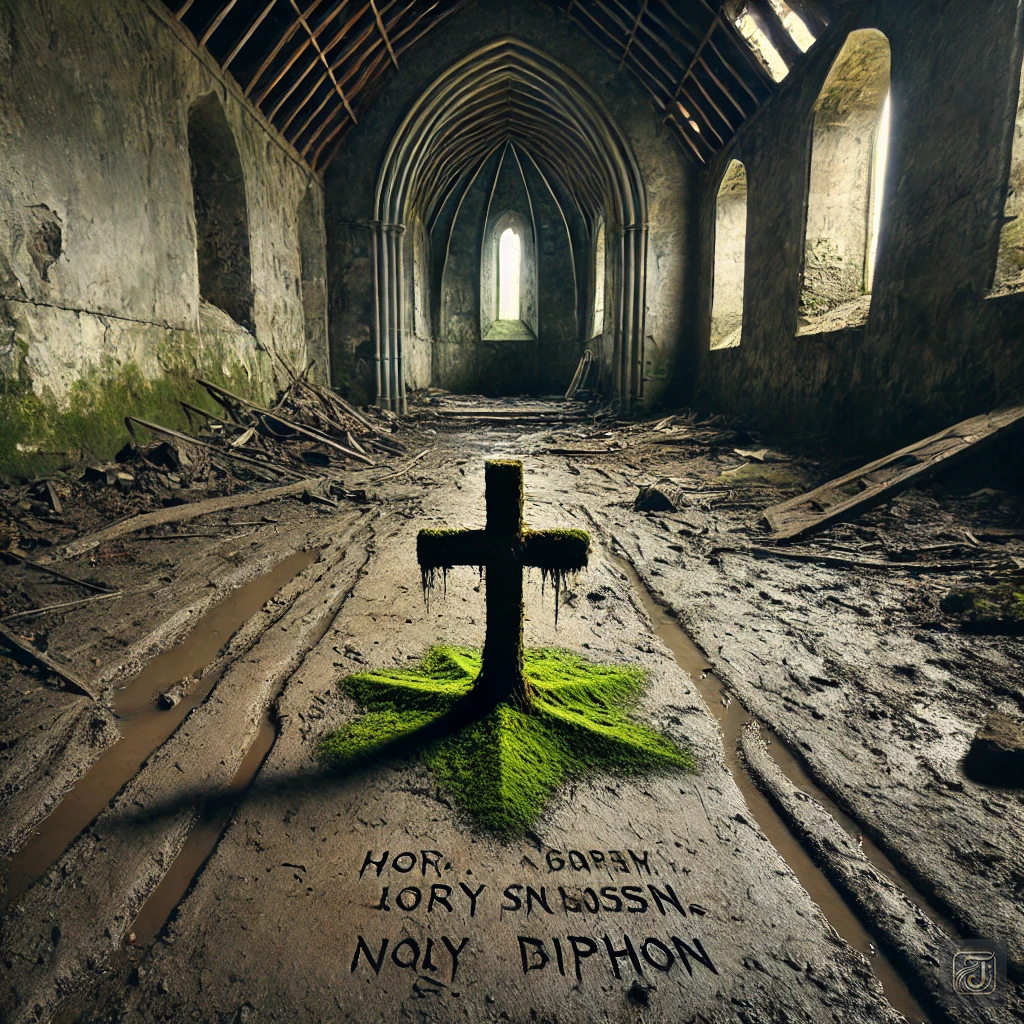
Several weeks later, no one had seen him again.
All that remained in the crumbling church was a mud-stained crucifix and faint, faded traces of a prayer.
Chapter 18: A Sermon to the Villagers
One day, the new priest gathered the villagers in the church and began to speak calmly.
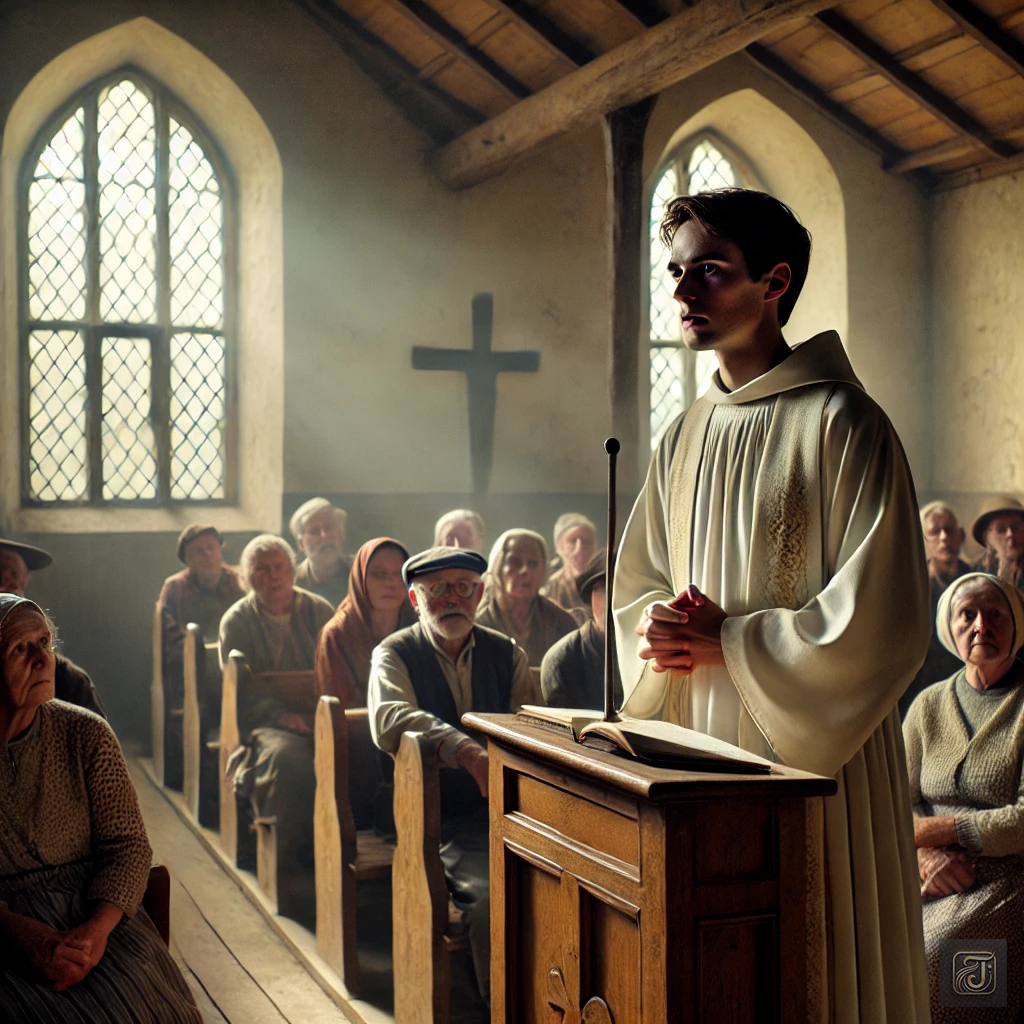
Young Priest:
“My friends, we must acknowledge the mistakes we have made.”
“Calamities and misfortunes are trials, not something to blame on others.”
The villagers began to murmur.
An elderly villager raised a question.
Villager 1:
“Many witches were executed in the past.”
“Yet, the calamities never stopped.”
“What does that mean?”
New Priest:
“The cause of the calamities is not the devil but your own ignorance, fear, and weakness of heart.”
“Driven by fear, you executed innocent people.”
“It all stems from the weakness in your hearts.”
The new priest spoke quietly.
The Discovery of Isabeau’s Notebook

One day, a village boy discovered a dust-covered notebook in the ruins of Isabeau’s home.
Inside, it detailed her research and efforts to develop remedies to save the village.
The boy brought the notebook to the young priest.
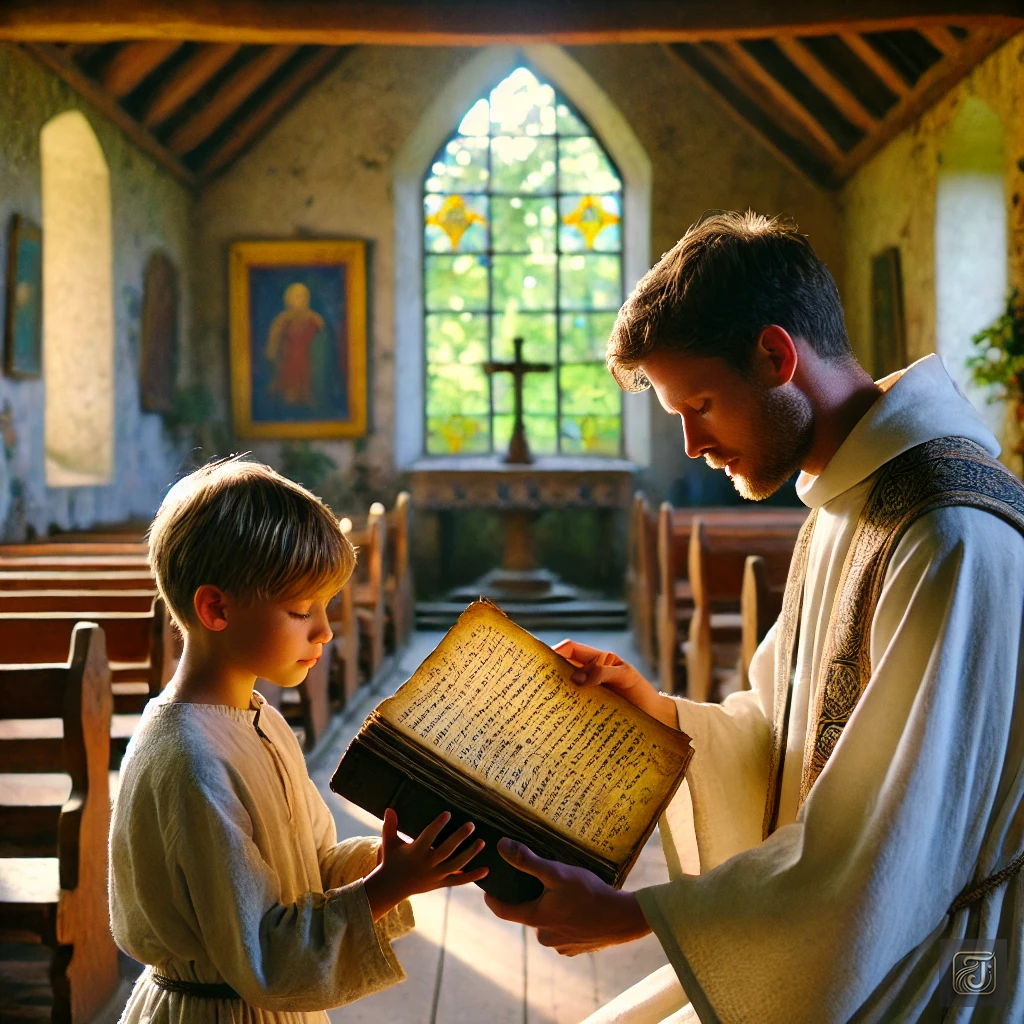
Boy:
“This belongs to Isabeau.”
“I found it in her house.”
Inside, it contained the names of herbs, methods of treatment, and heartfelt words reflecting her earnest desire to help people.

Isabeau’s note:
“Mother, I am doing my best to find a remedy to cure the fear spreading through this village.Because the village is now controlled by the disease of fear.”
“But actually, the people here are truly kind at heart—they are just unable to resist the fear of becoming targets themselves.”
“At least, I believe so.”
“That is why I will find a cure and save this village.”
“So that everyone in the village mother loved so much and could smile and laugh together once again.”
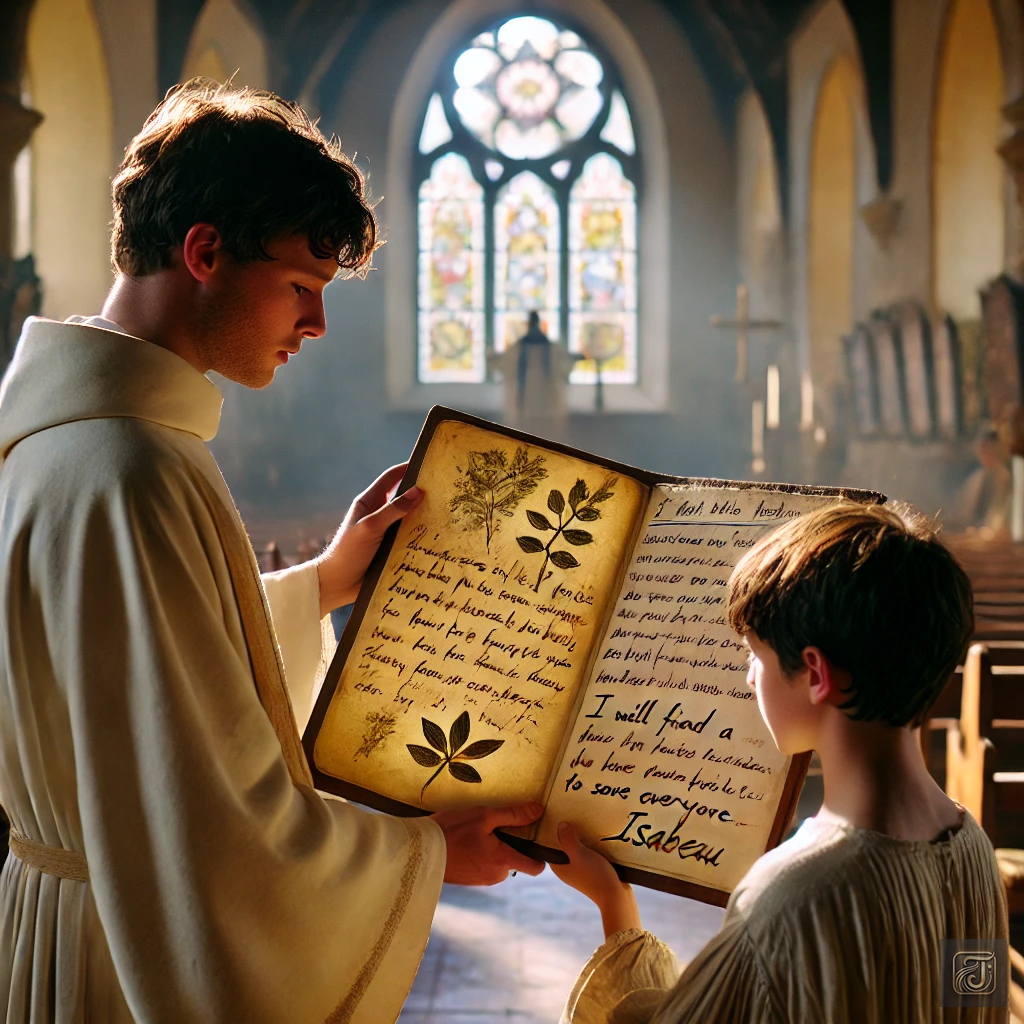
Boy:
“Isabeau truly wanted to save everyone in the village.”
“She wasn’t a witch, was she?”
The priest read through the notebook and let out a deep sigh.
Young Priest:
“Yes, she was trying to save this village.”
“Her knowledge and determination were simply overshadowed by fear.”
Boy:
“What can we do for Isabeau and the others who have passed away?”
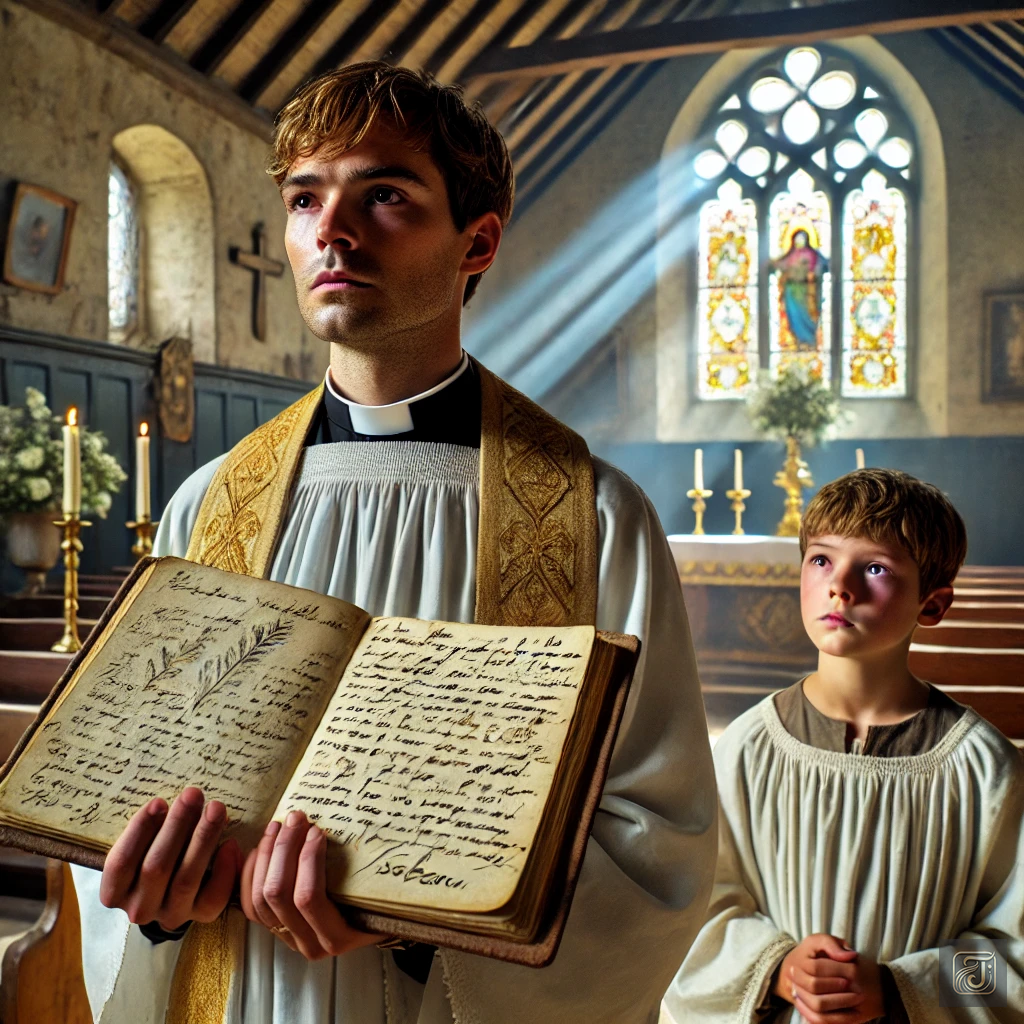
New Priest:
“To acknowledge our mistakes, honor their memory, and ensure their stories are passed down to future generations.”
“And to never allow such a tragedy to happen again.”
“For that, we must begin by paying tribute to those who were sacrificed.”
“Then, let us learn the proper knowledge of herbal medicine that Isabeau left behind.”
“We must not let her legacy go to waste.”
“That is how we can atone for what we have done.”
Chapter 17: Condolence for the Executed
After the bishop was exiled and his crimes were exposed, the villagers built a grave to honor those who had fallen victim.
Before the stone monument engraved with the names Adèle, Geneviève, Hélène, and Isabeau, the people wept and laid flowers in tribute.
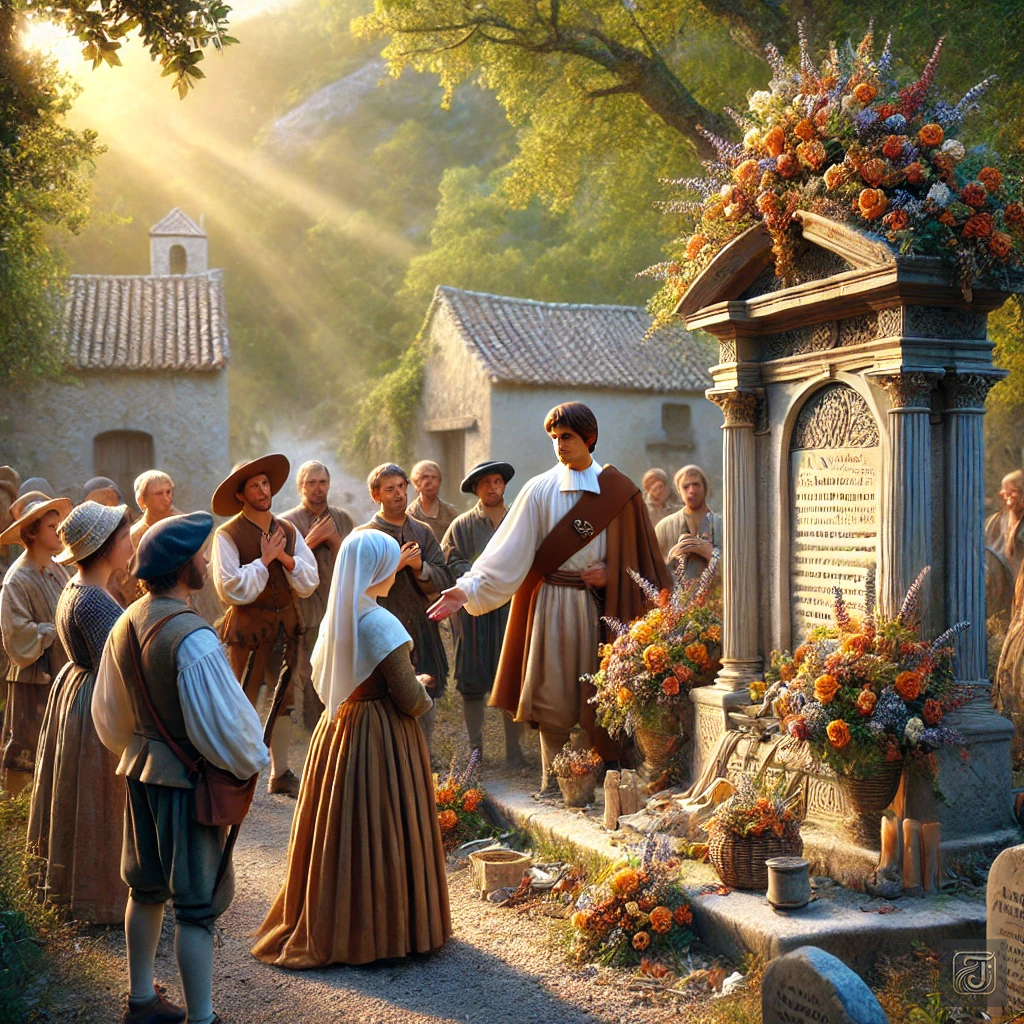
Villager 1:
“We made a terrible mistake…”
“I will never forget that we failed to believe in them.”
Villager 2:
“We succumbed to fear and burned the innocent.”
“The weight of that sin will surely remain in our hearts forever.”
New Priest:
“From now on, we will protect our village with justice and knowledge, not fear.”
“Your sacrifices will never be in vain.”
Among the villagers, a sense of calm was gradually beginning to return.
Chapter 18: The Village’s Rebirth and a New Future
After mourning all those who had fallen, the villagers resolved not to merely dwell in regret but to take a new step forward.
Isabeau’s notebook continued to convey her selfless thoughts and knowledge, even to this day.
The Village’s Rebirth
The Villagers’ Learning and Efforts
In the church courtyard, a young priest was teaching the villagers about medicinal herbs.
In his hand, he held tightly to the notebook Isabeau had left behind.
The villagers gathered around, their expressions serious as they took notes or carefully examined the herbs in their hands.
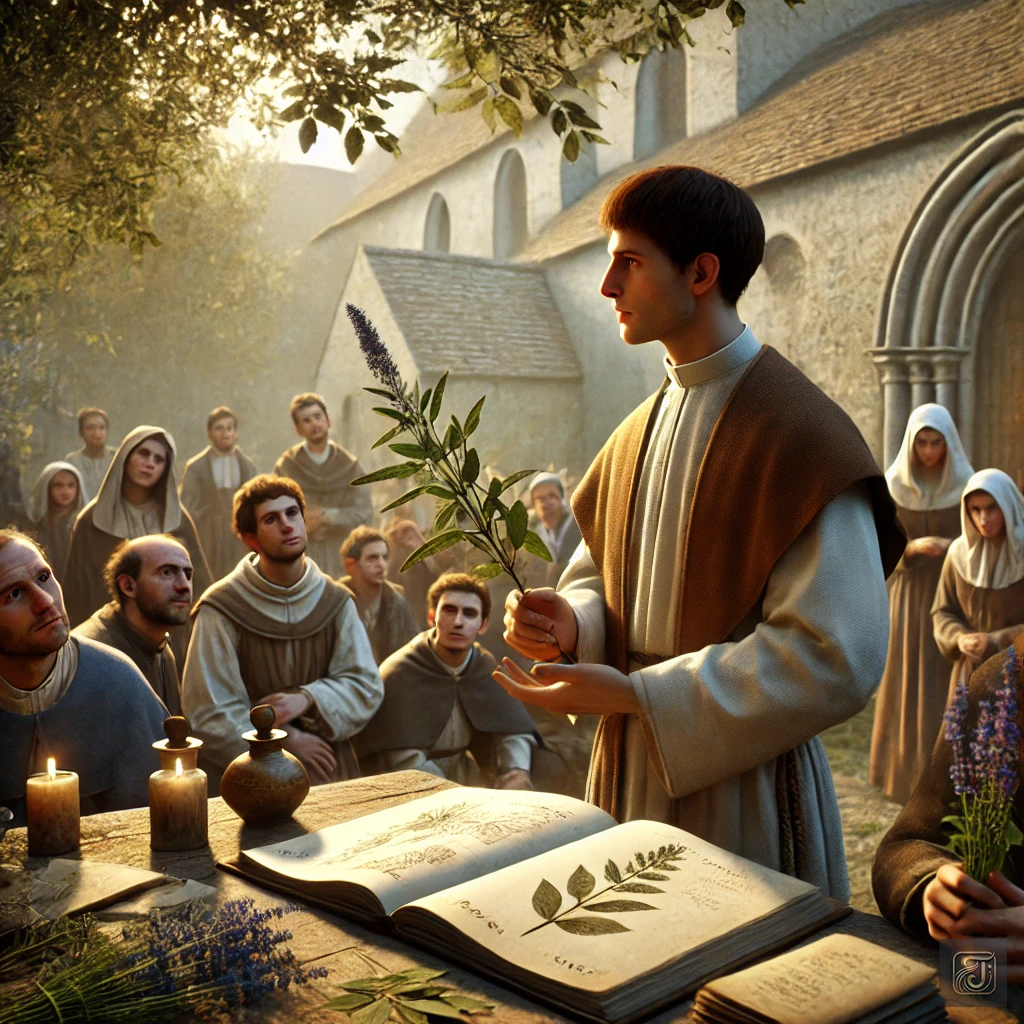
Young Priest:
“This is an herb called sage.”
“It has properties that help with sore throats and fevers.”
“Dry it and brew it in hot water to drink for the best results.”
Villager 1:
“So, I just need to brew these leaves…”
“Something so simple, and yet I never knew about it until now.”
Young Priest:
“This is the knowledge Isabeau left behind.””She stood firm against fear and sought to save the village through the right means.”
Villager 2:
“It’s too late now, but by inheriting her knowledge, I feel like we can atone for our sins.”
Villager 3:
“From now on, instead of doubting someone when an illness spreads, we should address it with proper knowledge.”
The young priest nodded and distributed the medicinal herbs he held to the villagers.
The villagers vowed to try them in their own homes and use them for the sick and the children.
Chapter 19: The Villagers’ Reconciliation and the Restoration of Trust
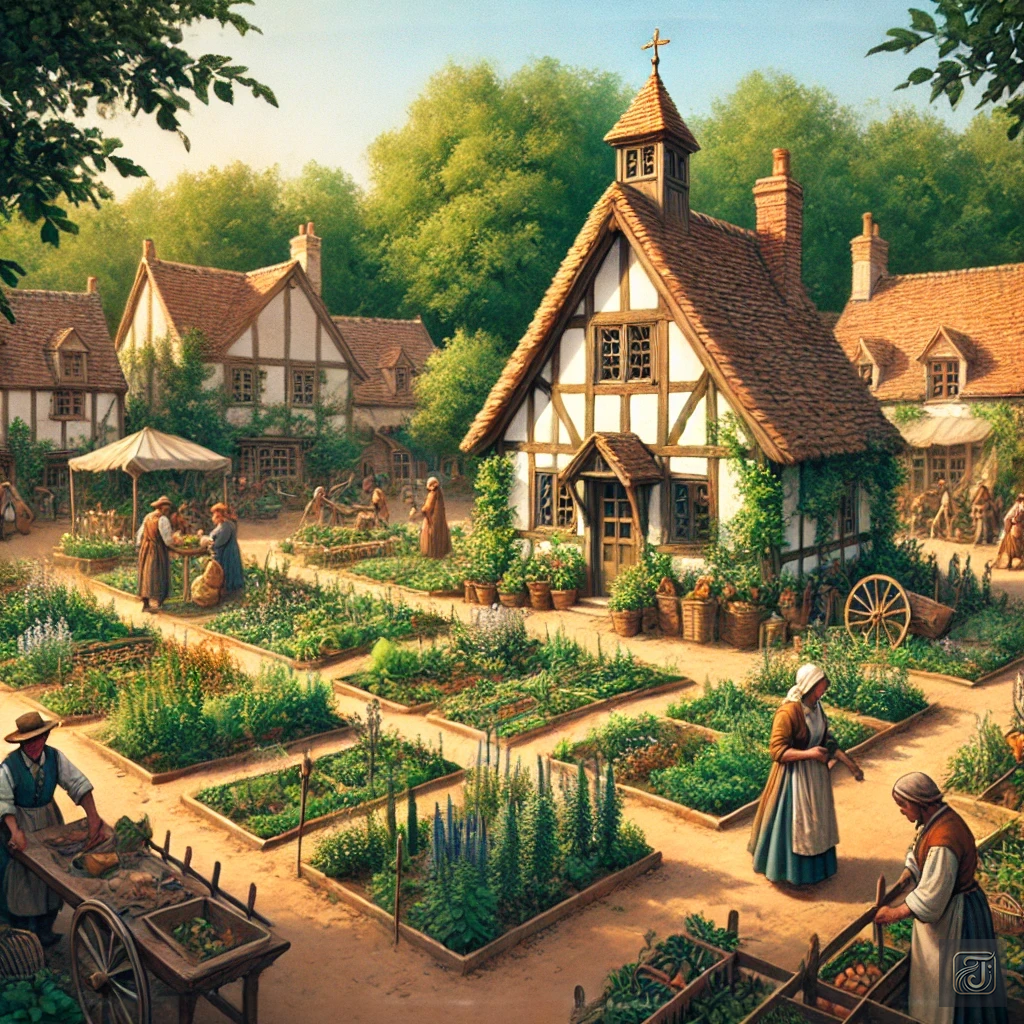
The Beginning of Collaboration
In the village square, the place where witch trial verdicts were once pronounced now stood quietly.
But now, in its place, there was a newly built “Herb Cottage.
“Using Isabeau’s notebook as a guide, the villagers continued to study medicinal herbs, gathering together to work as one in rebuilding their village.
The Restoration of Villagers’ Conflicts
In the village’s herb field, the villagers who once doubted each other silently continued their work.

Thomas:
“…I’m sorry.”
“I shouldn’t have doubted you.”
Pierre:
“What are you saying?”
” I was the same.”
“Back then, fear drove us…”
“I couldn’t help but doubt someone.”

Thomas:
“Isabeau was right.”
“The doubts we had were born from the weakness in our own hearts.”
Pierre:
“But it’s different now.”
“We have work to do.”
“We must use the knowledge she left behind to save the village.”
Thomas:
“That’s right.”
“Let’s protect this village together.”
The two exchanged a firm handshake, feeling the warmth of each other’s palms.
At that moment, they realized that the misunderstandings of the past had finally been resolved.
A Dialogue Between a Former Accuser and the Victim’s Family
Renaud, who had accused Hélène, continued to work in the Herb Cottage, burdened by guilt.
One day, Hélène’s younger sister, Marie, appeared at the cottage.
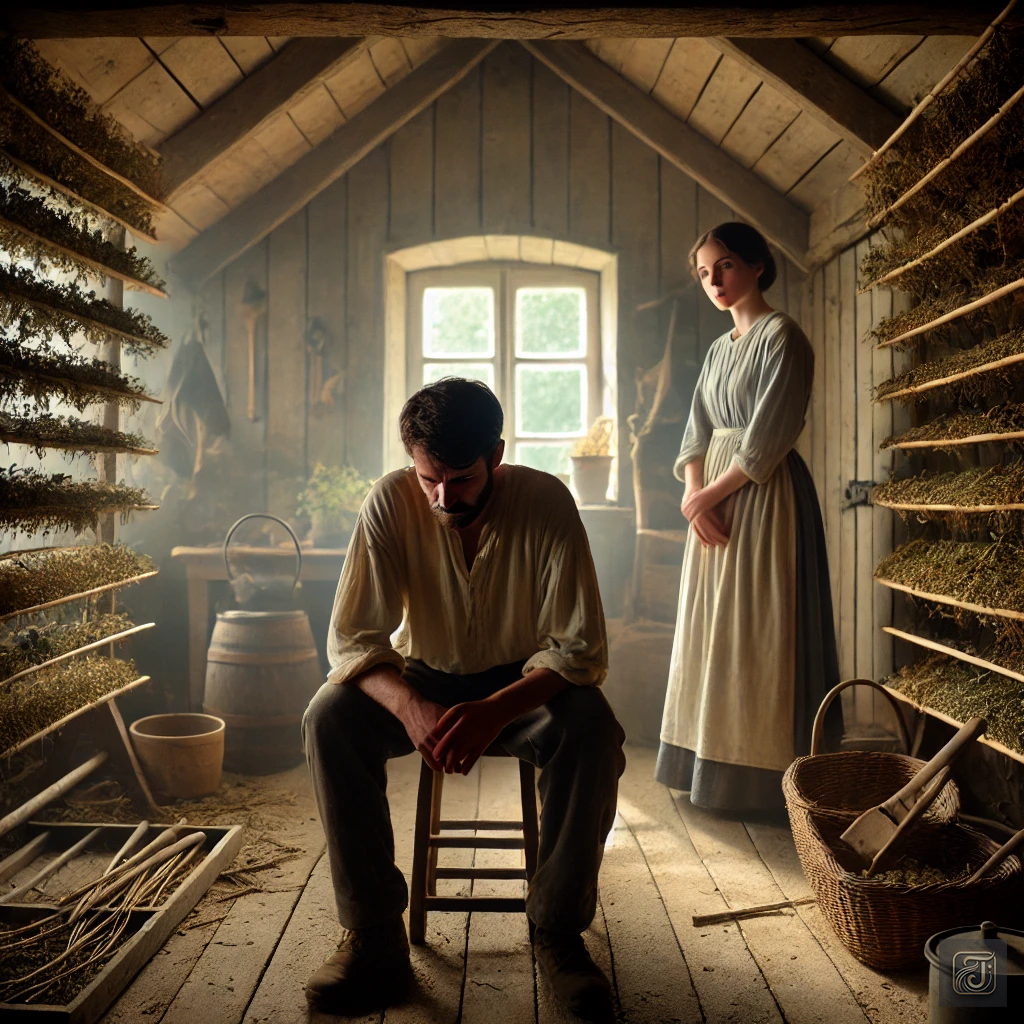
Marie:
“…You’re the one who killed my sister…”
Renaud:
“Yes.”
“Because of me, your sister…”
“I had debts I just couldn’t repay…”
“But to sacrifice her for such a reason…”
Marie:
“…My sister told me one thing before the end.”
“‘Do not hold hatred in your heart,’ she said.”
Renaud:
“…”

Marie:
“I want to hate you, but I understand why you’re here.”
“You’re trying to atone, aren’t you?”
Renaud:
“Yes.”
“I don’t want anyone else to be sacrificed.”
“I want to use these hands to help save this village, even if just a little.”
“Because that’s the only way I can atone for what I did to your sister…”
Marie:
“My sister would forgive you, I’m sure of it.”
“So… this time, save someone with your strength in her place.”
Renaud:
“Thank you…”
“Thank you, Marie…”
From that day on, Renaud devoted himself even more passionately to his work at the Herb Cottage, gradually regaining the trust of the villagers.
The Villagers’ Cooperation and Revival
In the herb field, people of all ages, from the young to the elderly, worked together to cultivate medicinal herbs and produce the remedies needed by the village.
One day, a villager who had once doubted Adèle placed flowers on her grave.
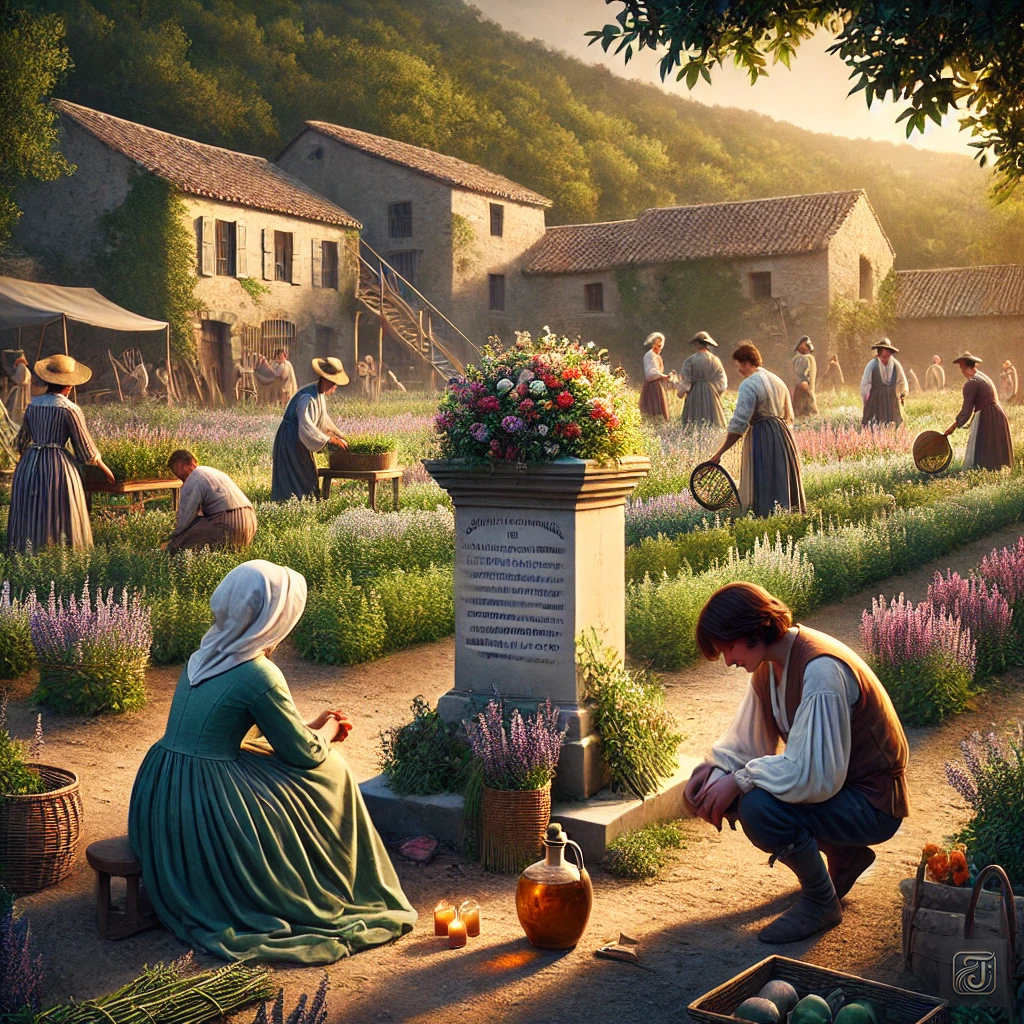
Villager 3:
“Adèle, you were right all along.”
“What we needed wasn’t land, but the heart to trust one another.”
Another villager sat down beside him and murmured.
Villager 4:
“We will never repeat our mistakes again.”
“We will never let your deaths be in vain.”
From the herb field, the sound of villagers laughing and helping each other as they worked could be heard.
Villager 5:
“Now, no one will have to suffer from illness anymore.”
Villager 6:
“Yes. Isabeau’s knowledge is still saving us even now.”
The Final Sermon of the Young Priest
Years later, a gathering was held at the village church to celebrate its rebirth.
The villagers gathered with smiles on their faces, quietly listening to the words of the young priest.
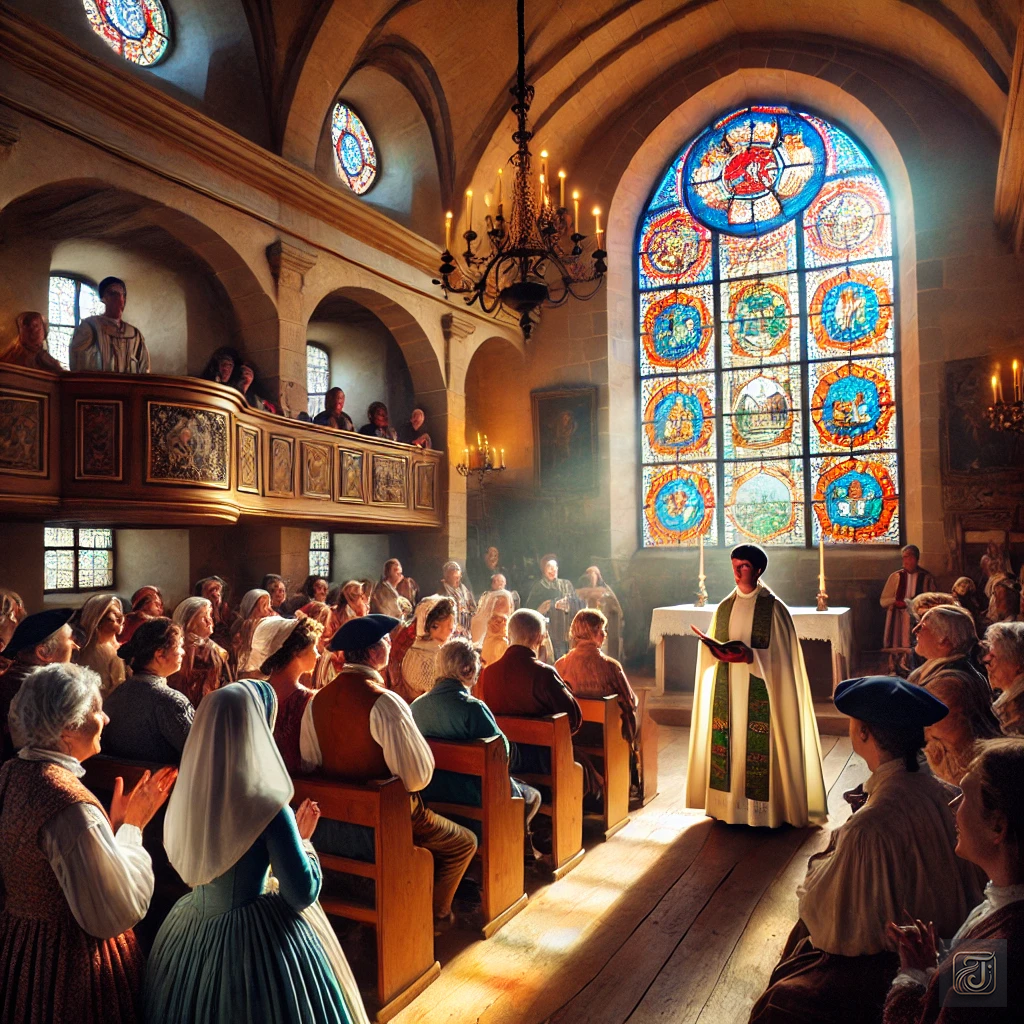
Young Priest:
“We must never forget the past when we succumbed to fear and sacrificed innocent lives.”
“However, we have learned, gained knowledge, and acquired the strength to avoid repeating those mistakes.”
“To ensure that the sacrifices of those who suffered are not in vain, let us continue walking together with love and trust.”
The villagers nodded deeply, and applause spread through the gathering.
The sound echoed like the chime of a bell, celebrating the village’s rebirth and reconciliation.
Final Chapter: A New Future
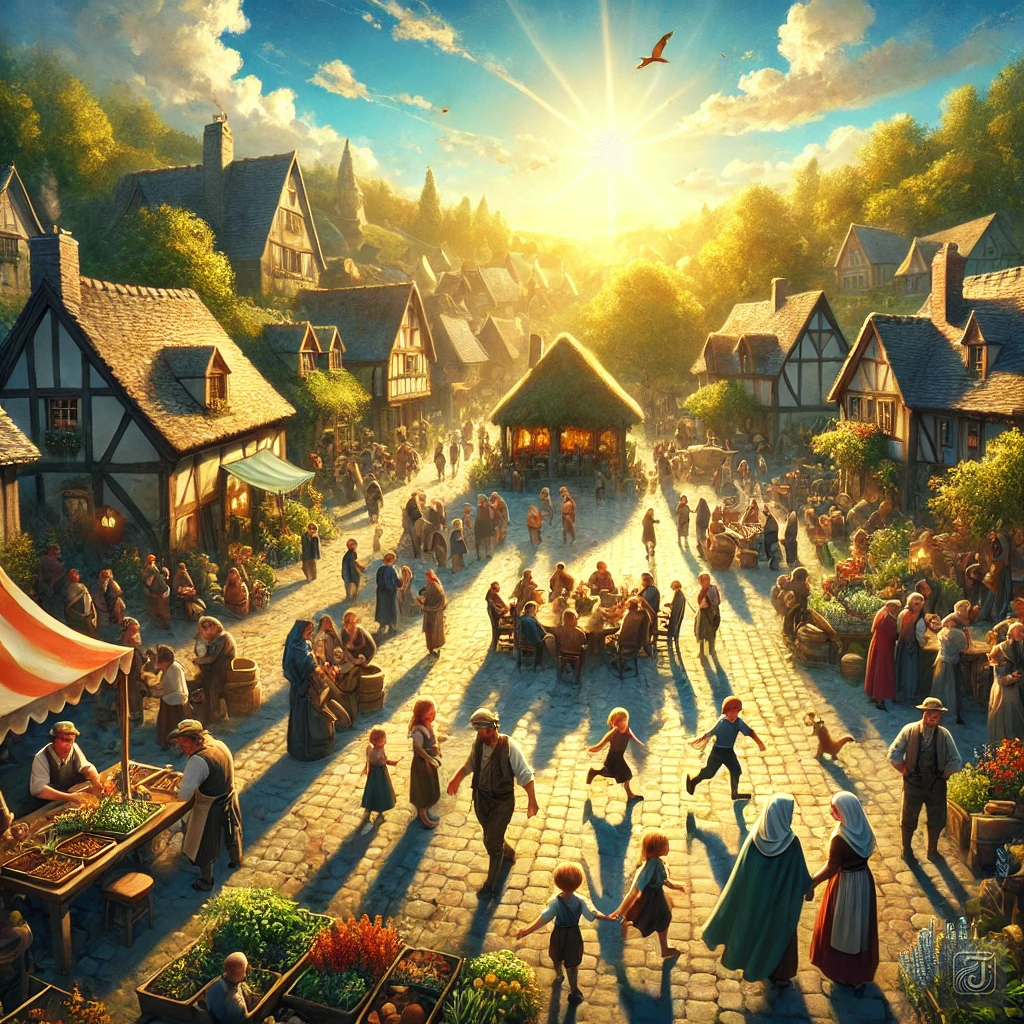
The village sky was clear, and the once-dark atmosphere had completely vanished.
The villagers trusted and supported one another, leading peaceful lives.
In the village square, the laughter of children echoed, erasing any trace of the fear and anxiety that once dominated.
The villagers had built a new community based on mutual trust and support.
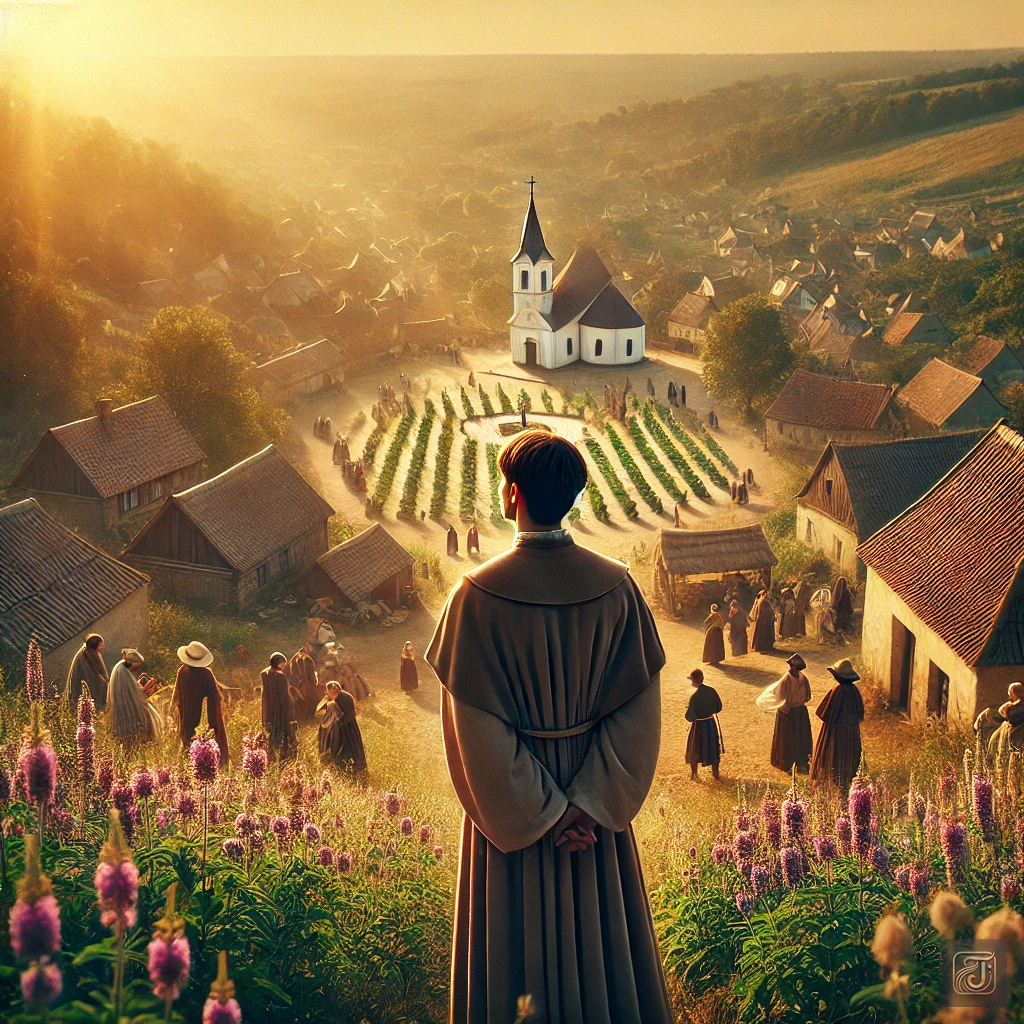
Young Priest:
“Fear divided this village and took the lives of the innocent.”
“But knowledge and trust have brought this village together once more.”
“This is the future we promised to them.”

Young Priest:
“Ms. Isabeau, please rest assured.”
“From now on, I will lead everyone in the right direction.”
In a corner of the church, Isabeau’s notebook was carefully displayed.
Within it, her words were inscribed.

“Do not succumb to fear, believe in the truth, and continue to move forward.”
― Isabeau Cheyné

“History will continue to ask us—do we have the courage to face the truth without succumbing to fear?”
Epilogue: The Final Question of Author Fuji

This story is a work of fiction created by me, Fuji, based on the real-life figure Isabeau Cheyné and the historical facts of witch hunts.
The theme is “Truth and Lies.”However, the sites and locations related to witch hunts still remain in various parts of the world today.
These places are preserved as historical landmarks and memorials to reflect on the history of witch hunts.
“Throughout history, countless innocent people have faced persecution and massacre.”
“The prejudice born of fear and ignorance transcends time and continues to repeat even today.”
“How should we confront it?”
“Perhaps Isabeau Cheyné offers us the answer.”
If you’re interested in Isabeau Cheyné, I recommend this book:
Read it on Amazon
If you found this article helpful or enjoyable, please consider supporting me with a cup of coffee!👈Click☕🙏
I’m a passionate blogger who loves diving deep into human history and sharing captivating stories about remarkable figures and events from the past.
My blog combines engaging storytelling with beautiful illustrations, making history accessible and enjoyable for everyone.
Currently, I write my blog while managing a full-time job.
Balancing both limits the time I can dedicate to research, writing, and illustrations.
With your support on Ko-fi, I can reduce the time spent on my main job and focus more on blogging, allowing me to increase the frequency of updates and bring you even more captivating stories.
Whether it’s a one-time coffee or a regular contribution, every bit goes directly into making history engaging and fun for my readers.
Thank you for joining me on this journey through time. Let’s uncover the past together!
If you found this article insightful, please consider supporting me ona cup of coffee!👈Click☕🙏
Author: Fuji
Human history is truly complex, isn’t it?
There are countless websites introducing historical figures and events, but many of them are just plain explanations—not exactly exciting to read.
On the other hand, reading books takes a lot of time and effort.
That’s where I come in.
Through “stories that are more engaging than explanations and shorter than books,” I aim to bring the world’s history and humanity’s records to you in a more accessible and interesting way.
If my stories inspire you to love history a little more, I’d be absolutely thrilled!


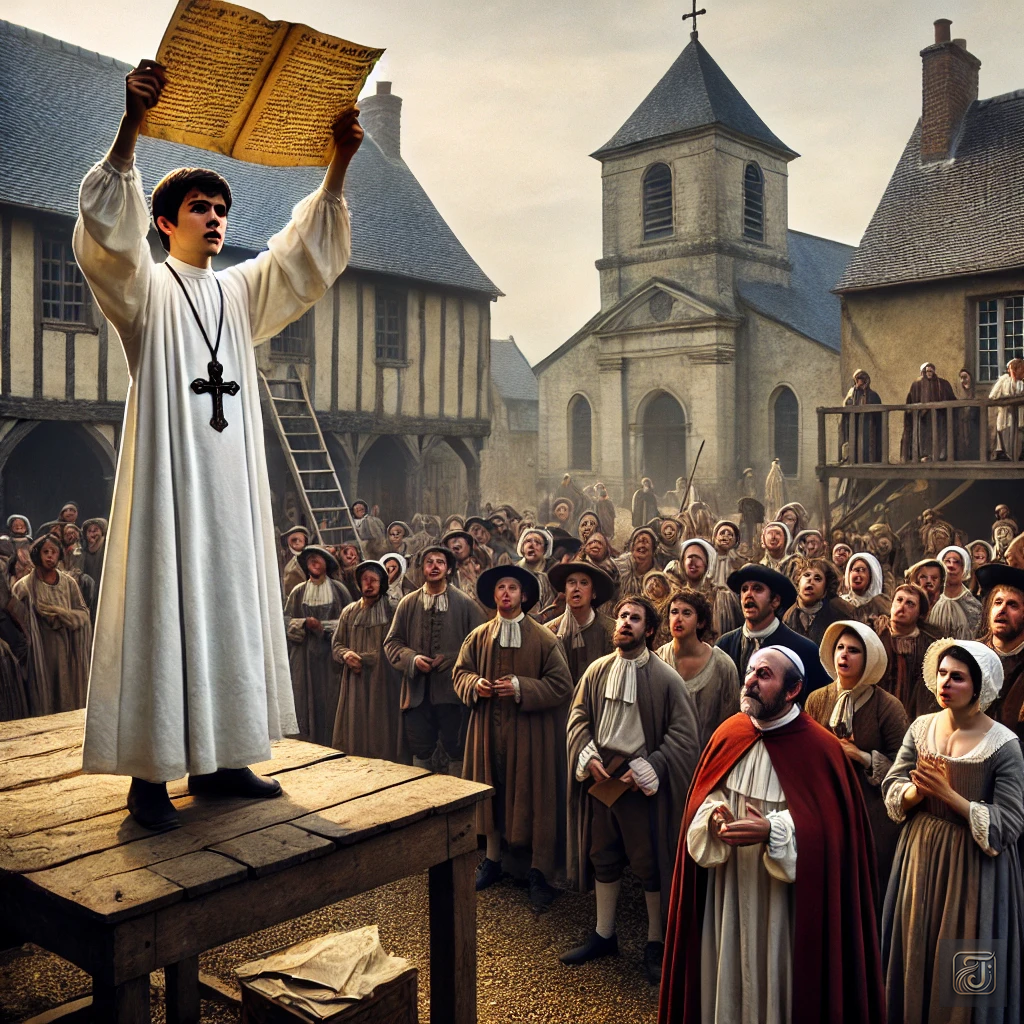


コメント